
The cover image was created by the transcriber and is placed in the public domain.
The Project Gutenberg EBook of The Wide World Magazine - Vol. 22, No. 131, February 1909, by Various This eBook is for the use of anyone anywhere in the United States and most other parts of the world at no cost and with almost no restrictions whatsoever. You may copy it, give it away or re-use it under the terms of the Project Gutenberg License included with this eBook or online at www.gutenberg.org. If you are not located in the United States, you'll have to check the laws of the country where you are located before using this ebook. Title: The Wide World Magazine - Vol. 22, No. 131, February 1909 Author: Various Release Date: January 28, 2016 [EBook #51061] Language: English Character set encoding: UTF-8 *** START OF THIS PROJECT GUTENBERG EBOOK WIDE WORLD MAGAZINE, FEBRUARY 1909 *** Produced by Victorian/Edwardian Pictorial Magazines, Jonathan Ingram, Wayne Hammond and the Online Distributed Proofreading Team at http://www.pgdp.net

The cover image was created by the transcriber and is placed in the public domain.
418

“WILLIAMS LASHED AT THE BIRD WITH HIS STICK.”
(SEE PAGE 424.)
419
Vol. XXII. FEBRUARY, 1909. No. 131.

Another instalment of a fascinating budget of adventure narratives. This month we publish accounts of a fight to the death between a whale and a school of thresher sharks; a nest-robber’s terrible battle with an infuriated mother-eagle; and the nerve-trying experience which befell a Surrey cyclist while out for a Saturday afternoon spin.

Early on the morning of August 14th last, while engaged in building new quarters for the lighthouse-keeper at Breaksea Island, near Rottnest, Western Australia, the contractor and his men noticed a bull whale, with a cow and calf, passing the island some distance off. They watched them with interest for awhile, noting the immense size of the two parents and the methodical regularity with which columns of water rose from their blowholes, and then resumed their labours.
An hour or so later—about nine o’clock, to be exact—the men were startled by an extraordinary noise, apparently coming from the eastern end of the island, a noise unlike anything they had ever heard before. Dropping their tools and staring towards the east, they beheld such a sight as it falls to the lot of few people to witness. There, not five hundred yards from the shore, was being waged a battle to the death—a fight between the great cow whale previously seen and a school of thresher sharks. The calf was swimming about distractedly, but the old bull had disappeared, having basely deserted his family at the first approach of danger.
The sharks, as though acting in accordance with some preconcerted plan, had completely surrounded the two whales, and, apparently realizing that nothing was to be feared from the calf, concentrated all their efforts upon the cow. Again and again they charged in upon her, their jaws snapping, tearing at her mighty sides until the sea was red with blood. Meanwhile the cow lashed her tail furiously, hurling up sheets of reddened water and occasionally crashing down with terrific force upon one of her voracious opponents. Maddened with pain and rage, she dashed this way and that, but the sharks hung to her side with a persistency and ferocity that made the fascinated onlookers shudder. Now and again the wildly-lashing tail would catch one of the assailants, driving it beneath the waves—no doubt killed or disabled—but the remainder rushed in undismayed, tearing viciously at the mammal’s bleeding flanks or butting her with the force of battering-rams.
Presently the spellbound spectators realized two facts—firstly, that the calf had disappeared in the mêlée, and secondly, that, the tortured whale was undoubtedly becoming weaker. It was obvious that the unequal struggle could 420 421 422 have only one ending. Still, however, she fought on doggedly, winning admiration and sympathy by her exhibition of hopeless courage. Altering her tactics, by a supreme effort she hurled her whole great bulk clear of the water for a moment, and the fascinated onlookers beheld the sharks hanging from various parts of her gleaming body by their serrated teeth. Then down she went again, with a crash like thunder, and for an instant whale and sharks were buried amidst masses of foam, heavily coloured with the poor mammal’s life-blood. Rising again, she essayed another change of plan, making for the rocks and desperately striving to rub off the clinging sharks against their edges. But the threshers were equal to the occasion; while those on the outside maintained their grip, the others dived under their enemy and charged her anew, tearing at the whale’s side in an ecstasy of ferocity that was bloodcurdling to witness.
TERRIFIC BATTLE AT BREAKSEA
ISLAND.
WHALE KILLED BY THRASHER
SHARKS.
A THREE HOURS’ FIGHT.
A SEA OF BLOOD.
(By An Eye Witness.)
Much has been written about fights between the larger denizens of the sea, but it has fallen to the lot of very few to witness such a battle as one which took place off Breaksea Island on Friday, the 14th inst., between a school of thrasher sharks and a cow
A CUTTING FROM THE “WEST AUSTRALIAN,” OF PERTH,
W.A., REFERRING TO THE BATTLE BETWEEN A WHALE
AND THRESHER SHARKS.
Click here for image.
More and more feeble grew the whale’s struggles, and at last—to the heartfelt relief of the spectators, for her death-fight had been terrible to behold—the great body turned over and sank beneath the red-tinted water. The unequal battle was over, having lasted from nine o’clock until noon—as awe-inspiring a contest as man was ever privileged to witness. It is a thousand pities that there was no camera on the island to make a pictorial record of the struggle. The men went back to their work greatly impressed by the unique spectacle, and expressions of sympathy for the whale were heard on every side.
Forty-eight hours afterwards the whale’s carcass, which had in the meantime become distended with gas, rose to the surface, and exploded with a roar like a miniature powder-magazine, causing the startled people to flock to the shore to discover what had happened. On examination of the remains it was discovered that every shred of the outer flesh of the whale had been torn off by the sharks, who had now, doubtless, gone off to repeat their tactics upon some other hapless leviathan.
Swinging like a pendulum at the end of a two-hundred-and-fifty-foot rope against the side of a five-hundred-foot cliff, with jagged rocks far below, and nothing but one bare hand with which to fight off the fierce onslaught of an immense eagle, whose nest he was attempting to rob—this was the awful predicament in which Arthur Williams, a young man of Riverton, Wyoming, found himself one day early in June last year. With the welfare of her nestlings at stake, the great bird attacked the despoiler of her home with inconceivable fury, and only to a lucky chance does Williams owe his life.
Riverton is a new town on that portion of the Cheyenne and Arapahoe Indian reservation which was opened to settlement last year, and in the country thereabouts mountain lions, timber wolves, coyotes, eagles, bears, etc., are still to be found. The principal industry is sheep-raising, and continual warfare exists between the flockmasters and the wild things, especially the eagles, which annually kill and carry off hundreds of young lambs. Because of this heavy drain on their flocks, every shepherd and owner of sheep in Wyoming takes great pains to kill the birds and to destroy their nests whenever they are discovered.
Before the Indian reservation was formally opened to the whites for settlement, the flockmasters were permitted to graze their sheep over the country, and it gradually became known among the sheepmen that over in Lost Well Canyon there were a pair of eagles who made a speciality of devouring young lambs. Try as they might, however, the shepherds were unable to get a shot at either of these great birds, and for several years they were the terrors of the district.
It was discovered that the old birds made their nest in a cleft in the face of a five hundred-foot perpendicular wall, which formed one side of the canyon. Here they safely raised brood 423 after brood of young ones, which were turned loose in due course to prey on the community.
Hunters, with their Winchester rifles, often lay in wait for the big birds, hoping to get a shot at them, but, with the proverbial keen eyesight of such creatures, the eagles detected the Nimrods and never came within gun-shot when the nest was being watched.
During the spring of 1908 the two old eagles were more successful than ever in raiding the flocks of the sheepmen, and accordingly a special effort was made to exterminate them. To that effort Arthur Williams owes the appalling adventure which befell him.
Williams and two friends made a trip out to Lost Well Canyon to investigate the chances of trapping the eagles in their nest. A ride of eight miles, over rough mountain trails, brought them to the canyon, half-way up the perpendicular side of which they saw the horizontal cleft in which the wise old birds had built their nest. At the foot of the cliff, directly under the cleft, was a pile of bones—the remains of lambs, thrown out of the nest by the eagles after they had been picked clean.
“We ain’t any nearer that nest down here than when we were at home,” remarked Williams to his comrades. “Nothing but a balloon or an airship can help us from down here. Let us go up to the top of the cliff and see what we can do from there.”
For two hours the three young men struggled to reach the top of the mountains. A wide détour was necessary, but at last this was accomplished and they stood on the brink of the cliff, half-way down which the eagles’ nest had been built.
“There’s nothing to be done from here, either,” said one of the men, despondently. “We might just as well go back home; we shall never reach that nest.”
While the men stood and talked, from far down below them there arose the shrill piping call of young birds.
“Young ones!” said Williams. “I wish we could get them alive; they would be worth money to us.”
“No use to bother; you’ll have to take it out in wishing,” said the third member of the party. “Come on; let’s go home.”
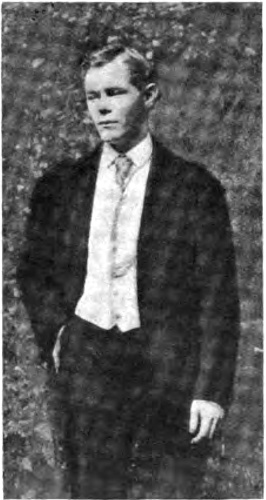
MR. A. E. WILLIAMS, WHO FOUGHT THE EAGLE
IN MID-AIR.
From a Photograph.
“All right. I’ll go home now, but I’m coming back to-morrow after those birds,” said Williams.
The next day found the three young men back at the cliff. They had mapped out a scheme whereby they hoped to get the young birds, and had brought with them seven hundred and fifty feet of stout rope, far more than enough to reach from the top of the cliff down to the bottom of the canyon. To make quite sure of this, however, they first lowered the rope, weighted with a stone, down the face of the rock, and saw that, while there yet remained a big coil at their feet, the weighted end of the rope rested on the floor of the canyon.
Then the rope was hauled back and a tight loop made in one end. This was paid out over the edge of the cliff until it hung directly in front of the eagles’ nest. The other end of the rope was hitched round a convenient tree.
During all this time the men kept close watch for the old eagles, but saw nothing of them.
“Off hunting lambs, I suppose,” said one of the young fellows.
Then Williams stepped forward, laid hold of the rope, and quickly disappeared over the side, sliding slowly downward, using one leg, around which the line was wrapped, as a brake to keep himself from going too fast.
Across his shoulders was slung a stout bag, in which he intended placing the little eagles when he secured them. In one hand he carried a stout stick for use in an emergency: the other hand grasped the rope.
Down, down he went until just in front of the eyrie. Then he slipped one leg through the loop at the end of the cord and turned to look into the dark hole, where he could hear the eaglets “talking.”
Slowly he swung round, bracing his foot against the rocky wall, until he faced the cleft and could give his attention to the nest.
Suddenly, screaming wildly with rage and fright, out from the dark cleft came the old mother-bird. Like a stone from a catapult she flung herself at Williams’s face.
Dismayed by the suddenness of the attack, 424 Williams recoiled; his foot slipped from the wall, and his body spun round and out of reach as the huge bird went past him. He did not escape altogether scathless, for one claw, like a knife blade, cut across his cheek, and in an instant the blood was flowing from a cut half an inch deep.
Only a few yards did the old eagle fly; then she wheeled and, with the speed of an arrow, shot once more at the man hanging at the end of the rope before her nest.
This time Williams braced himself and, with his stout stick ready in his right hand, awaited the onslaught of the big bird. His left hand grasped the rope.
The eagle struck Williams on the head with her wing, and at the same moment Williams lashed at the bird with his stick. Such was the fury and strength of the creature, however, that the stick flew from Williams’s hand and went whirling through space to the bottom of the canyon, far below.
Again the eagle turned sharply and swooped down on the man, now left defenceless, with only a single bare hand to fight against the infuriated mother-bird’s sharp claws, powerful beak, and mighty wings.
Pecking, clawing, and striking stunning blows with her terrible wings, the big bird beat the air in front of Williams’s face, holding her position and tearing savagely at the head and face of the would be despoiler of her home. Her screams were incessant.
Meanwhile, on top of the cliff, there was utter consternation. The attention of one man was necessarily taken up with the rope, and a slip on his part meant instant death to Williams in the way of a fall to the rocks at the foot of the precipice. With a rifle in his hand the other man watched that nightmare fight in mid air, far below him. He could not shoot without endangering Williams even more than the eagle.
Just then things were going very badly with the nest-robber. Blood was flowing from a dozen cuts on his head and face, his hand was lacerated, the clothing about his shoulders was cut into ribbons. Moreover, he was half stunned, and but for the loop in the end of the rope would have fallen to his death. He had no time to give directions to his comrades, and simply had to fight the battle out alone.
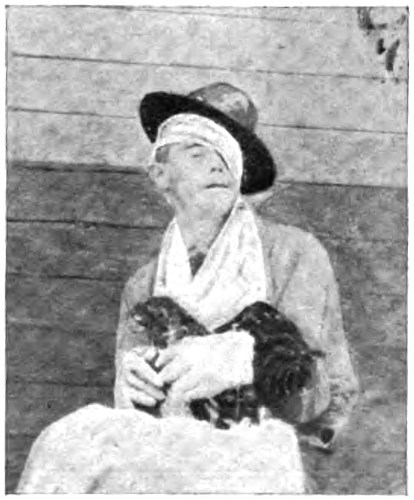
MR. WILLIAMS AFTER HIS ENCOUNTER WITH THE EAGLE.
From a Photograph.
Presently the old bird darted away, preparing for another swoop at the defenceless man. When she was ten feet distant a rifle-shot rang out from the top of the cliff, and Williams knew his friends were doing what they could. But the old bird did not falter for a second, although a couple of feathers from her terrible right wing floated away on the wind. In his haste to send a second bullet downward the man with the rifle managed to “jam” the weapon, and with a despairing cry threw the now useless weapon to the ground.
The eagle returned to the attack with even greater fury, and for a few minutes Williams thought his last moments had arrived. But still he fought on, pulling great handfuls of feathers from the bird and beating at her desperately with his bare fist, receiving in return many cuts and slashes, as well as stunning blows from the madly-flapping wings. He was almost ready to loose his hold on the rope and go crashing down to the bottom of the canyon when the eagle suddenly wheeled away for another attack.
As she came back again, screaming and beating the air, something the size of Williams’s head struck her on the back, and down she went like a stone, whirling over and over. Williams’s friend above had hurled a small rock at the bird, and, luckily for Williams, the boulder had struck her fairly on the back, between the immense wings.
“Hold on tight and we’ll let you down to the bottom,” sang out the man at the top of the cliff, leaning far over. Then Williams showed the sterling stuff of which he was made. Though bleeding from a dozen wounds, breathless and exhausted, he was still determined to fulfil his errand.
“Hold me here until I get these little birds,” he shouted, feebly. “I came after them, and I’m going to have them.”
With that the plucky fellow crawled back into the niche, put the two little eaglets in his bag, thrust his leg through the loop, grasped the rope with both hands, and was safely lowered to the floor of the canyon.
Within a few feet of where he landed lay the old mother-eagle. Williams staggered over to 425 her and gave her a kick. To his amazement she moved, stood up on her feet, and flew away!
One of Williams’s companions came sliding down the rope, and reached him just as the injured man fainted from loss of blood and excitement. The punishment he had received was terrible, but fortunately his eyes had escaped injury.
After casting off the rope the third man made his way down the mountain to where Williams and his friend were. They managed to stop the flow of blood, and between them got the wounded man on his horse and brought him to Riverton. Williams spent several days in bed and was covered with bandages for two weeks, but received no lasting injuries.
As souvenirs of his terrible fight, he has two little eagles and a dozen or more big scars to show his friends.
It was a delightful September afternoon some six years back—the close of a week during which there had been much discussion in the newspapers concerning a great balloon race versus cyclists, to be fought out on this identical Saturday. The late Rev. G. M. Bacon, of Newbury, the “ballooning parson,” and Mr. Percival Spencer, the well-known aeronaut, were to compete against Volunteer cyclists in an endeavour to settle the much-debated question as to whether, in time of war, a hostile balloon could escape from the speedy military wheelman. I am not a Volunteer, and certainly was at that time far from being a balloonist; I am less so now.
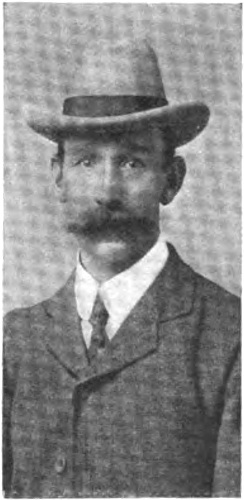
MR. A. SODEN, WHO HERE DESCRIBES
HIS EXPERIENCES IN A RUNAWAY
BALLOON.
From a Photo. by Sternberg & Co.,
Kingston-on-Thames.
At four-forty-five in the afternoon of this particular Saturday, while I was still debating what to do with myself, what should I see to the north-east but the war balloon, released from its anchorage at Stamford Bridge grounds, being carried by a gentle September breeze in the direction of Epsom. At all times the sight of a balloon excites peculiar interest, and I had soon made up my mind—I would try my hand at catching the aeronauts, and try to beat the military cyclists! I rushed for my machine, and was presently in full chase, pedalling fast through the lovely lanes of Malden. On and on I went, riding hard, alternately glancing at the road to see that all was clear and then at the balloon, calculating how high it was, how far away, and where it was likely to descend.
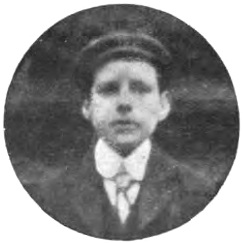
THE BOY WHO WAS WITH MR. SODEN IN
THE BALLOON.
From a Photograph.
Mile after mile I chased the drifting balloon, until at last, much to my joy, I saw that it was undoubtedly nearing the earth, and it eventually descended in a harvested field at Bookham. On approaching the balloon I soon discovered I was not alone, for cyclists representing various Volunteer regiments and civilian riders were there by the score; and a number of farm labourers who had been busy harvesting in the neighbouring fields also appeared on the scene, eager to inspect closely so formidable a beast as a war balloon.
The formal “capturing” of the balloonists by the soldiers was soon over, and then, at the urgent request of the onlookers, and to the intense delight of the local element, Mr. Spencer was good enough to grant permission for those who wished to go for short trips in the balloon, now held captive by the anchor-rope. There were many willing hands to relieve the balloon of ballast, grappling-irons, and sundries, and in a remarkably short time the great gas-bag was free of its accoutrements. A trail-rope was attached for those on the ground to hang on, to prevent the balloon from sailing away, and Mr. Spencer, with his usual foresight, arranged for parties of six to go up at a time. The passengers were given strict instructions that when the balloon touched ground each was to get out singly, so that there should be no sudden alteration of weight that would cause the balloon to shoot up again.
All went merrily, and several 426 car-loads went up, we on the ground hanging tight to the rope and hauling the great bag down on the word of command from Mr. Spencer. At length came the call, “The last time!” and in I jumped. There were five of us in the car, four men and a boy—a Volunteer, a farm labourer, and two others. Surely, I thought, as the great sphere began to rise, I am well repaid for my long ride by this novel experience. It was grand to be sailing up in the air with the ground gradually sinking away beneath us and our late companions becoming mere specks dotted about on the ground. At last we arrived at the end of our upward journey, and the men below began hauling at the trail-rope. Down we went, and presently touched ground. Then, contrary to all instructions, out jumped the Volunteer and a civilian named Tickner. As they leapt they collided with the men who held the controlling ropes, knocking them over and causing much confusion.
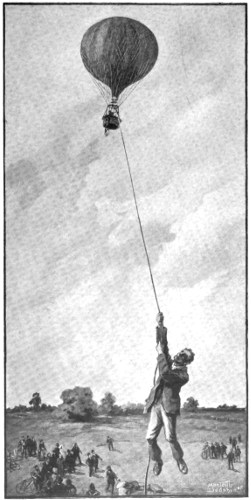
“HIGHER AND HIGHER WE WENT, WITH THE HAPLESS MAN DANGLING.”
The balloon, relieved of the heavy load, at once shot up again. There were wild cries of “Seize the rope!” “Hang on to her!” “Hold her down!” But all the shouts were of no avail; the balloon continued to rush upwards, while we peered helplessly over the edge of the car. Several men, realizing the dangerous position we were in, soaring up aloft at great speed, rushed into the middle of the crowd of excited onlookers and seized the trailing rope, but all to no purpose; it was now impossible to check the balloon’s rapid ascent. “Let go!” roared somebody, and by the sudden bound our car gave we knew the men had obeyed. All, that is, save one. He, Tickner, a hard-working, much-respected farm labourer, clung to the rope like a monkey, only to be drawn up into the air as the balloon rose. Higher and higher we went, with the hapless man 427 dangling two hundred feet below us and the crowd watching with horror in their eyes. Presently, when he was about eighty feet from the earth, the poor fellow’s strength gave out and he was compelled to let go, falling with an awful thud to the ground.
Then, for the first time since the accident, I found my tongue. “Good heavens! this is awful!” I cried. “Where shall we drop?” I could say no more, for my knees shook under me and my very blood seemed frozen with horror. Still, steadily and inexorably, the balloon continued to rise. I dared not look over the side, but I knew we must have reached a considerable altitude. What would happen to us, and should we ever see our homes again?
All this time the boy beside me, shivering with fright, yet not realising his desperate position, kept dinning into my ears in a whining monotone, “They’ve let us go! They’ve let us go!”
There was nothing to be seen around us now but mountains of clouds—clouds white, black, and grey. I saw them, and yet, somehow or other, I could not bring myself to realize what they meant. I could not think, but simply stood there, bewildered and dazed, leaning against the side of the car. On my right hand the boy still continued his maddening wail; on the left my second companion, a man, kept asking what his father and mother would think. Our peril seemed to have temporarily turned his brain.
2 SEPTEMBER 1902.
BALLON DISASTER.
A LEATHERHEAD LABORER KILLED.
THRILLING ADVENTURES OF AMATEUR AERONAUTS.
The ballon versus cyclists, which was arranged by the Rev. G. M. Bacon, of Newbury, the ballooning enthusiast, with the sanction of the War Office, and which took place from Stamford-bridge athletic grounds on Saturday, was, it was transpire, attended with an accident of a very serious character, resulting in the death of one man, injuries to several others, and an experience which three of those involved are never likely to forget as long as they live. The
A CUTTING FROM THE “MORNING LEADER”
REFERRING TO THE BALLOON DISASTER.
Click here for image.
I glanced at the altitude-registering instrument; we were up two thousand feet! Then, suddenly, without the slightest warning, my brain cleared, and I remembered the valve, the opening of which would cause the great gas-bag to descend. But where was it? Which was the valve-rope? The car seemed all ropes as I turned anxiously this way and that. I tried one after another, and at last, to my joy, I felt one give. Then I smelt the escaping gas, and knew that I had struck the right cord. Very soon I realized that our upward way was checked, and that instead we were descending. I do not know how long we took over the downward trip. I only remember that I pulled the rope, then slacked it, and so on alternately until we could faintly hear the shouts of those below. Presently the boy plucked up courage to look over the side of the car, and, wild with joy, called out that we were saved. Fortunately for us, there was practically no wind; we went up straight and came down straight, landing safely in a field only some two hundred yards from the spot where we ascended. I collapsed as they helped me out of the car, and the other man, directly he alighted, rushed headlong away—the ordeal had turned his brain.
Giving evidence before the coroner the following Monday at the inquest on poor Tickner, I still felt decidedly shaky, and to my dying day I shall never forget my trip in the runaway balloon.
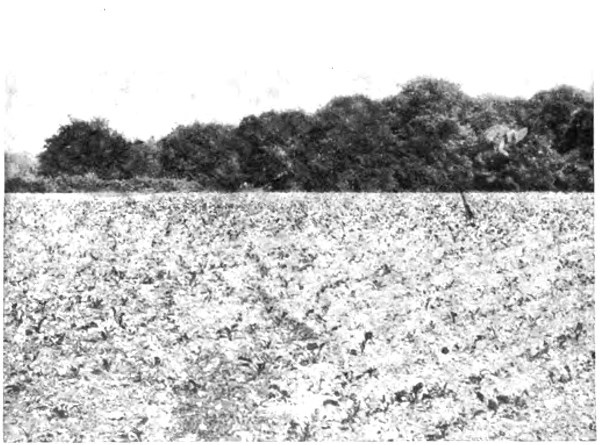
THE FIELD IN WHICH THE BALLOON DESCENDED.
From a Photograph.
428
When a man, especially a wealthy man, sets out to erect a memorial to something or somebody, there is no knowing what eccentricity he will not commit. Scattered up and down this country, as the writer shows, are a number of most remarkable memorials—“freaks” of the first water, from whatever standpoint one judges them.

Who shall impose limits on the intent and form of memorials? He would be a brave man indeed who attempted the task; yet, though it is very difficult to say precisely where the line should be drawn, there are a number of such things in existence which, judged by the commonly-accepted standards, are distinctly “freakish.” They range from public statues plain to all men to small stones in arcadian aloofness, and, as a whole, go far to justify the oft-repeated taunt of the “intelligent foreigner”—a taunt amounting to an implication—that memorials afford an outlet for much of the Englishman’s eccentricity and sheer “pig-headedness.”
There are some very curious monuments to animals scattered over the countryside. The one with the most remarkable story crowns Farley Mount, near Winchester. Underneath it lies buried, as an inscription on the exterior records, “a horse, the property of Paulet St. John, Esq., that in the month of September, 1733, leaped into a chalk-pit twenty-five feet deep a-fox-hunting, with his master on his back, and in October, 1734, won the Hunters’ Plate on Worthing Downs, and was rode by his owner, and entered in the name of Beware Chalk Pit.” This inscription, which is a copy of the original, was restored by the Right Hon. Sir William Heathcote, Bart., in 1870. A duplicate is in the interior, which is provided with three seats intended for the accommodation of wayfarers.
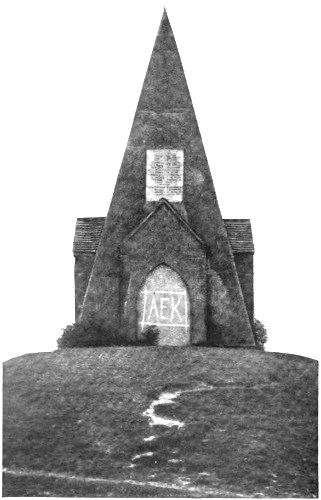
A MONUMENT TO A HORSE THAT LEAPED INTO A CHALK-PIT AND AFTERWARDS WON A RACE.
From a Photograph.
Of the memorials to dogs the most imposing of modern date is “Tell’s Tower,” a structure on the seashore near West Kirby, Cheshire. It is in honour of the Great St. Bernard dog, Tell, “ancestor of most of the rough-coated champions of England, and himself winner of every prize in the kingdom. He was majestic in appearance, noble in character, and of undaunted courage.” Built by the late Mr. J. Cumming Macdona, the tower is a sort of summer-house, in the base of which is a vault containing Tell’s remains, guarded by an effigy of that remarkable animal.
To a whole series of such freaks of commemoration there hangs a singular tale. In Oatlands Park, Weybridge, there are two or three scores of memorials to dogs. These animals, some of which have handsome epitaphs inscribed to their many virtues, are popularly supposed to have been pets of Frederica Duchess of York; but, as a fact, Her Royal Highness had not sufficient warm 429 affection to bestow a goodly portion on so many dumb creatures. What human being, indeed, ever had? She was presented with many dogs, which she could neither refuse without giving pain, nor keep unless the whole house was turned into kennels. So they were given a dose of opium, buried, and then commemorated in verse. But, while the Duchess was not so foolish as is generally believed by those who visit Oatlands, she was certainly responsible for the monuments.
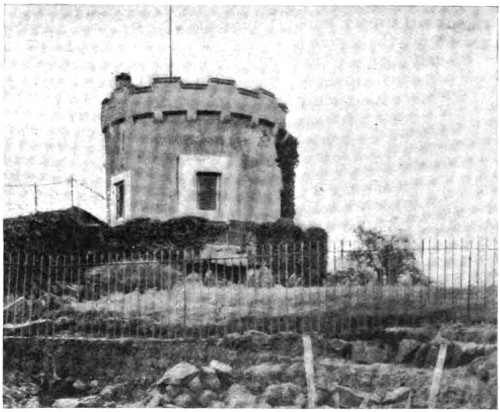
“TELL’S TOWER,” ERECTED TO THE MEMORY OF A ST. BERNARD DOG—IN THE
FOUNDATIONS IS A VAULT CONTAINING THE ANIMAL’S REMAINS.
From a Photograph.
Strange, then, that her own memorial is the prime curiosity of Weybridge! Its history is this: After her death the inhabitants of the town were desirous of commemorating her thirty years’ residence among them, and it suddenly struck them that a way was ready to hand. Till about fifty years earlier there had stood in Seven Dials a pillar supporting a sundial which presented a face to each of the streets. It was from this adornment, indeed, that the classic district got its name. Believing that treasure was buried beneath the pillar, some night-birds threw it down and excavated beneath it, to find nothing. Rumour, they discovered, was a lying jade. The stones, instead of being set up again on their old site, were conveyed to Sayes Court, Addlestone, with a view to their re-erection there, but this was not done, the column remaining dismembered till the occupier of Oatlands died. Now this bit of London out of town the inhabitants resolved should be converted into a memorial of the Duchess. So the stones were purchased and set up on the green, with the substitution of a ducal crown for the block on which were the dials. This was used for some time afterwards as a mounting stone at an inn hard by. It then constituted a puzzle, because, though in Seven Dials—according to the testimony of everybody who described it—there were seven faces, the number on close examination proved to be only six.
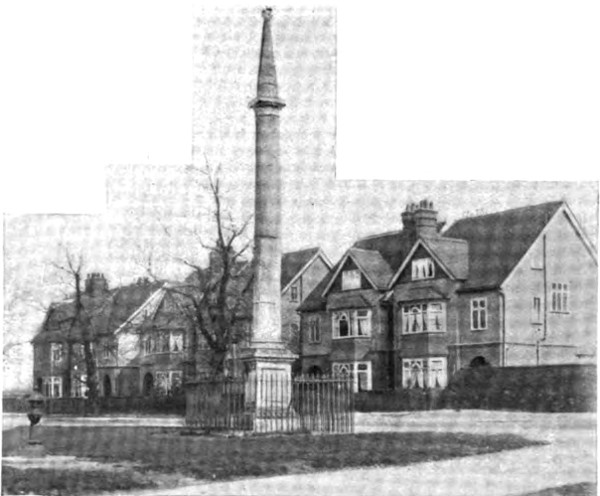
THE “SEVEN DIALS” PILLAR, AT WEYBRIDGE, SURREY.
From a Photograph.
Another class of “freak” memorials have a twofold peculiarity: they are singular in themselves and are also remarkable by reason of the tardiness with which they were erected. Maud Heath’s Column, on Bremhillwick Hill, near Chippenham, is as good an instance as any. The title of the good lady to grateful remembrance is that she left a bequest by which a causeway 430 was constructed in 1474 from Chippenham to the shoulder of Bremhillwick Hill. Her claim was from the outset acknowledged, inscriptions along the route of the causeway expressing gratitude to her for having made it. But this was not enough for a former vicar of Bremhillwick. After pedestrians had for more than three centuries been called upon to bless the public-spirited lady, and had been told, moreover, precisely where her causeway began and where it ended, the vicar came to the conclusion that she ought to have a statue, and moved himself to that end. A preliminary difficulty was that no portrait of Maud Heath was known to exist; but ultimately, with the co-operation of the Marquess of Lansdowne, the clergyman triumphed, and the column on Bremhillwick Hill—which was set up in 1836—is the result. The sculptor of the statue on the top of it had to fall back on his imagination, and he represented a woman in fifteenth century costume, with a staff in her hand and a basket by her side.
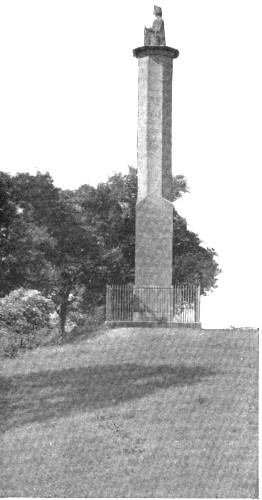
A BELATED MONUMENT—IT WAS ERECTED IN 1836 TO THE MEMORY OF A
LADY WHO LIVED IN 1474, AND THE ARCHITECT HAD TO FALL BACK UPON HIS IMAGINATION FOR THE PORTRAIT!
From a Photograph.
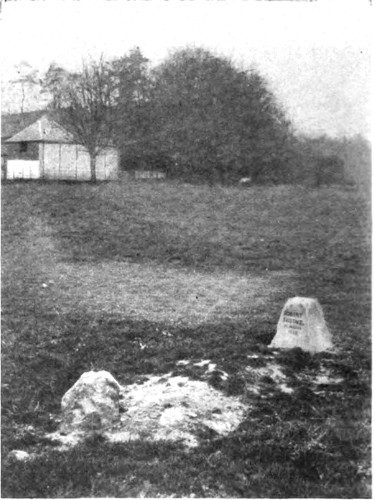
A HIGHWAYMAN’S GRAVE AT BOXMOOR COMMON.
From a Photograph.
A belated memorial of a different class is at the head of a highwayman’s grave on Boxmoor Common. The knight of the road buried here, Snooks by name, was long a terror to travellers on the London road, which runs by his resting-place. At last, emboldened by many successes, he had the audacity to rob the Royal mail, whereupon he was hunted down, and eventually hanged near the scene of many of his crimes. He was, it is said, the last highwayman to suffer the extreme penalty in the district. Buried in unconsecrated ground, he was intended to be forgotten; but till about four years ago his grave was re-turfed periodically, and then a small stone, simply inscribed, “Robert Snooks, 1803,” was placed at its head. That tribute is one proof out of many that there is still a certain admiration for the race of which Dick Turpin is the popular hero. 431
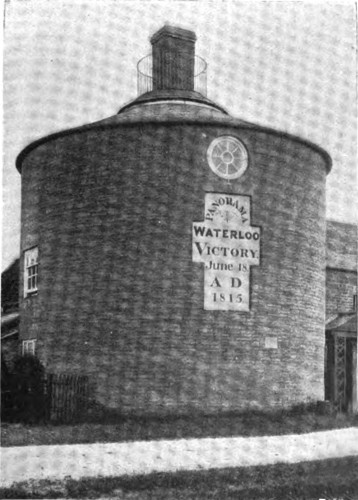
THE “ROUND HOUSE,” NEAR FINEDON, NORTHAMPTONSHIRE,
WHICH IS SUPPOSED TO OVERLOOK A TRACT OF COUNTRY
EXACTLY RESEMBLING THE FIELD OF WATERLOO.
From a Photograph.
Among our battle memorials are several of the “freak” order. The Round House, near Finedon, Northamptonshire, must certainly be so classified. Formerly an inn, it is now a dwelling, from the roof of which, it is said, there can be obtained a “panorama of Waterloo.” It was built on this spot, as a memorial of Wellington’s great victory, because the surrounding country is believed to be very much like the theatre of the momentous battle. There is a parallel duplicate in Kent. Crown Point, between Sevenoaks and Maidstone, takes its name from a place in Canada where Sir Jeffrey Amherst gained a great victory over the North American Indians. It is said to bear a remarkably close resemblance to its namesake.
Waterloo is also commemorated by an Alnwick memorial. Locally dubbed a “folly,” it stands on Camphill, where it is surrounded by tall fir trees, which prevent it from being seen except at close quarters. Its creator was the late Mr. H. S. Selby, whose object was to place on record the policy of Pitt, the victories of Wellington and Nelson, and the restoration of peace in 1814. He appears to have been doubtful afterwards whether the column would be sufficient to prevent all these events from being forgotten by posterity, because in celebration of the Battle of Waterloo he set up a beautiful statue of Peace in front of his mansion.
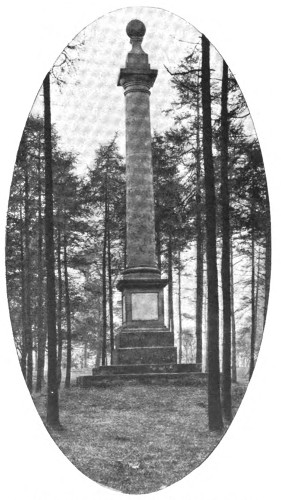
A HILL-TOP FREAK—THE COLUMN COMMEMORATES QUITE A LOT
OF THINGS, BUT IS SO SURROUNDED BY TREES AS TO BE
INVISIBLE SAVE AT CLOSE QUARTERS.
From a Photograph.
Still more singular a memorial of our fighting prowess is the Red Lion of Martlesham. The Red Lion, originally a ship’s figure-head, is now the sign of an inn at Martlesham, on the high road between Ipswich and Woodbridge, and is painted a most brilliant and 432 aggressive red. Indeed, “As red as the Red Lion of Martlesham” is a proverbial expression throughout East Suffolk. The grotesque object is a relic of a British victory over the Dutch in Sole Bay. It was brought inland as a trophy of our success, and was ultimately converted to its present use—that of an inn sign.
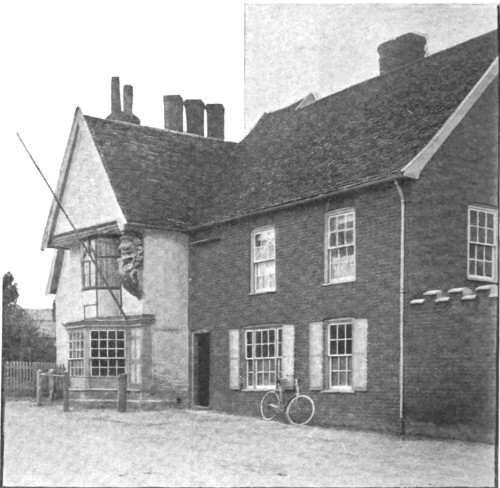
THE RED LION, OF MARTLESHAM, WHICH HAS GIVEN RISE TO A SUFFOLK PROVERB.
From a Photograph.
One of the best-known memorials of battles fought on English soil—the obelisk at Naseby—is a “freak,” and a strange one, too. Its distinction lies in the fact that it has misled thousands, including Carlyle and Dr. Arnold. “To commemorate,” so runs the inscription, “that great and decisive battle fought in this field on the XIV day of June, MDCXLV, between the Royalist Army, commanded by King Charles the First, and the Parliament Forces, headed by the Generals Fairfax and Cromwell ... this pillar was erected by John and Mary Frances Fitzgerald, Lord and Lady of the Manor of Naseby.” But nothing is more certain than that the battle was not fought in “this field.” It actually took place on Broadmoor, about a mile away. Appropriately, therefore, did Liston call the obelisk the “obstacle.” Edward Fitzgerald was conscious of this strange blunder, to which he refers in one of his letters (the monument, he says, “planted by my papa on the wrong site”), and which he proposed to remedy by removing the obelisk to the real battlefield. The scheme, however, was not carried out, presumably on the score of expense.
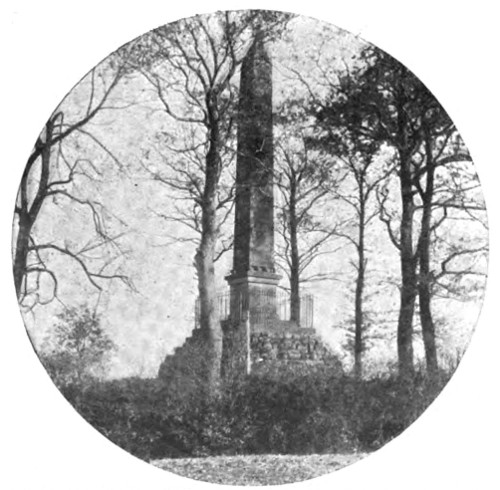
A MONUMENT IN THE WRONG PLACE—THE NASEBY MEMORIAL, WHICH DOES
NOT STAND UPON THE BATTLEFIELD AT ALL.
From a Photograph.
Besides the Round House, Finedon possesses a representative of a large class of “freak” memorials—those which bear no inscription, and the object of which is consequently doubtful. These differ from the many strange things which 433 serve as memorials without being plainly stamped as such. In Lancaster, for instance, a large horse-shoe is embedded in the middle of the roadway, and there is nothing to inform the stranger of its intent. It is actually there owing to a tradition that a horse ridden by John o’ Gaunt, the town’s patron saint, cast a shoe near the spot. The silent reminder of the incident—which, of course, has been renewed many times—was some years ago polished every morning. An eccentric man turned up with the utmost regularity, went down on his knees, and made it as bright as the proverbial new pin. Unfortunately his zeal was not admired by the authorities, who ultimately prosecuted him for obstructing the traffic.
A unique milestone, again, serves as a memorial. It stands in the hamlet of Newbold, Gloucestershire, and is surmounted by a cross. On the south side are the directions:—
And on the north face appears a “sermon in stone”:—
Nothing on the milestone denotes that it is intended to be a memorial, but a local gentleman, it is understood, erected it as such after the death of a member of his family.
There are, however, many memorials of conventional form which are much more puzzling than such “freaks.” Above the white horse at Cherhill, Wilts, is one on which not a single letter or figure appears. Several stories are told locally of its origin and purpose. Of the same cryptic character is the Finedon memorial—a pillar standing in a garden at the cross-roads. It is generally supposed to commemorate a mailcoach robbery which took place near the spot in or about the year 1810; but, as it was in existence before this event took place, the popular belief must be erroneous. The most probable theory is that it was set up during the rejoicings at the recovery of George III. from his illness. There was an ebullition of patriotism at that time, and before the fever subsided several memorials sprang up in different parts of the country.
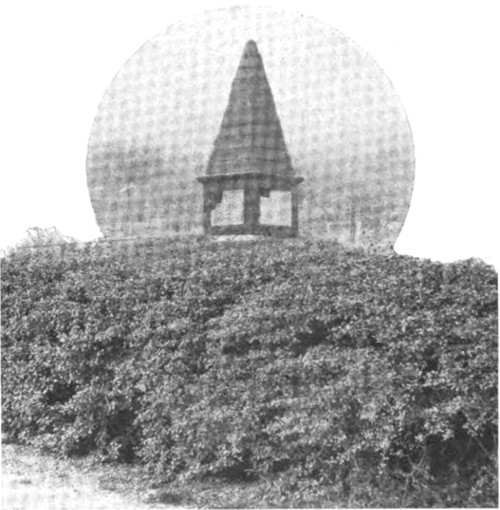
WHAT IS IT? AN OBELISK WITHOUT AN INSCRIPTION.
From a Photograph.
Burial-grounds contain numerous “freak” memorials, notwithstanding that clergymen, as a rule, discountenance that form of eccentricity which strives after novelty in post-mortem advertisement. The most curious churchyard memorial in England, perhaps, is at Pinner. It resembles a church tower, and half-way up it a coffin projects on each side. Beneath, and 434 supporting the structure, are arches filled in with ironwork, bearing the words, “Byde-my-Tyme.” The “my” appears to stand for one William London, who was interred (or interned) here in 1809.
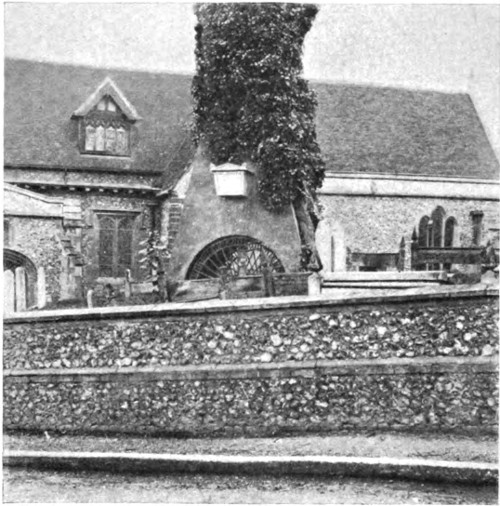
“’TWIXT EARTH AND SKY”—AN EXTRAORDINARY GRAVE IN PINNER CHURCHYARD.
From a Photograph.
Legends cluster round this strange object. The stone coffin, according to the most circumstantial, contains the remains of a Scotch merchant, whose descendants retain his property as long as he “remains above ground.” Nothing definite, however, is known about the tomb. If its constructor wished to furnish posterity with an insoluble puzzle, he has succeeded to perfection.
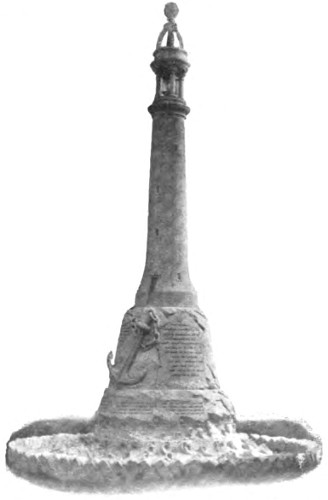
ANOTHER REMARKABLE MEMORIAL—A LIGHT BURNS IN THE TOWER NIGHT AND DAY.
From a Photograph.
Of the “freak” memorials in public cemeteries, a lighthouse is easily first. This is at Ulverston, and is not merely a stonemason’s model, for it actually contains a plate-glass lantern, in which a gas-jet is burning continuously day and night. The most remarkable thing about this elaborate token of affection, perhaps, is that it is not a glorified tombstone. It was erected by a daughter in memory of her father, who is buried elsewhere, and was placed on its present site because the two had paid several visits to Ulverston Priory. Neither had any real connection with the town. A feature which differentiates this handsome tribute from all, or nearly all, others is obvious, and that is the cost of maintenance consequent on the gas consumed in the lantern.
Public memorials include numbers of “freaks,” the singularity of some of which is greatly heightened by their surroundings. This is notably so in the case of a drinking fountain which stands in the middle of the East Anglian town of Swaffham. Unromantic as its environment is, this 435 structure is a modern heart shrine, containing as it does the cardiac organ of a local magnate, Sir William Bagge, who died in 1880. It was at his own request that his heart was deposited within the memorial, that he might remain after death, in a sense, in a place which he had loved so well in life.
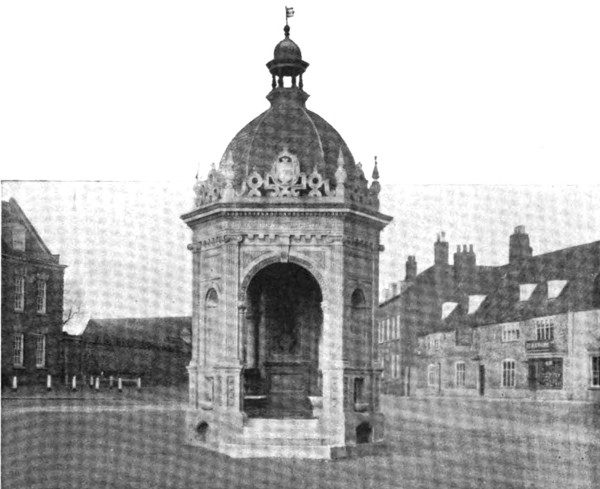
A MODERN “HEART SHRINE,” AT SWAFFHAM, NORFOLK.
From a Photograph.
The last class of people to whom one would expect to see “freak” memorials are preachers, and yet there are two or three to such men. Decidedly the most picturesque, though not the most outré, is a massive chimney-stack at Coleman Green, Herts. It is preserved, as a tablet on it records, because in the cottage which was attached to it Bunyan occasionally preached.
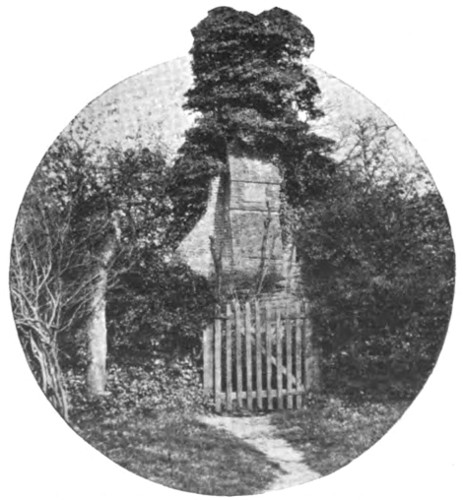
“JOHN BUNYAN’S CHIMNEY” AT COLEMAN GREEN, HERTFORDSHIRE.
From a Photograph.
Strange as some of the foregoing memorials are, they are surpassed by certain monstrosities in private parks, which unquestionably contain the most remarkable “freaks” of the kind in England. In several cases the public are forbidden to enter such domains, not because it is feared that they commit damage, but in order that they shall not see some colossal absurdity of which the descendants of its creator are ashamed. Nearly the first thing one gentleman did, on entering into possession of the estate which he now holds, was to ascertain whether he had power to sweep off it a memorial which was ridiculed by the whole countryside and pointed out to every stranger to the district. Finding that he could not remove the eyesore, he at once gave orders that the park wall should be raised four feet all the way round! 436
An account of a miraculous triple escape—an escape in which the odds were as a million to one on death. Mr. Wood’s adventure created quite a sensation in South Africa, for it is unique in the annals of the diamond fields. The photographs illustrating the story are published by kind permission of the general manager of the De Beers Consolidated Mines.

The following narrative, describing a miner’s miraculous escape from what appeared certain death, forms one of the most sensational episodes in the history of South African mining in general and of the world-famous De Beers Diamond Mines of Kimberley in particular. Miners who have spent many years in the wonderful underground workings of the Kimberley diamond mines, and who have become thoroughly familiar with the perils and thrilling incidents synonymous with underground mining, were dumbfounded at the truly unique experience which befell Mr. Charles Wood at the De Beers Company’s Wesselton Mine, Kimberley, South Africa, on Tuesday, 11th August, 1908. Mr. Wood’s story is here given as related to the author.
I am twenty-nine years of age, and have been for some years engaged in various capacities in the many departments of the underground workings of the Kimberley diamond mines. During that period I have witnessed many hairbreadth escapes from the innumerable perils of the treacherous subterranean workings, and have seen men launched into eternity in a single second by one or other of those unavoidable happenings which of necessity form part of the miner’s precarious occupation. Personally, however, I have been very fortunate, for my own mining experience has been uneventful—until last week, when I was the victim of a string of events probably unparalleled in the annals of the diamond mines.
On the morning of Tuesday, 11th August, 1908, I went to work as usual, and arrived at the mine shaft a few minutes before six o’clock, feeling in high spirits after a brisk and invigorating three-mile bicycle ride in a calm, bracing, and typical South African dawn, which heralded the commencement of a day that was to prove the most eventful and memorable of my life. Precisely as the mine “hooter” sounded, I, with several others, boarded the huge iron man-cage, and in another moment its human freight was being lowered some five hundred feet down the perpendicular shaft to the main working level of the mine.
Our destination was reached in due course, and the cage came to a standstill at the entrance to the main level, which here resembles a large arch-shaped room, about eighteen feet high and twenty-five feet wide, with sides and roof of solid rock. On the one side is the main vertical shaft, leading to the headgear on the surface above and to the further levels below, while directly opposite, and extending in a straight, horizontal line for nearly half a mile into the bowels of the earth, is the main tunnel to the mine, suggestive of some great corridor, with many side galleries and minor branch tunnels on either side, leading in contrary directions. There is a double track of rails, one for empties returning from the tips and the other for the loaded trucks, which are detached from the electric locomotives at an apex some thirty yards from the loading chute, and from which they run by gravitation, in sets of eight, along the “full-way,” round the left side of the shaft, to the automatic tips, which are situated immediately behind the shaft and on the opposite side of the main tunnel. Here the trucks are mechanically overturned and the contents discharged into the loading chute, a large steel receptacle some twenty feet deep, fifteen feet long, and four feet wide. From this point the trucks run along the “empty-way,” or right side of the shaft, in a semicircle towards the main tunnel, to be finally coupled to the locomotive, and drawn, in trains of sixteen, to the different passes to be reloaded.
In the mine I am known as the “tipman,” and my duties—directing the discharge of the diamond-laden “ground” into the chutes—commence when the trucks, laden with the “ground,” reach the automatic tips.
I was soon at my accustomed post, and before many minutes had elapsed the distant rumbling of the moving trucks in the tunnels became audible. The day’s operations had begun.
I am constantly engaged in superintending the working of the tipping arrangements, and in watching the running of trucks on the proper tracks, which here almost entirely encircle the main shaft, through which the “ground” is eventually raised to the surface in the giant hoisting skips. 437
On this particular morning I worked without the shortest break, and nothing interrupted the monotonous rolling of the trucks as they went backwards and forwards again and again to be refilled at the loading passes and emptied at the loading chutes, until nearly one o’clock, when, through a slight but unfortunate mishap, I became the victim of a catastrophe which now seems to me like some horrible nightmare, or the effect of temporary delirium, rather than an actual occurrence.
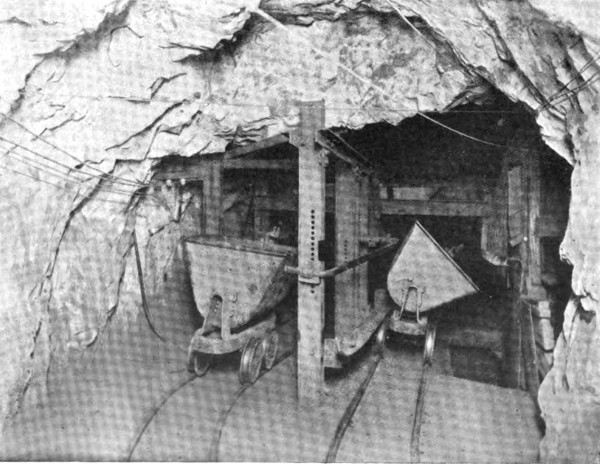
THE FIVE HUNDRED FEET LEVEL OF THE WESSELTON MINE, SHOWING AUTOMATIC TIPS AND TRUCK TIPPING INTO THE CHUTE INTO WHICH WOOD WAS THROWN.
From a Photo by J. A. Glennie, Kimberley.
As before-mentioned, the train of sixteen trucks is divided into two sets of eight trucks each. One set is emptied into No. 1 chute and the other into No. 2 chute. At about a quarter to one my attention was drawn to what appeared to be a slight irregularity in the tipping of the trucks at No. 2 chute. A train had just reached the tips, and the first set of eight trucks was emptied in the usual manner into No. 1 chute, while the second set was directed on to No. 2 chute.
As the last set of trucks passed round the “empty-way” I stepped on to the track, immediately over the No. 2 chute, in order to verify my suspicion that something was wrong. As I did so I heard a loud clattering noise, as of loaded trucks coming clown the “full-way” incline to the chute. I did not look to ascertain the cause of this noise at that moment, but an instant later I instinctively turned my head and looked up towards the entrance to the chute. Then, to my utter dismay and consternation, I saw, within a few feet, two fully-loaded trucks rushing headlong on to the No. 2 tip, where I was standing. In an instant the awful truth flashed through my brain. Only six trucks of the last set had tipped, two having become uncoupled up the incline, and here was I standing on the track immediately over the chute, without the remotest possibility of escape!
For a moment I was petrified with horror, and before I could make any arrangement the foremost of the two trucks had struck me full in the back, just above the hips, and I was precipitated violently into the chute, some twenty feet below, while at the same time, with a fearful, deafening noise, the two trucks overturned, and two tons of rock and hard blue “ground” came crashing into the chute on top of me. For a few seconds I was completely buried, but with a frantic effort I got the upper part of my body free, all the 438 time gasping wildly for breath, while temporarily deprived of sight by the mass of falling “ground,” and nearly asphyxiated by the immense cloud of dust, which seemed to hang over the chute like a pall.
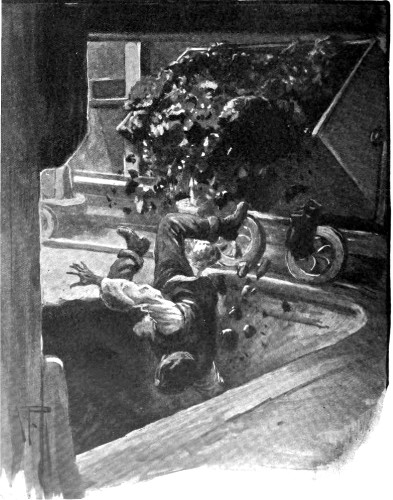
“I WAS PRECIPITATED VIOLENTLY INTO THE CHUTE.”
As I gradually gained control of my scattered senses I became aware of my miraculous escape from a terrible death, and with a shudder of horror realized that my situation was still one of extreme peril. In another second the doors of the chute would be opened, and I should either be plunged, with the great quantity of “ground” amidst which I lay, into the hoisting-skip below, or else crushed to a pulp by the next consignment of “ground” from the tip above. With almost superhuman strength I endeavoured to extricate 439 myself from the mass of “ground” by which I was well-nigh covered, and with all the power of which I was capable I shouted vociferously for help. It was all in vain, however; my cries for assistance were lost amidst the din of the constantly-moving trucks on the level above.
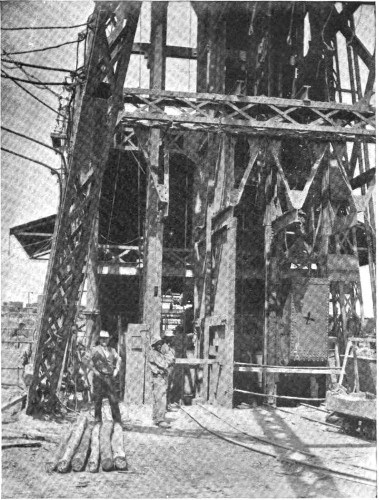
PORTION OF THE HEADGEAR SHOWING THE HOISTING-SKIP (INDICATED BY A CROSS) IN WHICH WOOD MADE HIS RAPID BUT UNCOMFORTABLE JOURNEY TO THE SURFACE.
From a Photo. by J. A. Glennie, Kimberley.
Just as I made another desperate attempt to free myself I heard the ominous creak of the levers, which foretold that the slides at the bottom of the chute were about to be opened, and—quite helpless and filled with an overwhelming despair—I resigned myself to my fate; I was doomed to a death from which there could be no possible escape. My whole frame was trembling with the fear of impending death, as, with a loud creak, the slides at the bottom of the chute separated, and I felt myself violently overturned and forced irresistibly through the opening. Thence I plunged head-first into the great hoisting-skip below, amidst the thunderous crash of the eight tons of blue “ground.” In a second the sliding doors of the chute had closed, the skip was loaded, and the relentless downpour of “ground” and hard lumps 440 ceased. I was again completely buried, but with a ferocious struggle managed to get my head uncovered.
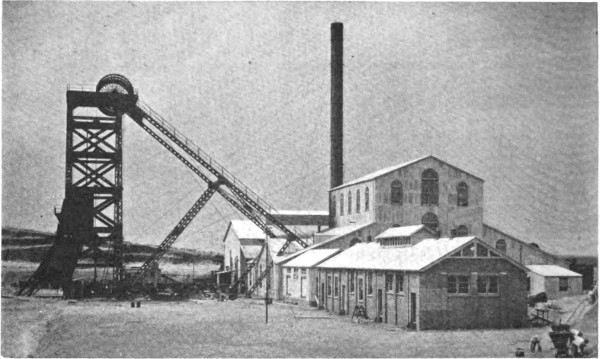
THE ENGINE-HOUSES AND HEADGEAR WHERE WOOD WAS HOISTED TO THE SURFACE.
From a Photo. by J. A. Glennie, Kimberley.
TO WHOM IT MAY CONCERN:
I, the undersigned, hereby certify that the account of my experience at Wesselton Mine, Kimberley, Cape Colony, as written by Mr. C. A. O. Duggan, is true and correct in every detail, and, further, I hereby give to Mr. C. A. O. Duggan the full and exclusive right to publish the particulars and account above referred to in any newspaper, periodical or magazine he may choose.
Charles Wood AS WITNESSES:— KIMBERLEY, S. A. 26th August, 1908. JJ Armstrong BW Freislich
The abovementioned copyright of Mr. Charles Wood’s experience at Wesselton Mine, Kimberley, C. C. is hereby given to the Proprietors of the “Wide World Magazine”, London, England.
MR. WOOD’S SIGNED STATEMENT VOUCHING FOR THE ACCURACY OF THIS STORY.
Click here for image.
Dazed and just able to realize my terrible situation, I gasped for breath, and, although quite oblivious of the nature and extent of my injuries, I was vaguely conscious that I was still alive, and that for the second time in a few minutes my life had been miraculously preserved. Securely pinned down by the tremendous weight of the “ground,” I lay unable to move, and after making a feeble and vain effort to shout for assistance, I gave up my futile struggle to free my aching body and sank down from sheer exhaustion, staring vacantly in the semi-darkness at an enormous, treacherous-looking boulder that had 441 lodged a few inches above me, and which appeared likely to find a fresh resting-place on my unprotected head at any moment.
For an instant there was a death-like stillness. Nearly distracted by the awful suspense, I lay helpless in the great iron skip, expecting each instant to feel the peculiar jerk of the hauling-rope that would mean the commencement of my lightning upward journey to the headgear on the surface, nearly six hundred feet above.
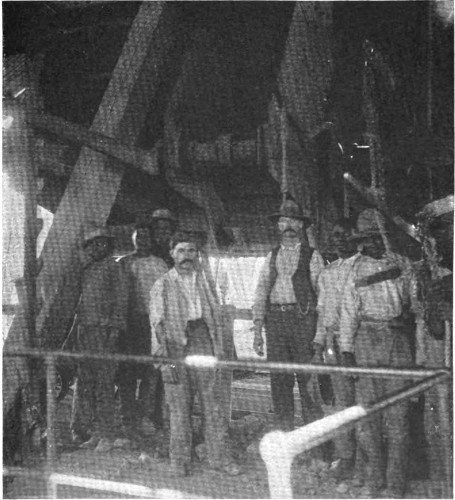
PORTION OF HEADGEAR SHOWING BOX LEVERS, WITH CHARLES WOOD STANDING ALMOST IMMEDIATELY UNDER THE LOADING-BOX WHERE HE WAS TAKEN OUT HEAD FIRST.
From a Photo. by J. A. Glennie, Kimberley.
What would be my fate when the skip tipped automatically on the surface? Should I be crushed to death or buried alive by the enormous quantity of “ground,” or should I meet with a more terrible death by being dashed to pieces against the steel sides or cross-bars of the loading-box, to be found later—a mangled and unrecognisable mass of humanity?
All these thoughts and countless vivid recollections of my childhood, boyhood, and early manhood flashed through my now disordered brain with startling rapidity, and I sobbed with anguish as I thought for a moment of my home, my children, and my wife, who was soon to be a widow and whom I should never see again. With a sickening terror I now grasped the fact that in a few seconds the great winding engine on the surface would be set in motion. Oh, the irony of it all! I had escaped death at the tip, and again at the loading-chute, only to end my existence when the skip eventually shot its eight-ton cargo into the steel loading-boxes above! Each moment now seemed a lifetime, and I prayed fervently that my suspense and agony might be ended.
At last the hauling-rope strained and tightened, and with a sudden jerk the skip started on its upward journey through the inky-black shaft, 442 gaining in rapidity at every yard, and each second carrying me nearer to death. The skip flew up at a terrific pace, and in a few seconds I was aware of its approach to the surface by the faint streaks of light that penetrated down the shaft. Another moment and I should be no more! The light of day became more and more intense, and with startling suddenness I shot out into the momentary and welcome brightness of the sunlight, past the level of the surface, and up to the automatic tip on the giant head-gear. Then, with a sharp click, the skip reached its tipping level and overturned, and I felt myself being thrown through space towards the yawning iron loading-boxes.
As the skip capsized I became unconscious, and was consequently spared the further mental torture consequent upon my precipitation into the yawning surface loading-boxes. At last, however, I opened my eyes, as if awakening from a profound sleep, and—amazed and utterly bewildered—gradually recognised that for the third time in as many minutes I had escaped a frightful death in a wonderful and miraculous manner. I found that I was lying awkwardly and with feet uppermost in the north side loading-box. While still trying to realize what had happened the slides of the box separated, and the next moment startled, anxious faces were peering in at me.
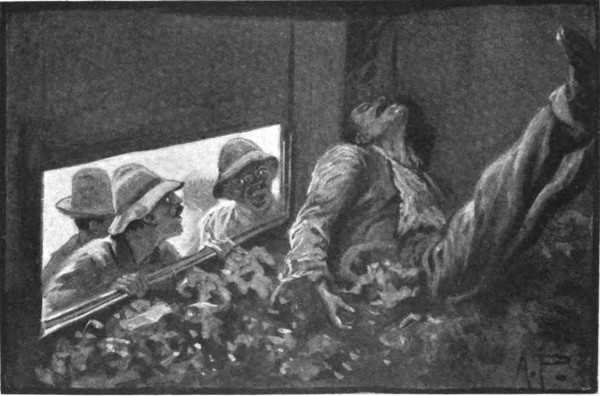
“STARTLED, ANXIOUS FACES WERE PEERING IN AT ME.”
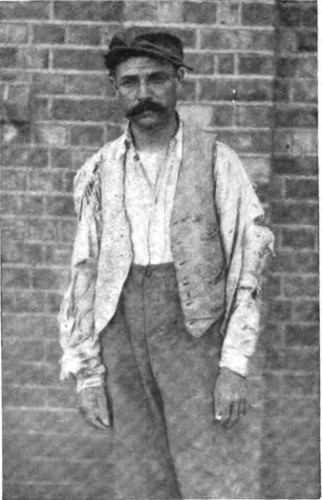
CHARLES WOOD AS HE APPEARED AFTER HIS ALARMING
ADVENTURE.
From a Photo. by J. A. Glennie, Kimberley.
Gently the amazed men lifted me through the door and carried me to the mine change-house, where my injuries were promptly attended to. Incredible as it may seem, I was not seriously hurt, only suffering from several bruises about the body and from slight cuts on the head and above one eye. I was duly sent to the Kimberley Hospital, from which I was discharged eight days after the chapter of accidents here related, having completely recovered from the effects of my remarkable adventure. 443
There is a place up in the mountains of Switzerland where from time immemorial the women have worn the garb and done most of the work of their men-folk, who stop at home and smoke or mind the babies, while their be-trousered wives and daughters toil in the hayfields or among the live stock. In this article Miss Van der Veer describes a visit to this strange and little-known community.

Away up in the mountains of one of the most beautiful cantons of Switzerland, the Valais, the peasant women have for years found it expedient to don the garb of their men-folk and work in the hayfields and among the grazing cattle on the slopes, while their lords and masters lounge their days away in ease and the quiet of their log huts.
Curious to relate, they all seem perfectly contented with this inverted order of things—the men in particular. They brew the herbs, fry the tough-as-leather mountain meat, and look after the babies, while their buxom wives are wrestling with the sterner duties of field and stable.
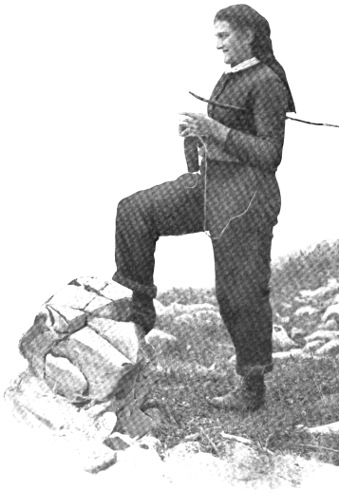
A SHEPHERDESS ON THE MOUNTAINS.
From a Photograph.
During the summer of 1908 I 444 spent some days in Champéry, the little village in the valley at the foot of the mountains where these strenuous women work and their lazy husbands smoke. At first I felt great disappointment at not seeing them about the village streets, but soon found that they seldom or never came down the mountain-side in their strange garb, or, at any rate, walked about the village in it. Tourists have become so numerous of recent years, and their curiosity so troublesome, that the village fathers have forbidden the women to come into the hamlet without skirts over their masculine nether garments. So whoever cares to behold them in the strange clothes of their choosing must scramble and toil their way up the mountain-side. On Sunday mornings it is highly entertaining to watch these women and young girls come down the zigzag footpaths to the tiny village chapel, where, just outside its doors, they halt and throw their skirts on over their heads in the most unconcerned fashion, as thoughtlessly as the fashionable dame gives her hat a furtive touch as she enters the church doors.
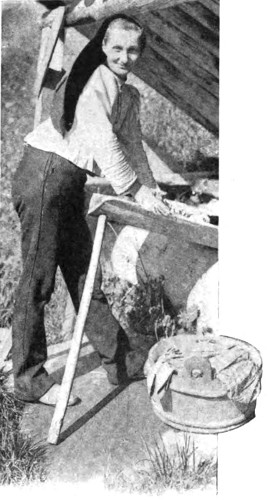
WASHING-DAY.
From a Photo. by Jullien Bros.
It is difficult to trace the origin of this strange custom of the Champéry dames donning masculine nether garments. When one asks the peasants about it they do their best to look reflective, but always end in declaring that “it was always so.” “Our men-folk like best the fires, and we like best the fields,” is about the only intelligible explanation I could get out of them. They are fine, sturdy-looking beings, mostly red-cheeked and strong of limb, and many of the younger ones are strikingly handsome.
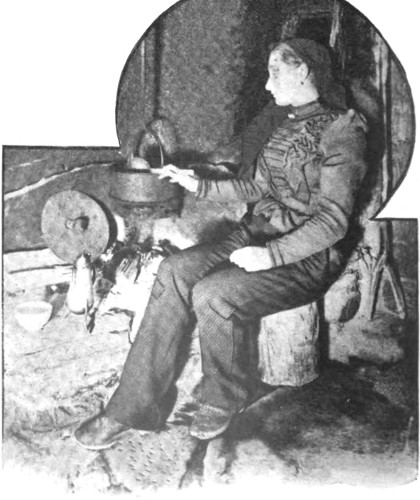
COOKING THE DINNER.
From a Photo. by Jullien Bros.
One can scarcely call their costume a becoming one, though it certainly looks better than one would expect, and, after the first novelty of 445 seeing them wears off, its absolute suitability disarms criticism.
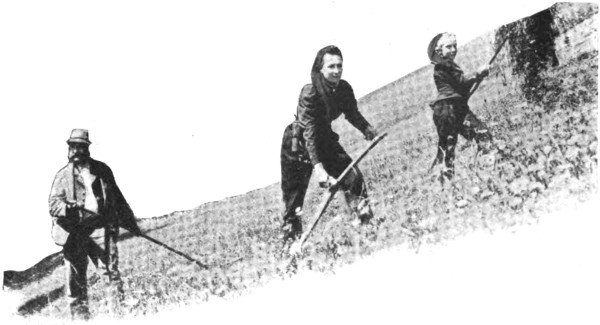
MOWING ON THE HILLSIDE.
From a Photo. by Jullien Bros.
The most amusing thing about it is that the upper part of the costume remains feminine—the ordinary rough bodice of the peasant woman, often in bright colours of red or blue, worn with the most nondescript cut of trousers, of the “home-made” variety. That such a costume is necessary for women who take upon themselves the work of their men-folk in such a region of the world is quite apparent to any woman who attempts to follow them at their work for even ten minutes.
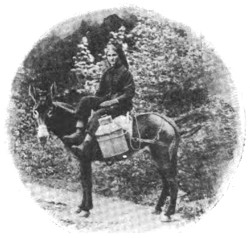
OFF TO THE VILLAGE.
From a Photo. by Jullien Bros.
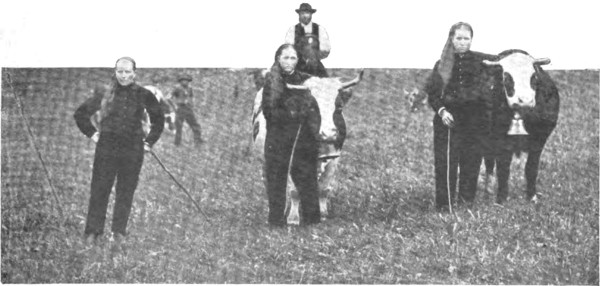
AMONG THE COWS ON THE MOUNTAIN PASTURES—THE WOMEN DO ALL THE MILKING AND BUTTER-MAKING.
From a Photograph.
The constant tramping along rough mountain ways and following cows over dangerously narrow ledges, the cutting of hay on inclines so acute as to be seemingly almost perpendicular, the going in search of lost sheep in thickets and snowdrifts, are but a few of the things which make the tyranny of skirts altogether impossible. 446 These women do not seem to mind in the least being stared at and questioned as to their clothes. In fact, they rather feel the pride of distinction their garments confer upon them. “We have never known any others,” they say quite simply, “so why should we feel queer in them? Besides, we all prefer them to skirts.”
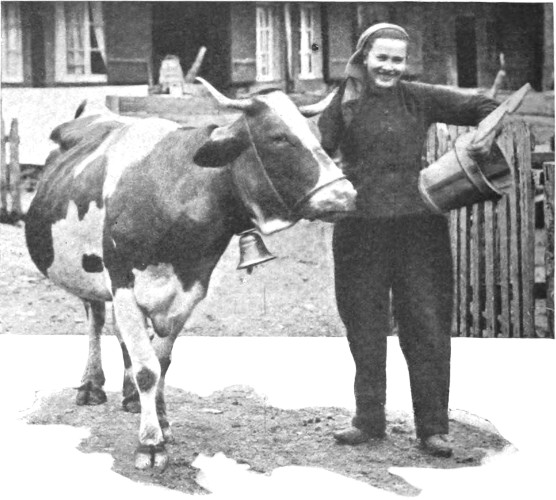
A BE-TROUSERED MILKMAID.
From a Photograph.
The most surprising thing is that, in spite of their male attire, the women do not walk or sit in the masculine manner. Anyone can see at a glance that they are women in men’s clothes, though some green—very green—tourists often make ridiculous mistakes. At a mountain hut I once heard an English traveller declare that he never heard of men doing the family knitting until he came over the pass where these people live. He had evidently not the faintest suspicion that he had come across the men-garbed women of the mountain region, for they often sit knitting as they herd the sheep and cows on the hillsides.
Another thing that strikes one absurdly is that, while wearing trousers, these women nearly always sit sideways on horseback and get over fences by first mounting to the top rail and sliding down women-fashion, instead of striding over man-fashion. In truth, I observed no end of evidence that the inconsistency of the weaker sex cannot be quenched by anything so delectable as clothes.
One morning, when a heavy mist hung over the mountain-tops, quite obscuring everything, I sat outside the comfortable little chalet where a happy family of four sturdy daughters, with their mother, donned trousers every morning and disappeared up the mountain-side to work, while their stalwart “Pap,” as they called him, pottered round the house, pipe in mouth.
I could hear the women sharpening their scythes now and again, and catch snatches of mountain ditties as they sang at their mowing. Later on, as the mist lifted, I walked up to where they were working, and the first thing I 447 noticed was that their trousers were so long as to be quite dripping with mud, just as their skirts would have been had they worn them. When the old man went out he turned his up.
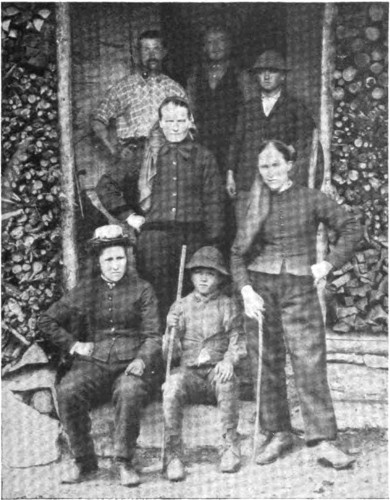
A FAMILY GROUP.
From a Photograph.
Another feminine absurdity is the wearing of a long sort of toga, which trails down their backs and gets in the way whenever they bend over or go through the tangles of the mountain wood.
“Why don’t you wear a cap or small felt hat like the men?” I asked an old woman once.
“We have always covered our heads so,” was her explanation—an explanation, in her opinion, that was all-sufficing; peasants from one generation to another do everything simply because their forefathers did the same.
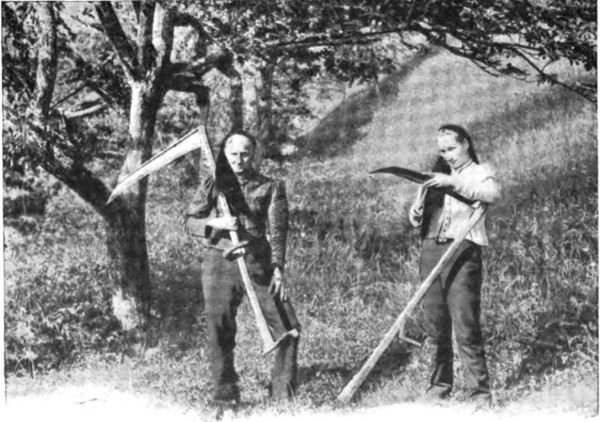
A HALT FOR REST.
From a Photo. by Jullien Bros.
One would imagine that on Sundays and fête days these women, particularly the young ones, would yield to the eternal feminine instinct of assuming the finery of their sex, but not they. Rest-time and feast-time always finds them in their usual garments. They have better-looking ones for these occasions, I confess, but they have no hankering for the trammels of skirts even during their courting hours. I was highly amused at seeing the pretty girls sauntering along the picturesque trails with their sweet-hearts’ arms around their waists, looking to the casual stranger for all the world like two young men gone “loony.”
One can scarcely imagine a wedding-party with bride and groom dressed in the same kind of garments, but I have seen one in the mountains, when the bride wore a white bodice, white trousers, and a bunch of white violets in her hair! She was as pretty as a picture, too, despite the attire, and quite as blushing and shy as any bride out of a convent.
The man of her choice, a perfect giant of a peasant, was resplendent in native costume, the chief glory of which, a green waistcoat with large brass buttons, could be seen a long way off.
Most of the weddings of recent years have been held in the little chapel of the village down 448 in the valley, where the regulation “slip over” skirt is donned at the chapel door, to be discarded before the tramp up the mountain-side is begun.
One day I was told in the village that a funeral was to be held in the little mountain settlement above Champéry, and I trudged up the zigzag pathway as hurriedly as the occasion would allow, for I confess to having a penchant for witnessing these mournful conclaves in every foreign country I may visit.
I had no trouble in discovering the house of mourning, as a crowd of peasants hung about the door. Soon the little procession, headed by the priest and his attendants, filed out of the door and moved with solemn chant down the mountain-side towards the little churchyard below.
On inquiry, I learned that the departed one was the elderly husband of a bent and weather-beaten old peasant woman, who tottered along in faded black garments, the nether portion of which looked for all the world as if she had donned the “left-overs” of her dear departed. On her head was a crisp new crape toga, however, and as she hobbled along I confess that she made a pathetic as well as an incongruous figure.
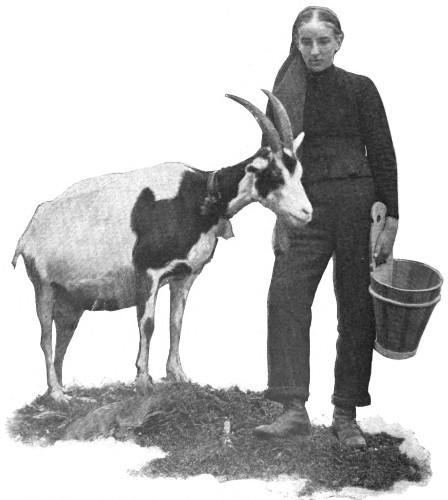
THE VILLAGERS POSSESS LARGE HERDS OF FINE MILCH-GOATS, WHICH THE WOMEN LOOK AFTER WHILE THEIR MEN-FOLK STOP AT HOME.
From a Photo. by Jullien Bros.
Despite the fact that the women work hard out of doors, summer and winter, exposed to the worst of weathers, they are mostly long-lived and seldom know what illness is. I often saw them working in the hayfields with their babies lying blinking in the sunlight near by. At noon they lounged under the trees, talking mother-foolishness to the wee things, and their queer garments never seem so hideous and 449 altogether distasteful as when they are nursing the children.
The lack of even the simplest understanding of remedies for either illness or accident has always struck me as most remarkable among the Swiss peasantry. They may live several hours’ journey away from a doctor or chemist without ever making the least attempt at learning what to do for even the simplest ailments.
I once knew one of these Champéry women to have sunstroke so badly that she became quite unconscious, and continued so long in that state that I was certain she would die.
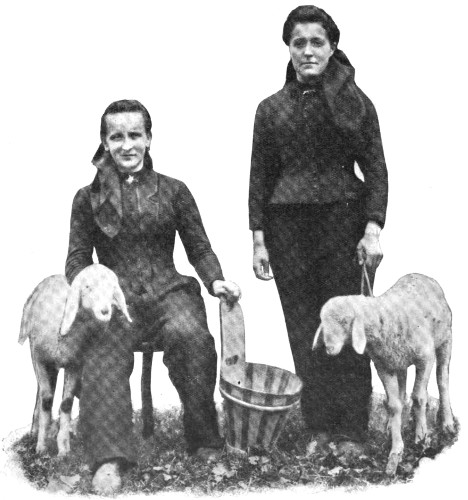
“MARY HAD A LITTLE LAMB”—THIS PHOTOGRAPH SHOWS CLEARLY THE “HOME-MADE” CUT OF THE TROUSERS AND THE CURIOUS HEAD-DRESS WORN BY THE WOMEN.
There were any number of old men and women gathered round wailing, but none of them seemed to know what to do in such a case. The woman’s mother suggested giving her a cup of coffee, which was attempted, most of it being spilt over her. Then someone took off her shoes and began slapping the soles of her feet with a piece of board.
I chanced to have a “first aid” case with me, and—greatly to the distrust of the peasants—administered what suitable remedies I had; I also insisted on one going post-haste down the valley for a medical man. But they would do nothing except wail and shake their heads. Finally the patient came round all right, saying that her head “felt full of hot things,” and the next morning, when I called to inquire after her, I found that she was at work in the hayfields, hatless, under the scorching sunlight, as usual. At another time a little child of three was taken with convulsions from having eaten 450 too much cheese, and died without having anything done to save the little creature; the old women simply wagging their heads wisely and muttering something about their all “going” when taken like that. With them it is evidently a case of the survival of the fittest.
Last summer I was in Champéry at the time of the great Swiss national holiday, when everybody celebrates Swiss freedom by making as much noise as possible during the day and lighting huge bonfires at night. Everyone was dressed in holiday finery, many of the younger women appearing in grey-check trousers and hats with artificial flowers! One happy family party, consisting of the father and mother and four children, had evidently a decided fondness for royal purple—or perhaps this was the colour of their clan—for the six of them, even to the babe in arms, were arrayed in the purple of kings and emperors!
The baby in particular attracted my interest insomuch that I ventured to take the little creature in my arms in the hope that I might slip it out of the cartridge-like swaddling-case in which these poor little wretches are carried about. I might just as well have tried to pull off the muzzle of a gun; the babe was as tightly fixed in his terribly hot case as though it were a vice. And yet I doubt not he will grow into a fine stalwart son of the mountains, though how they ever manage to expand or lengthen at all is a mystery to me.
I once sat talking to an old goatherd who certainly looked as if he had sat in the same nook in the mountains for at least a century. He was so bent and rheumaticky-looking that I quite failed to see how he could possibly make his way along the steep and slippery paths. His “old woman,” as he called her, was off down the valley gathering faggots. “She be a great worker,” he told me, and never got tired the way he did. I asked him if he liked the idea of the women doing most of the hard work; he answered by saying that it “was their way.” It suited the women to work at the hay, he seemed to think; and, besides, they hadn’t to smoke, which was evidently sufficient occupation for the men.
This old man had never seen a railway until this last summer, when a branch line was run on to the village of Champéry, at the foot of his mountain home. I asked him what he thought of it, and he grumbled out a long tale of how it had already killed a lot of goats and sheep!
Any sort of progress is looked upon with the greatest prejudice and suspicion by these people, who will undergo any fatigue and discomfort rather than change the routine of centuries.
Coming down a mountain path one evening, I ran into a party of peasant girls toiling up with huge baskets of provisions strapped to their backs. In the half light I mistook them for men from their garb, but coming nearer I recognised their red togas, and later their women’s voices.
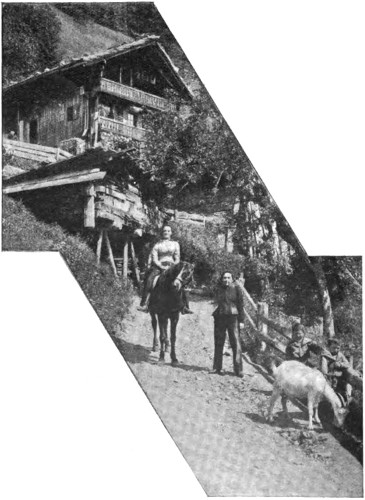
A MOUNTAIN IDYLL.
From a Photo. by Jullien Bros.
Stopping to talk with them, I found that they were of the well-to-do natives who owned cows and mules, but they seldom thought of taking the mules along to carry up the provisions or themselves.
It had always been the custom of their women to make pack-baskets out of their backs, and they would never think of doing otherwise. It is not easy to get these people to talk of themselves to strangers; they often resent being asked questions about their work and ideas.
Yet the young women take interest in the pretty clothes of strangers. One of them came up to me and touched a blue lapis-lazuli ring I was wearing, her eyes simply devouring it, and the other trinkets I wore of the same stone. Finally, she exclaimed that she liked them very much, and also the frock of the same colour. I am quite certain there was a momentary pang of feminine envy in her heart, and a hatred for her own incongruous garments. 451
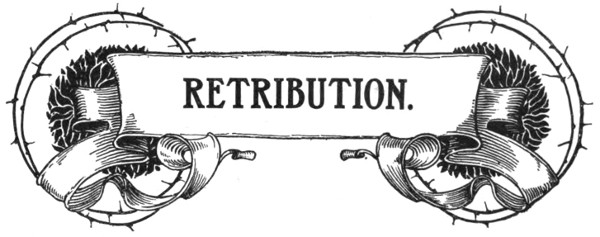
By Captain G. F. Pugh.
A story of the bad old “shanghaiing” days, showing how a villainous crimp had the tables turned upon him in dramatic fashion. Captain Pugh heard the first part of the story while in Newcastle, N.S.W., as mate of a ship, and its sequel upon a return voyage.

In 1872 Newcastle, New South Wales, was a busy, thriving little seaport. The harbour was full of large sailing ships, loading and waiting to load coal, and bound chiefly to China, San Francisco, and the Pacific Coast ports.
Very few of these ships had their full complement of seamen on board. Most of the sailors deserted during the vessels’ stay in port—and one cannot blame them, when it is remembered that the pay in these ships from British ports was two pounds ten a month, with the poorest quality of food that it was possible for the ship-owner to buy, and only just sufficient of that to keep body and soul together.
The pay out of the Australian ports was, for homeward-bounders, five pounds ten, and in the coast and inter-Colonial traders seven pounds a month, with a sufficiency of good, nourishing food. In addition to the inducements offered by the coast traders, there was plenty of work to be found on shore, for the Queensland, Victorian, and South Australian goldfields were in full swing. The consequence was that there was great difficulty in getting men to man the ships when they were ready for sea.
Like most seaports in those days of sailing-ships, the town was full of sailors’ boarding-houses. The tactics and ways of procuring men employed by the proprietors of these places were not such as would stand the light of day, but nevertheless they did a thriving business.
One of the most noted characters in the town was a boarding-house keeper named Dan Sullivan, a scoundrel to the backbone. He was notorious for the number of men he had “shanghaied” out of the port, but, strange to say, he had gained a certain amount of power in the town, and shipmasters requiring men were, under the circumstances, compelled to deal with him, although at the same time many of them had the utmost contempt for the fellow.
Sullivan kept a low-class drinking saloon with a free-and-easy dancing-room attached to it. The boarders lived in the rooms overhead. This was the only dancing saloon in the town, and was thronged with sailors every night. The liquor sold was, needless to say, vile stuff, but men who have been living for months on weevily biscuit and “salt-horse” have very little taste left in their mouths, and as long as the decoction was hot and came out of a bottle it passed muster.
Sullivan was an adept at drugging liquor, and he always kept materials at hand for that purpose. Just a little tobacco ash dropped in the glass when pouring out the drinks, and the thing was done. When he required a few sailors for a ship ready to sail, he picked out the likeliest men in the room—usually strangers—and when the seamen, hot and thirsty with dancing, ordered drinks through the women who acted as waitresses, these Delilahs would bring the prepared stuff, and soon the men would feel muddled and sleepy and would go into the side room and sink down on the benches.
Sullivan would then slip in among them.
“Halloa, mates! What’s the matter? Feel queer, eh? Ah, it’s the dancing and the hot weather. I’ll send you a good tot that will put you all right.”
He would then send one of the girls in with a good glass of hot whisky—drugged, and that would be all the men would know for some time. When they came to their senses they found themselves in a strange ship, out of sight of land, without a stitch of clothes beyond what they stood up in. Of course, there was generally a row, but it invariably ended in their turning to work and making the best of a bad bargain. 452
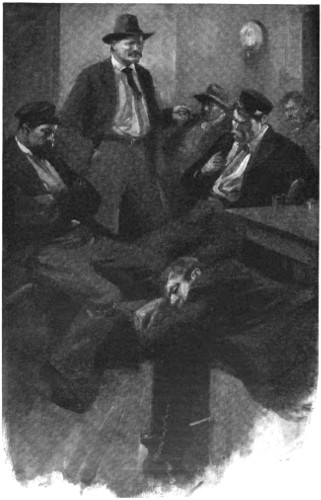
“HALLOA, MATES! WHAT’S THE MATTER?”
One day in February, 1872, it happened that there were three British ships lying at the buoys, loaded and ready to sail, but each was in want of a few seamen to make up her complement. Not a man could be got at the shipping-office for love or money—the news of a fresh gold-field on the Barrington had reached Newcastle that morning, and all the disengaged men had made tracks for that district. So the only possible way to get hands for the vessels ready to sail was to obtain them from the ships that had lately arrived, and which would have some time to wait for a loading berth.
The captains of the ships at the buoys sent for Sullivan, and arranged with him to supply them with four men each that night, as the trio would sail at the turn of the tide. When Sullivan got back on shore, he sent some of his runners to quietly let the crews of the ships in harbour know there was to be a free concert and dance at his place, with plenty of whisky into the bargain.
When night came the saloon was packed with seamen, and among the lot were six fine young American sailors from the ship Jeremiah Crawford, of New Bedford. Now, New Bedford ships are very often “family ships”—that is to say, the captain, officers, and seamen are related to each other. Of the six young fellows who went to this dance, two were nephews of the captain, one was a relative of the mate, and the others were related to members of the crew.
Long before the dance was over there were several seamen lying helplessly drugged in the side room. Just before midnight, and while the dance was still going on, Sullivan and his fellow-crimps removed the helpless men down to a boat, and took them off to the ships at the 453 buoys. Then Sullivan pocketed his blood-money, and before daylight the vessels were at sea under all plain sail.
The following day, when the six American seamen did not turn up on board the Jeremiah Crawford, inquiries were quietly made, and it was soon found out what had become of them; they had been among the twelve men “shanghaied” aboard the three waiting ships. The men’s shipmates, boiling with anger, wanted to go and wreck Sullivan and his saloon, but the captain called all hands aft, and from the poop told them they must not let it be known that they knew where their shipmates were.
“I know how you feel over it,” he said, “and I know how I feel too, but I intend to pay that rascal in his own coin. Those Britishers are off to ‘Frisco, and we are bound there, too; and you can bet your bottom dollar I mean to make the ship move when we start. And what is more, I intend to take that rascal Sullivan with me!”
“All right, captain,” answered the men. “Mum’s the word. We will wait events.”
Two days afterwards Captain Monk, of the Jeremiah Crawford, told Sullivan to get him six men by the time the ship was loaded.
Sullivan agreed, on condition that he was paid three pounds per man. This Captain Monk agreed to, and when the ship was finished and hauled out to the buoys, Sullivan sent word to the captain that he would bring the men off about eight p.m.
Now, that day a young Irish police-constable had been transferred from Sydney to Newcastle, and promoted. He was appointed to this district with a view to watching the goings-on at Sullivan’s, rumours of which had reached police head-quarters.
The constable was married to a fine strapping Irish lass, who was a great help to her husband. She wore her hair short like a man’s, and was not a stranger to the wearing of men’s clothes. It was partly owing to her, in fact, that her husband had got his position.
The constable knew he was there to get proof of Sullivan’s shady doings, and it was accordingly arranged that his wife should disguise herself as a seaman—as she had done before—and watch the inside while her husband watched the outside of Sullivan’s saloon. The policeman’s wife was a splendidly-built woman, as straight as a reed, and muscular as well.
So it happened that, when Sullivan was picking out the men he wanted for his purpose that night, he saw this likely-looking young fellow among them. But he was not taking any liquor—only a bottle of ginger-ale. Sullivan obligingly opened a bottle for him, and it was a simple matter, as the stuff fizzed out, to knock the ash from his cigar into the glass with his little finger, and the mischief was done.
Presently one of his spies cautioned the crimp that there was a constable knocking about in the street.
“We must get the beggar out of the way, Mike,” said Sullivan. “I’ll soon settle him. You watch him.”
Going outside, Sullivan walked up the street past the constable, smoking a splendid cigar. The constable got a whiff and wished he had one like it. In a few minutes the crimp returned, still puffing away at the cigar. As he passed the policeman he quietly dropped his cigar-case. The constable, just behind him, saw the case and picked it up, and, seeing there were two or three fine cigars in it, succumbed to temptation and put it in his pocket.
He could not long resist the mute appeal of those cigars, so, slipping into the shadow behind some houses, he lit one, and was soon enjoying a good smoke. It had a wonderfully soothing influence, and he leaned up against the wall, thinking of the sharp bit of work that had brought him promotion. He felt that already he had Sullivan in his power, and he saw himself in imagination with his sergeant’s stripes. Then, all of a sudden, he smiled a sickly smile, his head fell forward, his legs gave way beneath him, and he sank in a heap on the ground.
A few minutes afterwards the spy, who had been watching him all the time, cautiously approached. He took the cigar-case out of the unconscious man’s tunic, removed the remains of the drugged cigar from his mouth, and left him there.
The night was dark, and about eight p.m., while the dancing and singing were still in full swing, Sullivan and his tools got the selected men off in a boat. The tug was ahead of the ship, all ready to start. When the crimp got alongside with his men the Jeremiah Crawford was hanging to a slip-rope, and the captain was in his cabin waiting for Sullivan and the sailors.
“Hurry up and get those chaps on board,” the mate called out. “I want to get under way.”
“All right, Mister Mate,” answered one of the crimps. “We’ll soon have them on board. Get out of that, you brutes!” he added, giving one of the dazed men a kick.
Sullivan and his men soon got their victims on board, but on getting on deck one of the fellows, a fine-built young Swede, seemed to partly recover his senses.
“I don’t belong to this ship,” he said, and made for the gangway. With an oath Sullivan 454 sprang at him. A terrific blow on the side of the head, and the poor fellow dropped senseless on the deck. They then bundled the lot forward.
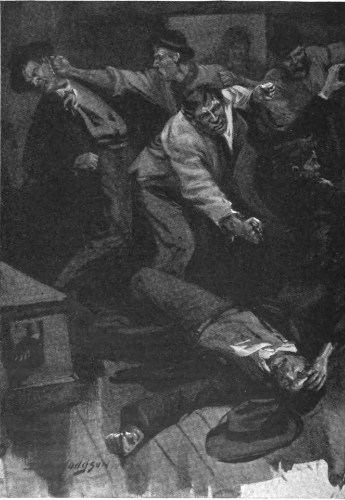
“EACH OF THEM WAS KNOCKED SENSELESS WITH A BLOW BEHIND THE EAR FROM A KNUCKLE-DUSTER.”
Finding no light in the forecastle Sullivan and his men stepped inside, and were in the act of striking matches, when each of them was knocked senseless with a blow behind the ear from a knuckle-duster. They were then dropped into the fore-peak and the hatch fastened down, while the new men were lifted into berths to sleep off the effects of the drugged liquor.
In the meantime, the second mate slipped down the gangway, and, standing on one side of Sullivan’s boat, capsized her. When she filled with water he cast her off and let her drift up-river.
The tug-boat dropped down, the tow-rope was secured, the buoy cast off, and before midnight the ship was outside the Nobbies and under all sail.
At daylight the “shanghaied” men were getting over the effects of the drug, and the captain called all hands aft to give them a good 455 glass of grog. The new men were in a terrible state when they came to their senses and found they had been “shanghaied.” One young fellow, in particular, sat down on the hatch and, placing his head on his hands, seemed to give way to despair. He took no heed of what was going on, and spoke no word to anyone.
The young Swede who had been so brutally struck by Sullivan stepped up to the captain.
“Who brought us on board?” he asked.
“Dan Sullivan,” replied the mate. “He said you were his boarders. I saw him come alongside, and then I went forward, and have not seen him since.”
“Did you pay him any advance for us, captain?”
“No; I have not seen him,” said the skipper. “He must have gone on shore again. I cannot understand it. I do not know the man,” added Captain Monk. “I wrote him to get me six men, and told him I would sign them on board. I heard him come alongside with you, and when I came out of my cabin I saw no boat alongside, and we got under way at once.”
“Thank you, captain,” replied the Swede. “Sullivan and I will meet again some day.”
“Halloa, halloa! What’s all that about?” rang out from the forecastle, accompanied by a heavy thumping.
The mate started to run forward, and all hands turned, to behold a remarkable sight.
Out of the forecastle bolted three men. Casting their eyes in the direction of the land they rushed aft, past the seamen, and were about to mount the poop-ladder, when the mate barred the way.
“Get down out of this, you skunks!” he roared. “Who are you fellows, and where do you come from?”
“You know jolly well who I am,” roared the biggest of the three. “And you had better land us as quick as you can, or it will be a bad job for you, so I tell you.”
The mate looked at him in silence for a moment; then the skipper chimed in.
“Who the deuce are you?” demanded Captain Monk; “and what are you doing aboard my ship?”
“What are you trying to get at, captain?” cried the crimp, furiously. “You know very well I’m Dan Sullivan. I brought you six men last night, and when we took them into the forecastle—”
There was a shuffle among the men, and the next minute the young Swede had sprung at Sullivan’s throat and the two were tossing about the deck battering each other like wild beasts.
“Stand back, everybody!” cried the mate. “Let them have it out.”
Sullivan was the bigger and heavier man, but the Swede was a perfect young athlete, and had a cruel wrong to wipe out. The muscles of his arms and neck stood out like strong cords as the two rolled from side to side.
Not a word was uttered by the officers or crew, who stood calmly looking on.
Suddenly, by a quick movement, the Swede pinned Sullivan against the fife-rail around the mainmast, and with his right hand battered his face unmercifully. Then, seizing him by the throat, he flung him into the lee-scuppers, where he lay without movement.
The Swede looked at his foe for a moment, then coolly walked over and wiped his boots on him. Next, turning towards the poop where Captain Monk and the officers stood, he touched his cap and said:—
“I am second mate of the Swedish ship Oscar Brandi, and my father is captain. I went on shore for a walk, and hearing the music I went into a saloon and called for a drink. I sat down to watch the dancers, and knew no more until I found myself on board this ship. What will my father say or think? What will my employers say?”
He stopped abruptly, and walked forward with his head bent, overwhelmed with his grief.
Within another minute the two remaining crimps were hotly engaged with two of the ship’s crew whose relatives had been “shanghaied” aboard the Britishers. The sailors made short work of the crimps, and fairly wiped the deck with them.
Captain Monk then ordered the hapless three to be locked up in separate cabins and fed on bread and water for a few days.
“It will give them time to repent,” he said to the mate. “It won’t do to put them with the crew yet awhile—there would be murder done. In a few days they can go forward, and the crew will save us dirtying our hands with the scoundrels. Our chaps will lead them a dance, and they will wish to Heaven they had never laid their hands on my crew.”
Just then the mate noticed the young fellow sitting on the hatch with his head in his hands. He seemed utterly dejected and oblivious of everything about him. The rest of the men had gone forward, and were excitedly discussing the matter of Sullivan and his mates being on board, each one swearing to have his pound of flesh out of the hated “shanghaiers.”
The captain and the mate walked along to the young fellow on the hatch. Putting his hand kindly on his bowed head, Captain Monk said: “Come, come, young man; you must not give way like that. Sailors should always make the best of everything.” 456
Lifting his head at the kindly touch and words, the young fellow replied:—
“Oh, captain, whatever shall I do? I am not a sailor.”
“Oh, never mind that,” said the mate. “You will soon learn here; so get forward with the others.”
“Oh, captain, take pity on me!” cried the supposed young man, tremulously. “For Heaven’s sake, take pity on me! I am a respectable married woman! My husband is Police-constable Hogan of the Newcastle police.”
The captain and mate were astounded, and for a moment could do nothing but stare at her. Then, seeing some of the men forward looking at them, Captain Monk said: “Come aft to the saloon and I will hear your story.”
When they got into the cabin Mrs. Hogan told how the authorities at Sydney had heard something of the doings of Sullivan and his crimps, and had sent her husband to the district to get evidence against him. She had assisted him before, and on this occasion had dressed up in her present clothes and joined the sailors in the dance room to watch Sullivan and his satellites.
“I called for a bottle of ginger-ale,” she said. “I watched him open the bottle, and I am sure there was nothing in the glass, for I saw it standing upside down on the counter; but I had not drunk it many minutes before I felt my head getting light, and I remember no more until I found myself on board this ship. I have abundant evidence against that blackguard Sullivan now, but it is no good as he is on board here. What shall I do? I have no clothes but these. I cannot go among those men.”
“Steamer ahead, sir! Coming this way,” rang out the cry.
“Aye, aye!”
Captain Monk took a look at her through the telescope.
“Run the ‘Urgent’ signal up!” he shouted. “It is the Union Company’s boat bound to Melbourne. I will send a letter and this woman on board. Back the mainyard, and get the boat out quick.”
Up went the signal, and the steamer bore down towards the ship. Her decks were crowded with passengers.
“You will go in the boat, Mrs. Hogan,” said the skipper, “and you had better explain things to the captain at once. My letter will tell him also. Mr. Patter, you go with the boat, and take four of our own hands with you. As soon as you give the letter to the captain, put this woman on board and return at once.”
“Aye, aye, sir. Ship your oars! Let go forward!”
The boat shot away and was soon alongside the steamer, and the mate and Mrs. Hogan climbed on board. Going along the bridge, Mr. Patter handed the letter to the captain, who read it and said:—
“All right. Tell Captain Monk that I will take the woman to Melbourne. I am glad he has that blackguard on board. Good-bye.”
The mate got back into his boat, the engines were rung ahead, the ensign was dipped three times, and before the boat was on board again the steamer was out of sight.
Then the sails were filled once more and the Jeremiah Crawford stood on her course.
Five days afterwards Sullivan and his mates were released and sent to live in the forecastle. Sullivan was put into the mate’s watch and the two crimps in the second mate’s watch.
There was another row at once, and again the blackguards got a good thrashing. They were put to the most menial work, were made to wait on the others, and do all the dirty work about the decks; in fact, their lives were made a misery to them from morning till night. Hardly a day passed that one or other of the scoundrels did not get a licking. They had a taste of the misery they had caused many another man, and, as the captain had prophesied, they had time to repent of their misdeeds.
When the Jeremiah Crawford arrived at San Francisco the pilot informed them that two British ships had just gone to the anchorage, adding that he noticed they were from Newcastle. This was good news to all but Sullivan and his crimps.
As they moved up the harbour to their anchorage they passed close to the Commonwealth. On board her were some of the Jeremiah Crawford’s crew, and as they passed, one of the sailors called out, “We have Sullivan on board!”
After the sails were unbent, all the running-gear triced up, and the decks washed down, the crew were dismissed.
“Pay off to-morrow,” said the mate.
“Aye, aye!” answered the crew.
All hands went on shore, and Sullivan was forced, much against his will, to go with them. On the wharf where they landed stood the six American sailors whom Sullivan and his mates had “shanghaied” from Newcastle! Let us mercifully draw a veil over the crimp’s final punishment.
Neither of the three blackguards turned up when the crew were paid off; no questions were asked, and no explanations given. But two years afterwards Sullivan appeared again at New South Wales—not the unscrupulous bully and braggart, but a broken, decrepit old man. 457
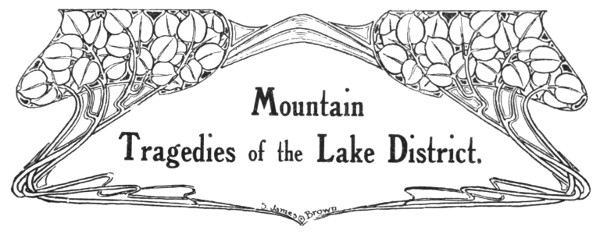
By a Member of the Alpine Club.
A contribution appealing to climbers and non-climbers alike. Although the writer prefers to remain anonymous, he is a well-known mountaineer. In this article he gives an authoritative and most interesting account of the various climbing fatalities which have occurred in the English Lake District, pointing out exactly how each disaster occurred. Photographs by G. P. Abraham, Keswick.

In these days of hurry-scurry mountaineering, when the words of the wise are on every climber’s tongue and the intention to obey them in few men’s minds, a great deal is written concerning the perils of the mountains. The object of the greater part of these writings has been to elaborate in detail the various phases of mountaineering dangers and how to obviate them: in other words, how best to avoid accidents.
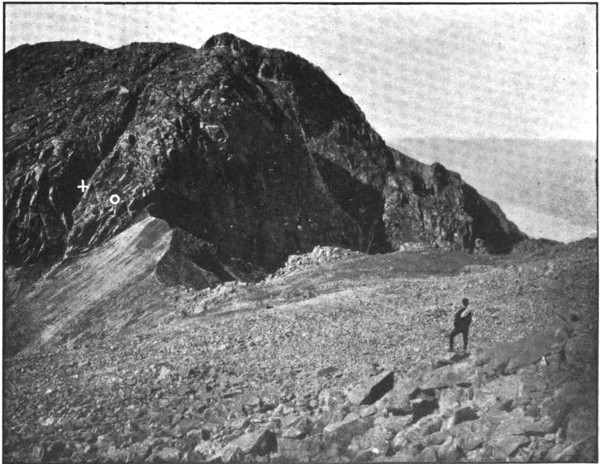
MICKLEDORE RIDGE AND THE BROAD STAND—THE CIRCLE MARKS THE SPOT FROM WHICH MR. HAARBLEICHER FELL AND THE CROSS THE POINT WHERE MR. PETTY LOST HIS BALANCE.
From a Photograph.
It is a somewhat singular fact that, beyond a few generalities and platitudes evolved by non-climbing reporters, no record has been written 458 of the accidents themselves. And yet, in the case of the accidents that have occurred in the Lake District, much is to be learnt. Every disaster on the mountains, if properly understood, should teach a lesson, for the majority of them are only accidents in part, and have been directly due to the disregard or violation of some cardinal law governing the sport of mountaineering.
If a man who has never been on a mountain in his life before endeavours to scale a steep precipice and loses his life in the attempt, can such be truly called an accident? Surely it would be more of an accident if he succeeded in winning through without mishap; a fatal fall may under such circumstances be called a tragedy—a disaster, but surely not an accident.
And yet the circumstances of the so-called accident to Mr. Haarbleicher, a Manchester merchant, in 1892, were almost in accordance with the above instance.
He arrived at Wastdale Head Hotel with his sister, and, being “anxious to climb his first mountain,” ascended Scawfell.
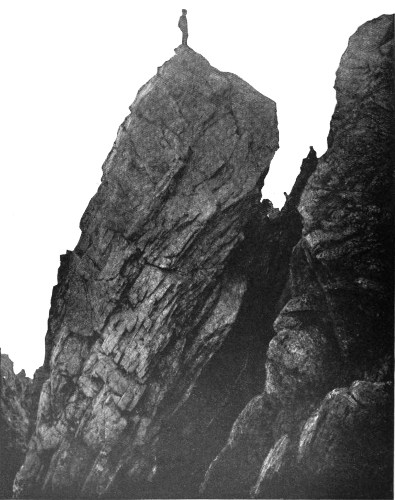
SCAWFELL PINNACLE—PROFESSOR MARSHALL HAD JUST RETURNED FROM THIS CLIMB WHEN HE MET WITH HIS FATAL ACCIDENT.
From a Photograph.
In attempting to descend to Mickledore by way of the Broad Stand, at the bottom of which is a steep cliff, he jumped downward on to a scree-covered slab, his feet shot from under 459 him, and he fell a distance of more than a hundred feet. As a result of his injuries he succumbed shortly after.
This lower cliff of the Broad Stand was responsible for another fall, which, however, did not prove fatal. A Mr. Petty was climbing Mickledore Chimney with a large party, amongst whom was his fiancée. The late J. W. Robinson was the leader. At the place where the Chimney is left and a step across to the Broad Stand effected, Mr. Petty took off the rope in order to let the leader throw the end of it down to the others of the party.
An agonized shout from Petty caused Mr. Robinson to turn sharply, and he saw his companion shooting head downwards with terrific velocity to the screes below. The distance, carefully measured afterwards, was a hundred and seven feet. Some of the party, still at the foot of the Chimney, were horrified to see Mr. Petty hurtling through the air towards them, and narrowly escaped being struck.
He fell face downward. The angle of his body conformed exactly to the slope of the screes, and his entire length struck the slope at once. It seems incredible that he could survive such a fall, and his friends never hoped to find him alive. His injuries was terrible, but nevertheless he still lived, and, by careful nursing, regained his full strength.
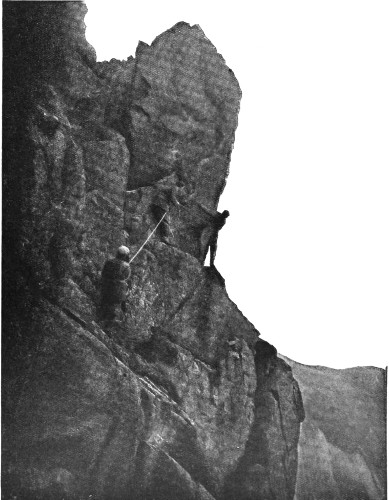
THE PILLAR ROCK—THIS IS THE CLIMB THE NOVICES WERE ATTEMPTING WHEN MR. WALKER WENT TO THEIR ASSISTANCE.
From a Photograph.
This is surely the most wonderful bit of luck that ever befell a climber. It transpired afterwards that he had grown impatient of waiting for the others to come up and had begun to fill in the time by a little desultory 460 climbing on a steep slab directly above him. Off this he had just slipped when he shouted and drew the attention of Mr. Robinson and the others.
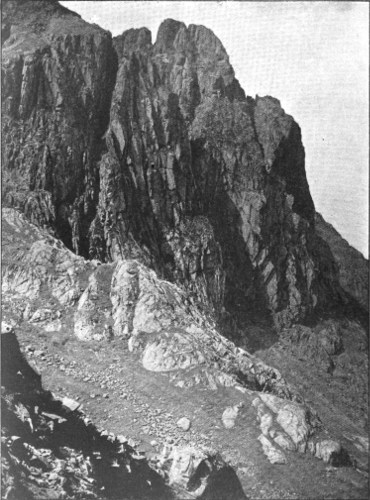
THE PILLAR ROCK AND SHAMROCK (NORTH SIDE)—THE CROSS SHOWS THE CLIFF MR. WALKER SLID OVER, NOW KNOWN AS “WALKER’S GULLY.”
From a Photograph.
Would that Professor Milnes Marshall, who was killed the following year on the opposite side of Scawfell, could have had such a providential escape! His fall could not have been one of more than twelve feet, and yet it proved too great.
In company with the late Owen Glynne Jones and Joseph Collier, Professor Marshall had just previously climbed Scawfell Pinnacle by way of Steep Ghyll, returning down Deep Ghyll to the 461 foot of the crags, where they had lunch together. Being anxious to obtain a photograph of the Ghyll, Professor Marshall scrambled up the fell side opposite to its entrance.
The nature of the ground was so easy and well broken up, although rocky and steep, that his companions never for a moment dreamt of disaster. Hearing a noise of falling stones they looked round and saw a cube of rock, about two feet in diameter, rolling down the mountain side. This was followed by the body of Professor Marshall. Both came to rest on the scree slope below the Lord’s Rake, where, to their great astonishment and horror, Messrs. Jones and Collier found the life of their companion quite extinct. Exactly how the accident happened will never be known, but it was surmised at the time that Mr. Marshall had stepped on the cube of rock and that it had given way with him. It has become proverbial that “it is on the easy places that accidents happen,” and no doubt it was the easy nature of the ground that caused a temporary carelessness on the part of a man who, in all mountaineering circles, was recognised as a most careful and cautious climber.
We may pass over briefly the death of the Rev. James Jackson, who fell on the Pillar and was killed in May, 1878. He was alone at the time, but his body was found at the foot of a steep cliff, near the summit of the mountain. In walking along the top of the cliff he had evidently slipped over, but what caused him to do so will never be known. The fact that the reverend gentleman had attained to the ripe age of eighty-two years may suggest a broad reason.
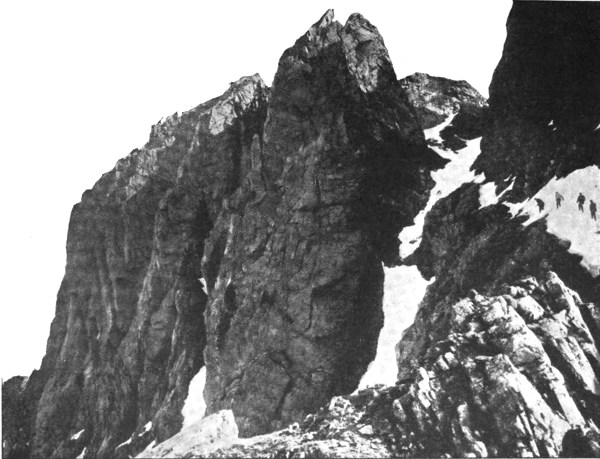
SCAWFELL PINNACLE AND DEEP GHYLL, SHOWING THE GHYLL AS IT APPEARED WHEN MR. GOODALL GLISSADED DOWN IT TO HIS DEATH.
From a Photograph.
At Easter, nearly five years later, a party of novices were trying to climb the Pillar Rock from the east side. For some time they were unsuccessful. Just then another party reached the top of the Pillar Mountain; one of them, a Whitehaven youth of the name of Walker, had climbed the rock some time before. Seeing the predicament of the novices, he set off down a snow-slope towards them, intending to direct their ascent. He had only gone a few feet when he slipped on to his back and shot off down the snow. Gathering terrific and uncontrollable impetus as he slid, he reached the Rock, which juts out of the side of the mountain, in a few moments and dashed into it. His body bounded off it and then fell into a gully on the right. This was filled with hard snow, which carried him swiftly downward until the crest of a sheer cliff was reached. Over this, for 462 five hundred feet, he plunged, and far into the Ennerdale valley below, death, of course, being inevitable.
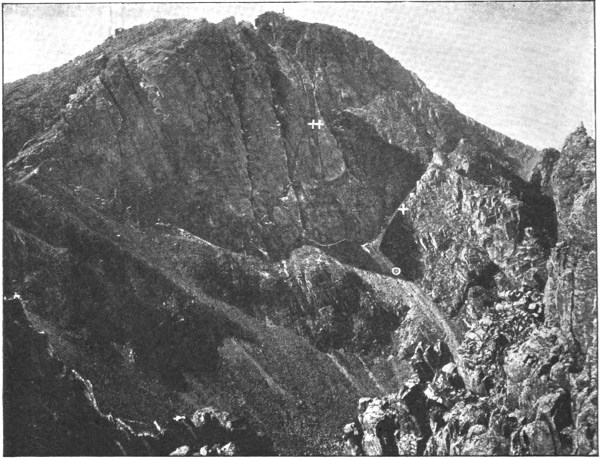
SCAWFELL AND MICKLEDORE—THE DOUBLE CROSSES INDICATE THE LEDGE FROM WHICH THE PARTY OF FOUR FELL; THE SINGLE CROSS
DENOTES WHERE PROFESSOR MARSHALL SLIPPED; AND THE CIRCLE SHOWS WHERE ALL THE BODIES, INCLUDING THAT OF MR. GOODALL, WERE FOUND.
From a Photograph.
Of the witnesses of this accident two subsequently lost their reason, and the death of another shortly afterwards was attributed to the shock. And all for the want of a little caution and forethought on a snow-slope! Still, “out of evil comes good,” and no doubt the remembrance of this terrible tragedy and its contributory cause has ultimately saved many valuable lives. Only once since then has it been forgotten in the Lake District, and this led to the last tragedy that has happened. This was to poor Alexander Goodall, a Keswick youth, who deliberately set off glissading down the snow at the top of Deep Ghyll on Scawfell.
To those of us who know the frightful velocity that is attained in a few feet on steep snow, and the long years of practice necessary to control this speed, such an act would appear quite inexplicable. But to him, whose first day on snow it was, and in entire ignorance of its insidious dangers, that downward slide would present no terrors, until, with balance gone and ice-axe snatched out of his grasp by the snow in which he wildly dug it, his mistake flashed across his mind with terrible meaning. Alas! he learnt his lesson too late; he did not live to profit by it, for his body dashed downward, crashing into the rocks as it sped, until it came to rest on the scree-slope five hundred feet below, within a few feet of the place on which Professor Marshall fell.
A short three months before this same spot witnessed the most terrible of all the Lakeland tragedies, when a party of skilful climbers fell from the north face of Scawfell Pinnacle. Even the historical accident on the first ascent of the Matterhorn, when all of a large party were killed but Mr. Whymper and two guides, palls before this home disaster, for here four Englishmen in the prime of their youth were suddenly called away.
On September 21st, 1903, Messrs. Broadrick, Garrett, Jupp, and Ridsdale started from Wastdale Head for Scawfell, intent upon climbing the Pinnacle by the difficult route from Deep 463 Ghyll. This they successfully accomplished, and afterwards redescended to the foot of the Pinnacle, where they had lunch with another climbing party, which was under Mr. W. E. Webb’s leadership.
After lunch Mr. Webb’s party bade them au revoir and went off to climb one of the cracks on the far end of the crags. After their climb they foregathered on Mickledore Ridge, and thence set off along the base of the cliff to regain their knapsacks, which had been left at the lunching-place.
As they neared the foot of the Pinnacle they heard a shout, but thought it came from the valley below. Leisurely they rounded a corner, and there, about fifty yards away, in the vicinity of the screes where they had lunched, saw four figures stretched out and lying quite still.
In a disconnected way they thought at first that these four figures were asleep, though it was a peculiar place to fall asleep in; then something unusual about their attitudes became apparent, and not till then did the awful reality flash upon them.
They tore across the rough intervening ground and made a dreadful discovery. Only Mr. Ridsdale was alive, and even he was obviously too terribly injured to recover. As they approached he raised his head. “I’ve been shouting for hours,” he murmured. “I’m afraid the others are all gone, but look after them and don’t mind me.” As he feared, they were past human aid, and death had evidently visited them with merciful swiftness, for their bodies were already cold.
It was now nearly six o’clock, and little could be done for poor Ridsdale, but Mr. Webb and another of his party stayed with him whilst the other ran down to Wastdale for help.
From that time until nearly ten o’clock they did all in their power to alleviate the sufferings of the survivor, who was in great pain. Darkness set in before seven o’clock, and their lonely vigil, with the wind sighing weirdly through the crags above their heads, their three erstwhile friends lying dead around them, and poor Ridsdale moaning and but half conscious most of the time, must have been an awful experience. The remembrance of Ridsdale’s heroic appeal to them to tend the others before him, and afterwards the manly efforts of Mr. Webb and his friend to help and sustain their dying comrade in such awful circumstances through those long, dark hours of waiting, must ever linger with pride in the hearts of all true Englishmen. We may be a degenerate race; but, if this Scawfell tragedy has done nothing else, it has proved that there are still men amongst us.
Little more remains to be told. The rescue party arrived through the darkness with a stretcher, and by the light of the lanterns, after strenuous labour and weary suspense, succeeded in conveying the survivor downward over the rough stones and shale, only to find, alas! that their effort was in vain, for their burden expired about an hour before they gained the shelter of the inn.
From what Mr. Ridsdale let fall in his delirium, and by an investigation of the face of the Pinnacle from which the party fell, it was not difficult to reconstruct their doings before the accident. After Mr. Webb’s party had left them they started up the north face of the Pinnacle, a climb that had not hitherto been accomplished, with Mr. Broadrick leading. He must subsequently have relinquished it, however, for their position on the rope when found showed that Mr. Garrett had taken over the lead. From a narrow ledge about two hundred feet up the sheer rock-face Mr. Garrett slipped, and the others, not being well placed to sustain a shock, were plucked one after another from their holds and dashed to the screes below.
Apart from Mr. Garrett’s slip, there were two prime contributory causes of the accident. The first was the perseverance of the party beyond where good anchorage (a place where the leader could be checked by the rope in case of a slip) was obtainable; and the second was in not turning back and abandoning the climb when Mr. Broadrick, by far the most experienced and careful man in the party, gave up the leadership.
It is easy to be wise after the event, but similar circumstances may arise some day on another climb. If the Scawfell Pinnacle disaster and its lesson are then recalled, it may be the means of working the salvation of future climbers, and the loss of four valuable men, plucked off in their prime, may not have been in vain.
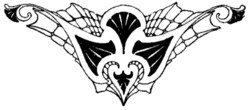 464
464
The man who interferes in the love affairs of the passionate, hot-blooded people of Central America is likely to find he has stirred up a veritable hornets’ nest, and will be lucky if he escapes with his life. Such, at least, was Dr. Coleman’s experience in Salvador, but fortunately everything ended happily for all concerned.

Those readers of The Wide World who are familiar with my former narrative, entitled “Fallen Among Thieves,”1 will remember that my object in going into Central America was for the purpose of practising dentistry.
1 See April, 1908, issue.—Ed.
While actively engaged in my profession in the Salvadorean city of Santa Ana, the following series of incidents occurred, which served to put a great deal of excitement into what might otherwise have been a somewhat humdrum existence.
Before going farther it is necessary that the reader should understand some of the characteristics of the Salvadoreans, who are descendants of the ancient Spanish adventurers, with an admixture of native blood.
The women, in my humble opinion, are for intelligence, character, and beauty the superiors of any other nation inhabiting the southern portion of the Western Hemisphere. As for the men, the Spanish blood seems to predominate in point of passion, for, besides being the most valiant soldier in time of war of any Central American race, the Salvadorean is also the most ardent lover and the most jealously-inclined towards his inamorata of any person upon the face of the earth. That also is my humble opinion, and that I have good grounds for my statement will presently appear.
There are just two things the foreigner in Salvador must not do: he must not poke his nose into political squabbles or try to interfere in a love affair. Ten times out of ten, if you do, it will be to your very great sorrow not counting the danger you run.
Now, when the wealthy coffee-planter or “hacienda” owner has need of the services of a doctor or dental surgeon he never thinks of leaving his plantation, but rounds up his mule-train, heads it with an excellent saddle animal, sends it off to the doctor, and invites the latter to pay him a visit. Experience has taught the practitioners that these invitations are very remunerative, and when the call comes business must certainly be very brisk to warrant a refusal. I, for one, have never found it advisable to decline, and so it happened that one Sunday afternoon I received a polite note requesting me to visit the Señor Don Eduardo Castillo, owner of the immense coffee plantation known as “Las Flores.” I should mention here that I have been compelled to use assumed names, for the family concerned is one of the most prominent in Salvador, and would not care for the notoriety which the publication of their name would give them.
Next morning found me with my entire dental paraphernalia packed upon the backs of a number of mules, and myself, under the escort of half-a-dozen servants, traversing the mountain trails leading around the base of the big volcano eight miles north of Santa Ana, upon the way to the “finca” of Las Flores. The journey was made without incident, though it was far into the night before we arrived, the distance traversed being something like forty-five miles.
Señor Eduardo met me at the door, and after partaking of a late dinner, being very much fatigued, I retired to my room, which was situated at the extreme end of the immense building. In point of furnishings and size the place constituted a small palace. Indeed, the manner in which the wealthy owners of these South American coffee plantations have managed to gather the comforts of life and many luxuries at so great a distance from a seaport or railroad is perfectly astounding. They have practically every modern convenience, and many others which you or I have never been used to.
It was late next morning when I awoke, very sore and stiff from my long ride. I found, however, that I was just in time for “coffee,” which is usually served at ten o’clock. Here I had the pleasure of meeting the members of the family, consisting of the mother, an aunt, one son, and two very charming daughters, both of whom spoke perfect English, having attended a school in the City of London for several years. I decided immediately that my four weeks’ visit was going to be very enjoyable, and I flattered myself that I had made a fairly good impression upon my hosts.
Life upon the “finca” was indeed delightful. Situated as it was at an altitude of over four thousand feet above sea-level, the days and nights were exhilaratingly cool and pleasant. I soon struck up a friendship—which still lasts—with the son of the house, and we enjoyed many pleasant hours in riding over the surrounding country. To the left, adjoining the plantation, 465 was the immense cattle ranch owned by a young man named Gonzales, who, I found out later, was very much in love with the elder of Don Eduardo’s daughters, while three leagues farther on was another coffee plantation owned by an old man named Vasquez, whose son, I understood, had been paying much attention to the younger girl.
Two weeks passed very happily and speedily. Very early in my visit I became acquainted with how matters stood as regards the two courtships. The younger Vasquez, Roberto, had already proposed and had been accepted, while the other young man, Enrique, had been calling for several years—indeed, he often came two or three times a day—but as yet had never declared himself.
Being by this time well acquainted with Roberto and his betrothed, I laughingly suggested one afternoon to the two daughters and himself that it would be a good idea, as a means of finding out exactly what Enrique’s intentions were, for me to kiss the Señorita Hortensia one day when Enrique called, doing it in such a manner that the bashful lover could not fail to see, but so that his witnessing the act should appear an accident. The señorita, being full of girlish fun, had no objection, and so it came to pass that the very next afternoon, when we saw Enrique coming over, Miss Hortensia and I repaired to a very secluded spot upon the veranda, but one which was clearly visible from the road. There, in plain view of the approaching Enrique, I administered the salute—much to my satisfaction. If I could have foreseen its outcome, however, I should certainly have thought twice about my action.
Enrique saw me kiss the señorita just as he was dismounting, and, with an almost imperceptible start, he remounted his horse and galloped away. Then things began to happen. Hortensia—girl-like—retired to her room and commenced to weep, while her sister Leonia became very distant and chilly in her manner towards me, impressing upon me that if anything unpleasant occurred it would be all my fault. The only ones with whom I seemed to be upon anything like decent terms were the son and the elder people, who knew nothing about the state of miniature warfare I had thoughtlessly provoked. Dinner that evening, in consequence, was a very formal affair.
As, somewhat disconsolately, I pondered over the matter that night before retiring, I resolved to hunt out Enrique early next day, explain things fully, and endeavour to bring about a reconciliation. Having settled the affair satisfactorily in my own mind, I climbed into bed for the night, and, after reading a short while, dropped off to sleep, leaving a lamp burning at my bedside.
How long I slept I do not know, but suddenly something woke me, and I opened my eyes to behold, standing at the foot of the bed, calmly surveying my person, a disreputable-looking Indian! In his right hand he held a “machete,” or huge cane knife, about four feet long, and as I watched him he ran his finger along the edge, seemingly to ascertain whether or not it was sharp enough for the business he intended it for. Grabbing my pillow, I sprang to my feet on the bed and backed against the wall—just in time to catch a heavy blow from the machete upon the pillow, which I held in front of me as a shield. For the moment I had forgotten all about the revolver which I usually kept under my head, and which now lay exposed in the lamplight. As I reached for it the would-be assassin’s nerve failed him, and with a rush he fled out of the door. A moment later I heard him mount a horse and make off at a gallop down the road.
There was, of course, no more sleep for me until daylight. I had no doubt that Enrique, maddened by jealousy, was the prime mover in the performance, which, needless to say, upset me very badly. Nevertheless, I had resolved to see Enrique that day, and now I was more than ever anxious to clear up the unfortunate misunderstanding that had arisen. So, saddling early, I proceeded towards the cattle ranch, taking with me the boy servant who had been kindly assigned to me by Don Eduardo. When we were about a mile from the ranch the boy, to my amazement, suddenly doubled up and began to howl. Springing from my horse and running to him, I found a bullet-hole through the fleshy part of his thigh, from which the blood flowed freely. The wound had undoubtedly been caused by a high-power rifle bullet, fired at such a distance that it was impossible to hear the report. Dressing the wound as best I could, I took the lad up behind me and made for Las Flores, where I put him to bed and redressed the wound. Things were getting a good bit too lively for my liking, and I would much rather have been in Santa Ana just then than where I was. If I had not been afraid of assassination on the road I would certainly have made my departure immediately.
This second adventure, of course, caused considerable excitement in the family, as I had already mentioned my night’s alarm, and I was the object of much sympathy from the young ladies, who now began to take my part. I sent several notes over to Enrique’s place, and Don Eduardo also went across to look him up, but he was not to be found. 466
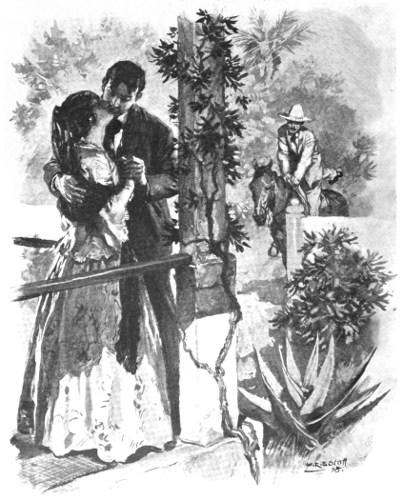
“ENRIQUE SAW ME KISS THE SEÑORITA JUST AS HE WAS DISMOUNTING.”
About this time another misfortune befell me. Roberto came over and found me holding a very earnest conversation with his betrothed. Knowing nothing of previous happenings, this fiery-tempered young man became violently enraged, and, without asking any explanation, immediately attacked me with a heavy riding-whip. We had a smart struggle, but I succeeded in wresting it from him and knocking him down with a blow from my fist. Springing 467 to his feet with a snarl, he made off as fast as his legs would carry him, leaving his horse tied to the gate. The señorita promptly swooned, and the last glimpse Roberto got of us showed me carrying the young lady in my arms into the house. I have a faint recollection of seeing him shake his fist at me and grind his gleaming white teeth.
Well, now I was “up against it” properly, with two heart-broken girls on my hands and two lovers vowing to have my life. I discussed the matter at length with Don Eduardo, explaining to him that, while I liked the young ladies very much indeed and valued their friendship greatly, I was not in love with them and had done nothing to warrant anyone in thinking I was, the “kiss incident” notwithstanding. It seemed very hard lines that I should go in peril of my life and get into general hot water through trying, by means of a harmless joke, to bring a bashful or undecided lover “up to the scratch.”
Needless to say, I was very much worried by the turn things were taking, and for several days I got very little sleep. One night, while tossing wakefully upon my bed, I seemed to feel some danger in the air, so much so that I got up and lit the lamp to get rid of the feeling of depression which seemed to overwhelm me. Lying down again, I fell into a light slumber. Presently I was awakened by something touching me upon the shoulder. Opening my eyes, I saw right above me, with his head and one shoulder through the window, the same old Indian who had previously visited me. He was trying to slip a noose over my head by means of a long stick, but the instant I opened my eyes he disappeared. A moment later the noose slipped over the bed-post, dragging the entire end out bodily and jerking it against the wall. There followed a snort and a grunt outside, and the sound of a horse dashing off.
Next morning revealed a broken saddle to which the rope had been tied, it evidently being the intention to jerk me through the window—which stood eleven feet from the ground—thus breaking my neck most effectually.
In spite of this little interlude, the night’s adventures were not yet over by any means, and I had scarcely got over this first shock when a bundle was flung through the window, landing upon the mattress by my side. Shoving it hurriedly off on to the floor, I found it contained a hissing and squirming mass of snakes, and soon the room was filled with a score or so of the vipers usually known in the medical world as “corals”—the only really deadly reptiles in that part of the country, their bite being often known to kill in thirty minutes.
As I slept some distance from anyone else I did not care to arouse the household in the middle of the night, so I spent the remaining hours perched upon a bookcase, out of reach of harm. It is needless to say that before the slaying of the reptiles was over next morning the commotion upon the “finca” was at fever-heat and no work was done at all, the labourers being dispatched in different directions in a vain effort to find either of the two revengeful youths.
At night, when no trace had been found of either of them, Señor Eduardo, greatly perturbed, dispatched a note to the nearest Alcalde for police protection. This, however, could not arrive until the second day, and in the meanwhile I also took a trip over to the two plantations in an effort to locate the belligerents and explain matters.
That night nothing out of the ordinary happened, but I took pains to fasten my room securely, and obtained a good night’s rest. Next day I again endeavoured to locate Messrs. Roberto and Enrique, but without success. The following evening I happened to be strolling up and down the long front veranda with the Señorita Hortensia, who had now become somewhat reconciled to the new state of affairs. We had stopped to look at the reflection of the moon upon a lake a mile or so down the valley, when, without the slightest warning, a figure rose silently from the shadow of a bush and hurled an immense knife directly at the young lady. The father and son, who were sitting upon the steps, saw the movement, and leapt to their feet with yells of alarm. As in the other cases, however, Providence seemed to be with us, and the dagger merely pierced the señorita’s dress, though it missed her body only by a couple of inches.
Seeing that no harm had occurred, we three men sprang forward and captured the would-be assassin just as he was in the act of flinging another of his murderous missiles at the fainting girl. It proved to be Enrique, and he put up a nasty fight before he was finally landed by the heels. At this stage Hortensia, having recovered from the shock, took the lead in the affair and immediately appropriated the prisoner to herself. When we finally got through explaining things to him, he came round completely and apologized most generously for all that he had done. That night there was much rejoicing at Las Flores, and the announcement was made that Enrique and Hortensia were to be married very shortly.
Everyone seemed to have temporarily forgotten about the Señorita Leonia and her troubles, but Enrique suddenly remembered them and volunteered to go immediately and 468 fetch Roberto. An hour later the two young men returned together, and another reconciliation took place. Don Eduardo, all smiles now, settled things for the lovers, and the billing and cooing was quite affecting. Next night a grand “biallie,” or dance, was held at the “finca,” and the whole countryside was invited. Soon after the banns were posted for a double wedding, at which, several weeks later, the girls’ brother and myself acted as “best men.” There is now a little Enrique and a little Roberto, to say nothing of a young Pablo, named in my honour, and of whom I am the proud godfather. Master Pablo little knows, however, what a time his worthy godparent had of it when he foolishly tried to adjust the love affairs of the aforesaid Master Pablo’s parents.
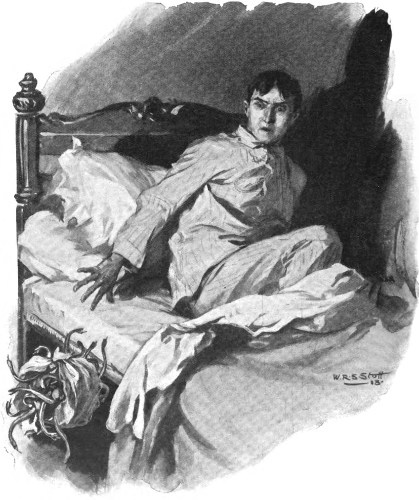
“SHOVING IT HURRIEDLY OFF ON TO THE FLOOR, I FOUND IT CONTAINED A HISSING AND SQUIRMING MASS OF SNAKES.” 469
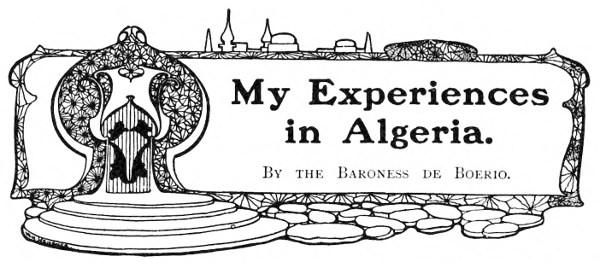
By the Baroness de Boerio.
The Baroness’s husband, an officer in the French army, was ordered to Algeria, and took his wife and children with him. There, located at a tiny post far from civilization, in the midst of fierce and unruly tribes, the authoress met with some very strange adventures, which she here sets forth in a chatty and amusing fashion.

We climbed into the regimental brake very gladly, had a good breakfast at Boghar, and then, at four o’clock in the afternoon, started for the first caravanserai, Ain Ousera, on the way to Laghouat, where we ought to have arrived at about half-past seven. However, half-past nine came, and still no caravanserai was in sight. The night was of an inky blackness, and we began to suspect that we had lost our way. My husband accordingly stopped the carriage and questioned the driver, who acknowledged that he had only been that way once before, and was not very sure of his route. In this country, where there are no roads, one always follows the direction of the telegraph posts.
“Where are they?” asked my husband.
The Spahi hung his head abashed.
“I have not seen one since it grew dark,” he confessed.
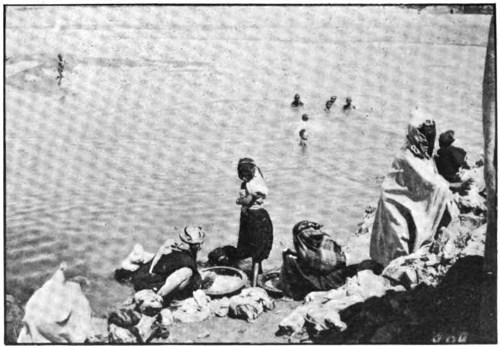
ARAB WOMEN WASHING IN A STREAM.
From a Photograph.
There was no use being angry and abusing him, so my husband set to work to gain some idea of our position. Happily we met an Arab, who gave us the indication required, and we set out again at a good pace. Whether the Arab gave us the wrong direction, or whether the driver deviated, I cannot say; but we were spinning along, making up for lost time, when suddenly the horses were flung back on their haunches and a voice yelled, “Back! Back! Malheureux!” The Spahi fortunately obeyed the command, and my husband jumped out quickly to see what new adventure had befallen us. This one, however, came very near being our last, for we had been stopped by the guardian on the very brink of a quarry! Another few yards and we should have leapt 470 into space and fallen down a precipice some thirty feet deep. My husband was afraid to trust the soldier driver any more, so he arranged with the quarry guardian to guide us, and we ultimately arrived at Ain Ousera towards 2 a.m., tired out and as hungry as wolves. We woke up the landlord and asked for beds and food. There was nothing to be had, he said, but bread, potatoes, and eggs, but we told him that would do if some strong, hot coffee accompanied it. An hour later we were all snoring.
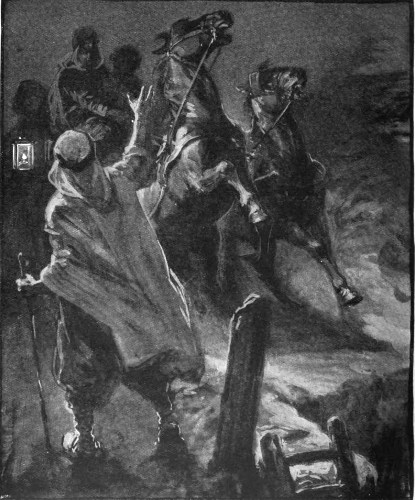
“THE HORSES WERE FLUNG BACK ON THEIR HAUNCHES AND A VOICE YELLED, ‘BACK! BACK!’”
The rest of our journey was less adventurous. At a caravanserai called Gelt Es Stel we were to send back the regimental brake and continue our road in a carriage sent by the Bach-Agha of Laghouat. We waited in vain for the promised vehicle, however, and when, on the second day, the mail and passenger coach came in, we decided it was better to continue our journey by that. The coupé—a small compartment for three in the front of the coach—was all that was available, so in we got—my husband, myself, three children, and four dogs! I shall never forget that journey. My legs were too long for 471 the space, and the cramp at last grew unbearable, while the roof was so near my head that I had to sit perfectly still, with a swanlike curve of the neck which, though perhaps very graceful, was also excruciatingly uncomfortable. No one was more devoutly thankful than myself when at last we finally reached our destination.
Laghouat, or, properly speaking, El-Aghouath, the “Pearl of the South,” as the Arabs call it, is built on and around two rocks rising out of the burning plain and cutting the oasis in two, thus giving it the form of a green horse-shoe. A small canalized stream passes between the two rocks, watering first the north and then the south oasis.
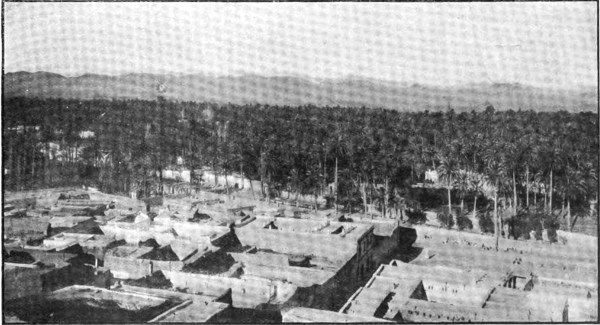
THE TOWN OF LAGHOUAT, ON THE EDGE OF THE DESERT.
From a Photograph.
From the top of these rocks the view, to the lover of Sahara beauty, is magnificent. Away to the south stretches the desert, sterile and naked, save for the tufts of vegetation here and there, yet the lights and shades of colour are so variable and rich that it is a pure joy to gaze over its infinity. On the north the undulating flatness is relieved by a low line of rocky barren hills, round the top of which is a curious dark line, which one could swear was a high-water mark. On a hot summer day these hills rise black as coal out of the flame of golden sand around them; then, as evening draws nigh, some become pale rose-colour, others deepest pansy purple, or bright ochre yellow, and all so vivid, so luminous, that the artist despairs of transferring their colours to his canvas.
Nearly all the houses at Laghouat are built of mud bricks, mixed with straw and baked in the sun. As a child I used to be very much perplexed by the Israelites’ complaint during their Egyptian captivity, “How can we make bricks, for we have no more straw?” No one could explain the matter to me satisfactorily, but now I understood. In these parts, when the earth is not sand, it is clay. This clay is well wetted and patted, in the way dear to the childish heart, and then mixed and rolled in very short straw. Afterwards it is put in a square wooden frame, well patted once more, turned out in rows, and left to bake in the sun for a fortnight. The bricks are then stacked up ready for use.
Personally, I liked these houses immensely; it was so easy to put nails in the walls solidly. As a rule, things I nail up fall down suddenly, without any warning, on some revered head—never on mine, because I take care not to place myself underneath the work of my own hands. In the Laghouat houses, however, you can plant a good long nail boldly. It enters as though into butter, you hang up your picture, or whatever it is, and then go outside and hang a pot of flowers or a water-pot on the point which has come through—and there you are, perfectly balanced on both sides! But these mud houses have one rather serious drawback. When it rains—fortunately this only occurs at very rare intervals—the buildings, unless strongly white washed, have a tendency to fall down and melt away into shapeless mud-heaps. This is all in the day’s work to the Arab, and does not upset him overmuch, unless a child—or what is to him worse, a sheep or horse—is buried in the ruins. 472 He just camps out under a camel hair tent in the highest part of his garden, or, if he hasn’t a tent, under a carpet—everyone has a carpet. Then, when it ceases raining, he serenely rebuilds. “Tu cha Allah!” he says—“It is the will of God.”
The rain-storms, though infrequent, are really terrifying when they do come. I have seen waves several feet high turning the corner of my house, and that half an hour after a downpour began. The river of sand, Oued M’zi, which becomes Oued Djdid farther on, fills with water in the twinkling of an eye, and is soon a deep, roaring torrent two miles broad; it is perfectly incredible the rapidity with which the floods rise.
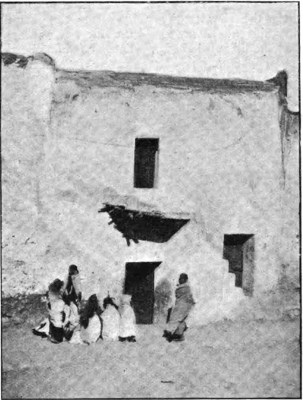
A LAGHOUT MUD-HOUSE—DURING THE RAIN-STORMS THESE
BUILDINGS HAVE AN AWKWARD HABIT OF MELTING AWAY!
From a Photograph.
This Oued M’zi is supposed by the Roman historian Juba to be the real source of the Nile. It is an uncanny river, disappearing underground at various points for several days’ march. It finally disappears altogether at Cholt Melghir, but the Roman historian points out that after twenty days’ march it reappears as the source of the Nile.
Some seven years before I arrived at Laghouat, I was informed, the M’zi rose to such a height that it bore all before it on the north side of the oasis. Men, women, children, tents, and herds were carried away for many kilometres, and the deaths by drowning numbered several hundred.
I remember once passing a night of anguish when my husband was away in the south. I had changed my house during his absence and taken a smaller one, with a huge garden, in the north oasis, some hundred yards from the river. The autumn rains began, and soon my garden and outer court were under water. The river came thundering down, and the mud house seemed to quiver. Towards ten at night the sound of the swift-rushing flood grew so terrific that my heart almost stood still, and I remembered the catastrophe of seven years back. “Why, oh, why did I leave our solid stone house to inhabit this dangerous hole?” I asked myself.
I tramped across the court, knee-deep in water, to my Arab servant’s room.
“Mohammed,” I cried, “come with me to see if the pathway to town is in a good enough state to take the children to the hotel. The water frightens me; we shall be drowned like rats in a trap.”
We tried to open the garden door giving on the wall-lined pathway along which the irrigation stream ran, and which was the only road to the town for the houses or gardens of the northern oasis. The door opened outward, and fortunately for us the pressure of water against it was so heavy that our united strength could not move it half an inch.
Mohammed accordingly climbed on the wall and looked down. The water was nearly six feet deep! He descended hastily, observing calmly, with a critical look at the wall, “It’s a very old wall. It must be the will of Allah that it does not fall.”
There was obviously nothing to be done, so I retired indoors and changed my clothes, for I was soaking wet. The waters thundered and swirled all about us, and I was thankful indeed when daylight came and the flood gradually began to subside.
The women of Laghouat never go out by day, and at night are closely veiled as they journey under escort from one relation’s house to another; even the lower classes and the dancing women faithfully observe this custom. Only on two feasts, which last three and seven days—the “Aid el Srir” and “Aid el Kebir,” the “little” and “great” Feast of the Sheep, which correspond with the Jewish Passover and killing of the Paschal lamb—do the latter ladies don their finest clothes and strut about barefaced.
Their costumes are indeed splendid—silks and brocades of the very best quality and the most lovely hues, with gold, silver, and gem-studded 473 embroideries. The veils hanging from their bejewelled head-dresses are of cloth of silver and gold, their bosoms are covered with precious stones, and the noise of the numerous bracelets they wear on arms and legs can be heard some way off.
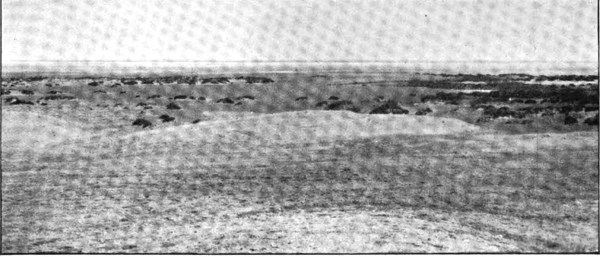
A SCENE IN THE SAHARA.
From a Photograph.
The dancing women of the province of Algiers and Oran are nearly all of the tribes of the Ouled Najls. The women of these tribes have chosen dancing as their profession, and when quite young they go forth to earn their dowry by “tripping on the light fantastic toe.” When they have earned it they generally return home, marry, and make as good wives and mothers as the rest of womenkind.
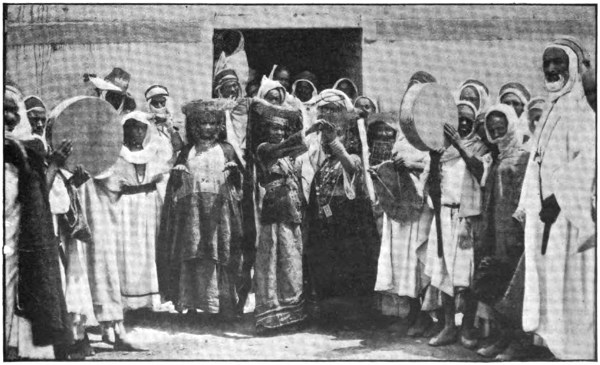
A GROUP OF DANCING GIRLS OF THE OULED NAJL.
From a Photograph.
There are now about thirty-eight tribes of Ouled Najls, stretching from Biskara to the Djebel-Amour, all pastoral, wandering wherever the blessed rain of heaven falls and grasses grow, without taking any notice of distance or frontiers. The supreme happiness of a Najl is to find a quiet corner where the grass is green and abundant, and there to snooze under the sun’s rays, watching his sheep and camels fatten, 474 and fattening himself as well, for he lives chiefly on their milk. Later he exchanges his flocks for corn, dates, and everything necessary for his existence. Truly these people are still in the age of Abraham.
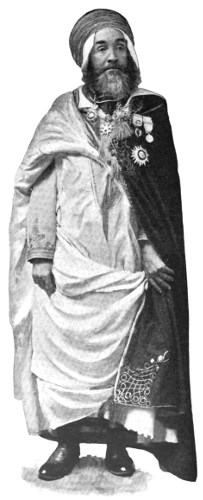
THE BACH-AGHA OF THE LARBAAS, AN IMPORTANT ARAB CHIEF.
From a Photograph.
A fortnight after I arrived at Laghouat the Bach-Agha of the Larbaas (a tribe of warriors who have always been faithful to France) gave a “diffa” in our honour. Warned by my experience of painful memory at Teniet-el-Haad, I did not try to partake of all the twenty-five dishes which were served in weary succession. After the repast was over we paid a visit to the chief’s two wives. The favourite, a young woman of twenty-four, was most beautifully dressed in eau-de Nil brocade. The costume was that of the Algiers women, full trousers closing in tightly round the small, silk-socked, golden-slippered feet. Then came a three-quarter skirt of the same material and a much-embroidered tight-fitting bodice. The front of this latter garment was so covered with jewels that the stuff was hardly visible. The head-dress was composed of silk handkerchiefs and chains of gold and precious stones. She had two children, a boy of eight and a girl ten years old. She told me she was very happy, that she had been married to the Bach-Agha since she was twelve years old, and that he had only beaten her once, when she had broken one of her pieces of jewellery in a temper. She showed us the very piece, with much laughter—a big, finely-worked gold filigree disc.
“You did not laugh so loudly when you felt the matraque on your shoulders,” said a grim voice behind her.
Without another word she pulled one of her handkerchiefs over her face and stood motionless. It was now our turn to laugh, which we did heartily, for we had seen the Bach-Agha come in, and had understood his sign for us not to betray him.
After teasing her a little the good old man—he was sixty—told her to unveil, but not to boast too much of her one beating, or he should have to make it two.
We much admired the beautiful carpets and embroidered cushions on the marble floor, and the handsome silver and brass jugs, cups, and plates which adorned the Arab brackets, but we thought the four-poster bed, with white muslin curtains, which stood in the far corner, rather out of place.
The young wife’s apartments consisted of two big rooms, about fourteen yards long by four wide, both leading out into a big square court with pink marble 475 pillars, where palms and various other exotic plants flourished. In the centre was a fountain where goldfish glinted.
Then we went to see the other wife, old, like her husband. Her room was big, her bed comfortable, her clothing good, but everything was of the simplest. Her only jewel was a tiny gold brooch fastening a drapery drawn round the head under the chin. She seemed too weary to talk.
“Life is over for me,” she said. “My children are dead; my husband has not spoken to me for years. I, too, shall soon be gone.” And she clacked her tongue in her cheek in a dismally resigned fashion. I felt heavy-hearted as I went out.
“How sad!” I said to Ben Aouda, one of the Bach-Agha’s three grown-up sons. “I thought she was your mother.”
“My mother and my brothers’ mother has been dead a long time,” he replied. “That one”—and I distinguished a shade of contempt in his voice—“only gave my father daughters—feeble creatures who died young.”
If an Arab woman wishes to retain any power she may ever have had over her husband, she must first be a mother, and, secondly, the mother of male children, strong and lusty. There are, of course, exceptions; I knew of one at Laghouat later. The two longed for a family. They made pilgrimages to all sorts of outlandish places. In accordance with Arab superstitions, the husband tore the still-throbbing heart out of countless jackals’ palpitating bodies and devoured it warm, while his wife wore all sorts of horrible fetishes round her neck and drank the blood of hyenas. It was all of no avail, but despite the advice and worrying of his family he refused to divorce her or to take another wife, as the law allowed him. But he was a very rare exception to the general rule.
Besides the Bach-Agha’s, I used to visit at the rival house, where lived descendants of other rulers of Laghouat. Here I was often amused by the harmless little intrigues I came across. The master of the house possessed three very pretty and very young wives, ruled and guarded by his mother—one of the jolliest, gayest old ladies I have ever met. She was always draped in a spotless fine woollen melhafa, bordered with green.
It was extraordinary, seeing the secluded life they led, how familiar these young wives were with Laghouat society.
Peeping through their closely-latticed window, looking on to the road, they would say: “Ah! there goes Lieutenant This, or Captain That,” and then they would tell me stories concerning these officers that I had no idea of, and enjoy my surprise.
“We may be shut up, but we know everything that goes on and have plenty of fun,” they would say. One day when I arrived, however, I found their harmony disturbed. Zohra, an Algiers Moor, kept apart, silent and sullen, darting looks of hatred at Aicha, who was happily nursing her lately-born son.
Hennia, the youngest, following my gaze, whispered: “She is mad with jealousy because Aicha has a son, and our lord is pleased with Aicha and angry with Zohra, who has been four years married and has given him no offspring.”
“And you?” I inquired.
She shrugged her slender shoulders. “It is only six months since he brought me to his house, and the last wife is never the least until many moons have waned.”
Worried by Zohra’s look I returned shortly, but she sullenly refused to speak to me. Then, suddenly, one day as I was leaving, she ran after me and drew me aside. “I hate her! I hate her!” she panted. “She has stolen his love from me. Help me, O Roumia, help me, or I shall die.”
“What can I do for you?” I inquired, rather upset by her burning gaze and passionate whisper.
“Bring me the little white powder,” she breathed, “the dear little powder, to sweeten her coffee and make her sleep, sleep, sleep!”
She seized my wrists and held me fast, her eyes blazing like those of a madwoman.
“To do evil that good may come” is not usually one of my principles, but on this occasion I thought it excusable. So I promised her the powder, and, what is more, I took her not one, but two! One, for her rival, was composed of chalk and sugar, and the other, for herself, of Epsom salts.
“For these powders to have any effect you must take another at the same time,” I told her, impressively. “If Aicha has really stolen your share of your lord’s love from you she will surely die; but if you have accused her wrongly, then you yourself will be the one to suffer. You will not die, but you will suffer.” She eagerly agreed—and she certainly suffered, too; but her jealousy was effectually cured, and my next visit found the trio reunited and full of their usual light-hearted tittle-tattle. When I told the story to the husband he laughed as Arabs seldom laugh.
“For ways that are dark and tricks that are vain,” says Bret Harte’s famous poem, “the heathen Chinee is peculiar.” The subjoined examples of clever rascality, however, show that the Celestial has by no means a monopoly of the gentle art of living at other people’s expense.

It was on the first anniversary of the great earthquake that I found myself in San Francisco. The city was a forest of scaffolding and steam-cranes; huge blocks of stone and concrete hung suspended above the streets on their way to clothe the towering “quake-proof” steel frameworks that rose from the débris of former buildings like gigantic skeletons. Hills of bricks, mortar, and plaster confronted the pedestrian at every turn, and the dust from these and the streets generally made the city a blinding, choking wilderness.
The demand for labour in rebuilding had drawn to San Francisco the very dregs of humanity throughout the Americas, and strikes, street riots, and robberies with violence were of daily occurrence. The authority of the police was a sinecure; fat, good-natured giants in white, uniforms and helmets, with truncheons swinging from their wrists, leant against hoardings at street corners and smoked cigarettes, or earnestly requested a striker who became more than usually vociferous to “Cut it out” or “Go way back and sit down.”
It appears that in “’Frisco” the cheapest way of living is by drinking, for by buying five cents’ worth of inferior beer one is entitled to eat at a “free lunch counter” adjacent to the bar and have a cut from the joint and cheese and biscuits ad lib. To a world-wanderer like myself, whose income was, to say the least, precarious, this was a great institution; and it was at one of these counters that I met a would-be guide, philosopher, and friend in the form of a gaunt youth who, after a brief exchange of civilities, professed the desire to show me a little of ‘Frisco under-life—at my expense. He promised me Chinese opium and gambling dens and orgies in subterranean dancing-halls, with attendant excitements undreamed of by my prosaic mind.
Such an appeal to the adventure-loving spirit that lies hidden in most of us was irresistible. I closed with the offer, and after investing in a cheap revolver, that was quite as likely to hurt the man behind it as the one in front, we set out for the less frequented parts of the city. Down by the docks the streets were dark and deserted, and my guide improved the occasion by relating the various “sand-baggings” and assaults that had distinguished the quarter during the past week.
The only lighted shop we passed was a small tobacco booth, where I stopped to buy cigarettes. This could hardly have taken me more than two minutes, yet when I stepped out into the street I found my unfortunate guide lying face downwards on the pavement, with a thin stream of red creeping from his forehead towards the gutter. For a brief moment I thought he had fainted; then I saw his clothes had been rifled, and, glancing up the street, discerned the dim outline of three dark figures trotting silently and apparently without haste into the gloom.
A wave of anger took possession of me; the 477 cowardly assailants evidently thought they would get off scot-free after an easy and profitable night’s work. I longed to give them at least a scare for their money.
Leaving my companion, still insensible, to the care of the tobacconist, I dashed up the street in pursuit. My footfalls echoed along the deserted thoroughfare like rifle-shots, so I hastily discarded my boots and continued the chase in socks.
Rather to my surprise I soon came in sight of the three figures in front, who had now dropped into a leisurely walk. This confidence in their security for some reason angered me the more, and in the deep shadows of a wall I crept nearer and drew the revolver from my pocket.
I had never shot a man in my life, and for the first time I experienced the dread of doing this in cold blood. Then I remembered my companion’s gaunt figure prone on the pavement, and the fact that but for a packet of cigarettes I should have certainly shared the same fate. I fired—low down.
The men scattered like startled rabbits; two darted down by-streets on opposite sides of the road, while the third took an abrupt seat on the pavement and examined his leg, evidently more concerned about his wound than the chances of escape.
As I rushed down the turning to the left I sighted my second quarry scrambling over a mound of bricks; he turned and saw me at the same instant, and then began a chase and obstacle race combined under conditions that are probably unique. Over mounds of sand, lime, and broken brick; through mazes of scaffolding, barrels, planks, and wheelbarrows, pools of muddy water, and quagmires of soft mortar we went. My bootless feet were soon battered and bruised, but the fever of the chase was in my veins, and as long as my quarry was in sight I felt incapable of abandoning the pursuit.
The fugitive was now hardly thirty feet ahead, and I dashed after him round a corner of scaffolding, confident that I had run him to earth; and I did, but not in the way expected. He had crouched low just round the corner, and, unable to stop myself, I fell headlong over his body. It was an old trick, and I scrambled to my feet anathematizing myself for a fool, but my man had vanished. With slightly cooler blood and a bruised head I had just decided to leave matters where they stood, when I heard a gentle rasping, and looked up to find him clinging to a scaffold-pole above my head. I could see his white face looking down at me.
“What are you going to do about it?” he demanded, breathlessly.
“Come down and you’ll see,” said I, sternly.
When at last we stood facing each other, however, I found myself at a loss. He was a mere boy, with a wizened, old-young face and cunning eyes that took me in from hatless head to socked feet with a callous insolence that rather appealed to me. What was I going to do about it? The police of San Francisco were either asleep or smoking cigarettes in more salubrious quarters of the city; and it was next to impossible to give him in charge, so I took the law into my own hands.
“Hand over what you took,” said I, “and you shall go.”
“The others went through him,” he replied, sullenly; “I don’t know how much they got.”
“Shall we call it twenty-five dollars as a minimum?” I suggested.
His face expressed neither approval nor dissent, but he drew from a ragged pocket a large gold watch.
“Guess that’ll cover it,” he said, coolly, and on examination I found that it did, by fully another twenty-five dollars.
When, after considerable difficulty, I found my way back to the tobacconist, my companion had recovered consciousness and, with a bandaged head, sat up to hear my report.
“How much did you lose?” was my first question.
“Nothing,” he said; “I haven’t a cent in the world.”
“Then here’s something to be going on with,” said I, and handed him the watch.
After the foregoing, it is with some reluctance that I relate what happened two days later, but the experience is so typical of San Franciscan under-life that I can hardly allow it to pass unrecorded. My own part in the affair was entirely reprehensible, and I need say no more, for everyone knows that, while confession may be good for the soul, it is rarely compatible with personal dignity.
I wished to go to a certain theatre, and asked the way of the first pedestrian I met. He smilingly informed me that I was going in precisely the opposite direction, and that, as he happened to be passing the doors himself, he would show me the way. During the next five minutes I learnt that my guide was also a stranger to San Francisco, and that he had come from Canada. As I had lived there myself for four years this supplied a connecting link in our reminiscences, and we entered the first bar to improve the occasion. He certainly knew the Canadian prairie like a book, and his anecdotes of ranch and bush life were so interesting that the theatre was soon forgotten and we settled down for a chat. 478
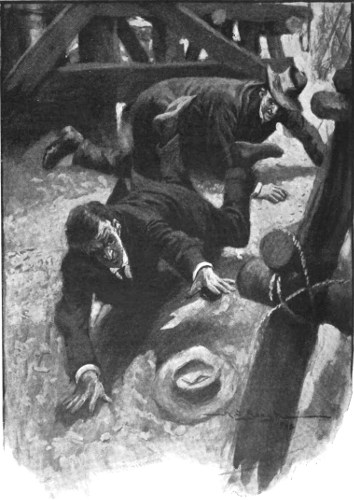
“UNABLE TO STOP MYSELF, I FELL HEADLONG OVER HIS BODY.”
It appeared that he had tired of the rough life of the plains, and after a course of study had become a telegraph operator in Denver.
While there he had been approached by a gang of wire-tappers2 with a view to his becoming a confederate, but he had refused. A few weeks 479 later he heard of their capture, and went to see the trial and conviction of the entire gang.
2 Those who intercept telegraph messages by establishing secret connections on branch wires, thus gaining news of races in advance of the general public.
Now, however, they were again at large, for he had recognised their leader that very day in the streets of San Francisco, and without a doubt he was engaged in his old nefarious business.
My companion’s idea was to make a round of the city pool-rooms, where they received news of the races by wire, and, if he encountered the “wire-tapper,” force him by threats of exposure to divulge what horses he was going to back. “There might be some brisk fun,” he said. “Would you care to come and see it?”
This appealed to me rather more than the theatre, and we accordingly started a careful tour of every pool-room in the city. They were dark, dusty places, swarming with a heterogeneous collection of humanity that ceaselessly shuffled and elbowed round boards bearing notices of the odds and winners, while a sleek gentleman in faultless attire stood on a rostrum at the end of the room and acted as “bookie.”
The fruitlessness of my companion’s search was growing a trifle monotonous, when, on entering the fourth of these rooms, he seized my arm and nodded in the direction of a tall, stout man who had emerged from the crowd and stood counting over a large roll of bills. At last he seemed satisfied, slipped an elastic band round the roll, and strode out into the street.
“Come on,” whispered my companion, excitedly; “that’s my man.”
Not far from the door he tapped the stranger on the shoulder. The tall man faced about with surprising swiftness.
“What do you want?” he snapped.
“I know all about you,” said my companion, evenly.
The collapse was sudden; the tall man’s jaw dropped perceptibly.
“Come farther away and I’ll listen to you,” he said, with a furtive glance at the pool-room doors.
Round a quiet corner my companion stated his business, and the wire-tapper brought out his roll of bills and fingered them feverishly.
“This is blackmail,” he whined; “but how much do you want?”
“It’s not blackmail, and I want none of your money,” protested my companion, indignantly. “All you have to do is to take my money and place it on the right horse. Here are ten dollars for a start. I shall watch you go in and come out of the pool-room from this corner.”
The wire-tapper had hardly left us when a little boy of thirteen or fourteen ran up to him with a note; then he disappeared through the swinging doors.
Presently the wire-tapper came out and, without a word, counted thirty dollar bills into the other’s hand.
“The price was only two to one,” he explained, apologetically.
“Never mind,” said my companion; “better luck next time. Just place this thirty dollars for me, and that will do—for the present.”
The process was repeated, and this time ninety dollars changed hands; but the wire-tapper was evidently nervous and anxious to be gone, and when my companion tentatively suggested a third attempt he refused point-blank, on the ground that if he won any more that day it would arouse suspicion. This objection, however, was overruled by the other offering to place the money himself.
“And we’ll make the amount worth while; shall we?” he added, turning to me. “Do you feel inclined to join me in a hundred-dollar bet?”
Fifty dollars meant a good deal to me then, but the two or three hundred it would bring in meant a great deal more, so I took the plunge. After another note had changed hands between the wire-tapper and the boy, he told us to back Rough Diamond for the next race, and threw in fifty dollars as his own stake; then we took up our position on the opposite pavement and waited expectantly.
To my surprise my companion soon appeared and exultantly informed us that he had succeeded in placing our stake on Rough Diamond to win at three to one.
“To win?” roared the wire-tapper.
“Yes, to win,” retorted the other, feebly.
The wire-tapper literally danced on the pavement.
“You fool!” he spluttered; “I told you to back the horse for a place this time—it has come in third.” He turned to me. “Didn’t I say for a place?” he snapped, vehemently.
But I took no further interest in the proceedings. In Western parlance, I had been “done brown.” The men were confederates, and all that was left for me to do was to swallow my medicine without grimacing. So I smiled blandly, congratulated them on their acting, and left them to marvel at man’s credulity.
It all sounds very foolish and easy, set down in black and white, but the San Franciscan “confidence man,” by long and unhampered practice, has reduced his methods to a fine art; and although it is hardly likely that any respectable, level-headed reader of The Wide World would fall a victim to his wiles, such a thing has been known to occur to others, and if the foregoing personal experience helps to put these on their guard, the purpose of its recounting will be served. 480
In November of the year 1885, when I had reached the mature age of seventeen, I found myself in Glasgow, my native city, in the service of an uncle of mine named Mr. James Thomson, who was a merchant tailor and Colonial outfitter in Hope Street.
One afternoon towards the end of the month my uncle gave me instructions to call at the offices of a well-known firm in the neighbourhood of Jamaica Street.
I was to collect an account, whose total represented a substantial sum, and give a receipt for the money. There would, I was told, be no difficulty about drawing what was due, as the firm in question had duly intimated to my uncle that if he would present the account on a certain date payment would be made then and there.
It was close upon three o’clock when I put in an appearance at the counting-house of the firm, taking up my position in a somewhat extended queue of clerks and others who had arrived on the same errand as myself.
The queue was arranged in single file along a passage of considerable length on the second storey, to reach which a flight of something like a score of steps had to be ascended.
Right away at the far end of this passage was what had all the appearance of a railway station booking office, where, behind a square aperture of limited dimensions, stood the sharp-witted cashier.
I took my turn with the rest, and in due course found myself in front of the pigeon-hole, where I presented my uncle’s account.
“All right; receipt it,” exclaimed the cashier, as he returned it.
I did so, receiving the amount of the account in Bank of Scotland pound notes, a couple of score of them, or more, which I quickly folded into a kind of roll and thrust deep into my trousers pocket, keeping my hand over them for safety’s sake.
Pleased with the thought that I had got the money, I briskly threaded my way among the nondescript crowd in the passage, and even more briskly negotiated the stairs.
I had scarcely walked the length of the side thoroughfare which led into Jamaica Street, however, when I heard hurrying footsteps behind me, and, looking round, was surprised to see a very stylishly-dressed man, whose appearance was enhanced by his faultlessly-groomed hair and moustache. As soon as I looked in his direction he held up his hand and beckoned me to stop.
Wondering what he could want with me I obeyed without further ado, waiting for him to come up with me.
“Excuse me, sir,” he said, with much politeness, at the same time slightly raising his hat, “but I believe this is your handkerchief.” As he spoke he swept round his hand, which he had held behind his back, and displayed to view a blue silk specimen in the handkerchief line. It was mine; there was no doubt about that, and as I advanced my hand he extended it towards me.
“I saw you drop it as you came down the stairs of Messrs. ——’s office” (mentioning the name of the firm), he explained.
I thanked him and was about to resume my way when he asked if I could direct him to Hope Street.
As everyone who knows anything about Glasgow is aware, it does not take long to reach Hope Street from Jamaica Street, and I was beginning to explain this to him when he cut me short with the remark that before we went any farther I must have a drink with him. As I was a teetotaller, however, I promptly declined his proffered hospitality, and once more resumed my walk.
The next moment he laid a daintily-gloved hand on my shoulder, and, with an engaging smile, said, with the utmost good humour, “But surely a glass of lemonade or ginger-beer cannot do you any harm?”
There was a strange magnetism about the man which carried me away, and I meekly surrendered myself to his will.
“Let us turn up this street,” he said, suddenly. “I know a nice little quiet place where we can have a drink in comfort.”
I followed him. Strange as it may seem, I was for the time being incapable of resistance. Perhaps my new-found friend was a hypnotist, or something of the kind; if he did not actually possess occult powers, he certainly had the gift in a very marked degree of ingratiating himself with strangers.
As we walked along side by side he kept up a lively and interesting conversation, touching lightly upon a variety of subjects. He evidently possessed a well-stored mind, for his fund of knowledge and anecdote seemed almost inexhaustible.
I became so interested in what he was telling me—wonderful adventures he said he had had in South America, and a graphic description of how diamonds are found—that I did not notice 481 where I was being led. All I know is that we traversed street after street, until at length the man whom I had offered to guide to Hope Street had taken me to a part of the city in which I never remember having previously been.
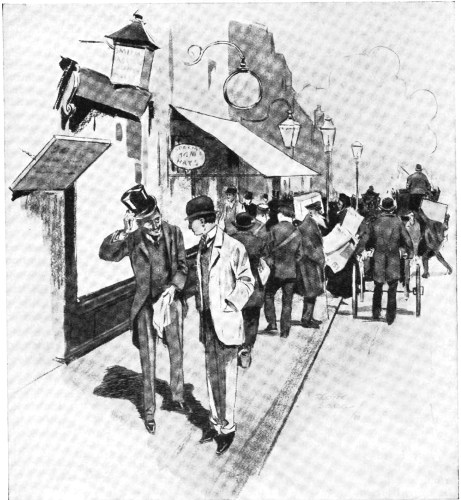
“’EXCUSE ME, SIR,’ HE SAID, WITH MUCH POLITENESS, AT THE SAME TIME SLIGHTLY RAISING HIS HAT, ‘BUT I BELIEVE THIS IS YOUR HANDKERCHIEF.’”
Then suddenly he halted in front of a most respectable-looking whisky shop—in England we call them public-houses—situated in a broad thoroughfare, busy with plenty of pedestrian and vehicular traffic. It did not strike me as being a particularly “quiet” place; in fact, whilst it may have been comfortable enough inside, its exterior surroundings were not likely to recommend it to those in search of solitude.
“Here we are, my young friend,” he said, with that smile which had now become almost irresistible to me.
The inside fittings of the place were what may be termed “flashy,” immense gilded mirrors and crimson-covered seats being the outstanding features in the general scheme of furnishing and decoration. A mahogany, tumbler-laden bar, with shelves of massed bottles in the background, ran the whole length of the apartment, whilst on the other side were a range of what I can best describe as cubicles, though in public-house parlance I suppose they would be called “snugs.” There was a door to each of these box-like apartments, though the ceiling of the saloon was common to them all. 482
“Come in here,” urged my friend, tugging at my coat-sleeve. “It will be quieter, and no one will disturb us.”
We entered the “snug,” which contained a long narrow table, with horsehair-padded seats on either side, an oblong window, half screened, serving to let in a rather subdued light.
Scarcely had I got both my feet inside when I observed with surprise that the place had already an occupant, a benevolent-looking old gentleman, who at that moment was studiously engaged in perusing the columns of a newspaper.
My companion, noticing my hesitation, exclaimed in a cheery voice, “It’s all right, my boy; I’m sure our friend won’t object.”
Looking up from his paper “our friend” adjusted his spectacles and regarded us both with a quizzical expression.
“Come in; don’t mind me,” he said at length, as if satisfied with our appearance, and we sat down at the table, my companion on one side, I on the other, the first occupant taking no further notice of us.
“I’m going to have a toothful of whisky,” said my fashionably-dressed vis-à-vis. “Will you have the same?”
I diffidently demurred at the proposal, as all alcoholic beverages were then to me as a sealed book, and in the end a bottle of lemonade was ordered for me.
And there I sat, sipping the lemonade and nervously fingering the bundle of notes in my trousers pocket.
I had found my friend very agreeable, very pleasant, and very entertaining, and would not have objected to remaining a little longer with him, but that I felt my employer would be expecting my return with the money he had sent me out to collect. Accordingly, drinking up my beverage, I presently rose and said I was afraid I must be going.
“Oh, there is no hurry, my boy,” he said, with such cordiality that I sat down again—but it should be only for a couple of minutes, I told myself.
“That’s right; make yourself comfortable, and we’ll have another drink in.”
I protested that I had had quite sufficient and that I must not linger, as I was expected back.
“A few minutes more or less will hardly make any difference,” he remarked, “and, besides, if you will only wait I shall be coming your way, for you know you promised to show me the way to Hope Street.”
I am afraid my resolutions about going were somewhat feeble, for he again persuaded me to sit down.
Meanwhile the old gentleman at the other end of the narrow table went on reading his paper. He might have had the place to himself for all the notice he took of us.
Suddenly my companion ceased speaking to me (the conversation had by some means or other turned on the subject of trains), and diving his hand into a side pocket produced a new railway-carriage key, very bright and very shiny.
I wondered what he intended to do with it, and even got so far as speculating upon whether he was a manufacturer of this class of goods, or travelled for the people who made them.
Then he tapped the key lightly on the edge of the table, and, addressing the old gentleman, said, politely: “Is this article of any service to you, sir? Excuse the apparent liberty, but I can offer you these keys at the small sum of sixpence each.”
I looked in the direction of the old gentleman and saw that he had put his paper on one side and was regarding my companion with a pleasant smile.
“I am much obliged to you, sir,” he replied, softly; “but as I very rarely travel I have no use for such a key.”
“Never mind,” remarked the other; “I’ll tell you what we’ll do—we’ll just ‘cut’ for it,” and without any further explanation at the moment he drew from his breast pocket what I took to be three ordinary playing-cards. The same pattern embellished the back of each, but when they were turned face upwards I observed that two of them were blanks, whilst on the other was a highly-coloured representation of a lady’s head and shoulders. I recollect that the hues in which the charms of this female were depicted were very varied, so that in combination they presented a dazzling picture.
Although the word “cut” had been made use of as applicable to the cards, it was rather a misnomer. “Double shuffle,” with a peculiar movement, would more fittingly describe what subsequently happened.
“Now, whichever of you two can first tell me where the lady is I will present with this key as a prize,” said the young man. As he spoke he made a pretence of shuffling the cards up in his hands, and then proceeded to lay them face downwards on the table, but before he finally allowed them to remain he exhibited the face of each card, so that I thought nothing could possibly be easier than to indicate where the lady’s head lay.
“You try first, sir,” said my friend to the old gentleman, and he singled out the card which I was absolutely certain was the wrong one, and so it was, as it turned out. 483
“Your turn, my boy,” cried the stranger, having rearranged the cards, and without the slightest hesitation I displayed the female’s head to view.
“Very good; here’s your prize,” and he pushed the key across the table to me.
“Just by way of a change, I will bet each of you sixpence that neither of you can pick out the lady’s head this time,” he said; but hardly had the words been spoken than the door of the “snug” was quietly opened and an elderly man stood framed in the open space.
“I beg your pardon, gentlemen,” he apologized; “I didn’t mean to intrude.”
“Won’t you come in and join us, sir?” cried my companion, insinuatingly. “Just a quiet little game together; only sixpenny stakes.”
“Oh, well, I don’t mind if I do,” replied the new-comer, and without further ceremony he seated himself on the other side of me and fixed his eyes intently on the cards, which the other was manipulating with both hands.
By this time the old gentleman gave every sign of being deeply interested in the proceedings, and had taken a number of sixpences from his pocket, which he placed in a little heap at his side.
The new-comer and I also produced the necessary coin and staked it on the “lady.”
The old gentleman was the first to try his luck, but he failed to locate the whereabouts of the fair one.
Then the cards were taken up and rearranged, when the new arrival had a flutter, but he likewise parted with his sixpence.
“How stupid these men must be!” I thought, as the cards were being prepared for a third set out, when, of course, I immediately spotted the “lady” and was paid over the sixpence.
“Double stakes now,” cried the manipulator.
Nothing loath, I put my shilling down, and again I was the only victor.
Well, to cut a long story short, my companion went on doubling the stakes until they stood at sixteen shillings. Up to now I had been the only winner. I had not lost a single penny; as a matter of fact, I was fifteen and sixpence to the good, but when I tried to find the “lady” when the stakes stood at sixteen shillings I signally failed, and had to pay over all my winnings, with an additional sixpence.
By this time I was fairly infected with the game, and had thrown all discretion to the winds with regard to my return to the office. I felt confident that I could win a lot of money, and up to this point had not the faintest suspicion that I was in the midst of a gang of card-sharpers of whose modus operandi of working the business I was now being given a practical demonstration. Therefore, when the leader of the coterie, the man, who had “hooked” me outside, suggested that the stakes should be thirty-two shillings I made no demur, but blindly accepted, fondly imagining that by exercising a little care in watching where the cards were placed I should be able to spot the “lady.”
“Now, gentlemen,” cried the card manipulator, deliberately holding up the picture card to our view every two or three shuffles, so that I was able to follow its fortunes with the greatest ease, “there is the lady! Just watch carefully where I place her.”
As I had been the last loser it was my turn to pick out the picture, and as he placed the winning card in the centre (I could have sworn he did) I did not hesitate to indicate my choice by at once turning it face upwards, when, lo and behold! all that met my gaze was a plain white surface. Instead of being in the middle, the “lady” was at the right of me, though how this sleight-of-hand trick had been accomplished under my very eyes without my detecting it was past my comprehension.
“Thank you,” said the swindler, suavely; “thirty-two shillings, please”; and after some fumbling in my trousers pocket I succeeded in detaching two pound notes from the roll.
“Eight shillings change,” he remarked, genially, and handed me over the silver.
Inconceivable as it may appear, it is nevertheless the fact that even this “fleecing” did not arouse my suspicion as to the bona fides of the proceedings in which I was being made the victim. Possibly I was too excited at the moment to give this aspect of the matter a thought. My chief concern just then was to recover the money I had lost—not my own money, it should be remembered, but my employer’s.
At the suggestion of the old gentleman, who had not up to the present won a penny, and yet struck me as taking his “bad luck” very philosophically, the stakes were increased to three pounds—“so as to” (I use his own ingenuous phrase) “give the young gentleman and myself a chance.”
I sprang at the bait. Indeed, I was desperately in earnest, and mentally vowed that I must win this time at all costs.
Need it be recorded that I lost?
The card on the left—my choice—was not the “lady,” and three more notes were separated from the roll in my pocket.
Then, and not till then, did the real situation dawn upon me—I was in the hands of a gang of “three-card” tricksters. I had over forty pounds, which was not mine, on me, and the fashionably-attired stranger who had ingratiated 484 himself into my good graces by some mysterious means was fully aware of that fact. The whole thing, in short, was a cleverly-laid plot to despoil me of my employer’s money.
As the full truth burst upon me I rose from my seat without a word and made my way to the door, intending to seek the landlord’s assistance.
But it was locked from outside! Bending down and applying my eye to the lock I saw the key inserted on the saloon side. This discovery I accepted as furnishing positive proof of the existence of a conspiracy to rob me. As I stood at the locked door, making up my mind that the next step should be on my part, the man who had lured me into the place plucked me by the coat-sleeve and begged me with gentle words to resume my seat and “talk matters over.”
“Give me my money back!” I cried, impetuously, pointing to the five notes which lay on the table. “It does not belong to me,” I went on, entreatingly. “It is my employer’s, and I cannot return to him without it.”
The two other confederates looked at me with sympathetic glances; then I fancied I saw an exchange of eye telegraphy between them and the leader.
“Of course, none of us want to get you into trouble,” he said, soothingly, at the same time pushing me gently back into my seat and taking his place opposite me, “but you must admit that you were willing enough to play the game. No one forced you to it, and what you have lost has been lost in square play.”
“But why is the door locked if it is all fair and above-board?” I shouted, excitedly.
“What! the door locked?” they cried in chorus, with well-simulated amazement.
“Yes, locked from outside,” I continued.
“Ah, from the outside,” replied the leader, smilingly. “That proves we have nothing to do with it. It is an accident, a mistake on the part of someone in the saloon.”
Although I did not believe a word of this, for I was now fully convinced that the landlord was also in league with these scoundrels, I made no further allusion to it, having made up my mind to a certain plan by which I hoped to regain possession of the money and make my escape from this den.
I instinctively knew that a proposal for further play was going to be made me on the plea of giving me a chance of recouping my losses, and for the purposes of the desperate plan I had decided upon this was exactly what I wanted.
“Now, my boy,” began the leader, in his friendly way, “I’ll tell you what I’ll do to give you a chance. I’ll lay you ten pounds to two pounds on the next round, and only you and I will play. You shall watch me as closely as you like, and no doubt you will win.”
“I will agree,” I assented, “on condition that the door is unlocked and the key brought inside and placed on the table.”
It was a bold move on my part, and I trembled for the answer, because upon this one point depended to a very great extent the success of the desperate plan I had thought of to escape, and at the same time regain my employer’s money.
Evidently sure of their quarry, and all unsuspicious as to my intentions, the trio at once agreed to the proposal.
The landlord was called—and bullied—the door unlocked, and the key placed on the table by my side.
Then the cards were laid out afresh, and I made another effort to “spot” the “lady,” although I was morally certain that I should fail.
I did, and handed over two more pound notes, which the dealer placed with the five others, lying loosely by his side.
In my jacket pocket I had a large sailors’ clasp knife, with a murderous-looking blade nearly five inches long, and while my vis-à-vis was picking up the cards preparatory to another deal, I having consented to play for the same stakes again, I surreptitiously got this weapon out and opened it under cover of the table.
The seven Bank of Scotland pound notes lay carelessly bunched together opposite me on the side of the table and within easy reach, whilst the door of the “snug” was but a couple of feet away from where I sat, I being nearest to it.
The next moment I saw my opportunity and seized it.
As the dealer manipulated the cards, he, as he had done all through, spread out his hand over a card for a couple of seconds. I clutched the open knife firmly in my right hand, and before any one of those present could have the slightest idea of my intentions I bounded to my feet, raised my arm in the air, and the next instant had pinned the sharper’s hand to the table with the long, keen blade!
With his scream of agony ringing in my ears, and the sight of the knife quivering in his hand photographed, as it were, upon my vision, I grabbed at the loose notes which lay in front of me, bunched them up into the palm of my hand, and, leaving the knife where I had driven it, flung open the door of the “snug” and bounded through the saloon and out into the busy street. 485
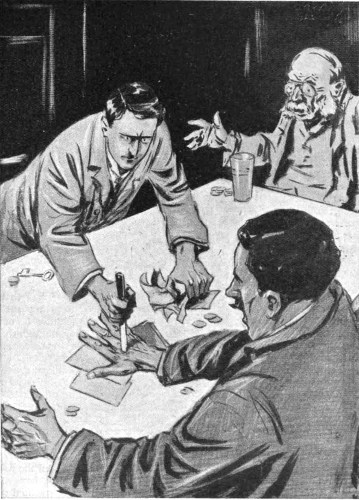
“THE NEXT INSTANT I HAD PINNED THE SHARPER’S HAND TO THE TABLE WITH THE LONG, KEEN BLADE!”
Though the recital of this incident occupies some little time in the telling, it was all accomplished in the space of a few seconds, and as soon as I found myself mixed up with the traffic outside I considered I was safe from pursuit—if, indeed, it had ever been likely any attempt would be made by the sharpers to run me to earth.
I reached my uncle’s place of business an hour or two later than I should have done in the ordinary course, but gave some plausible excuse for my delay.
He was inclined to be angry at first, but as I produced the money all right he did not pursue the matter further, although it was not until a considerable time afterwards that I ventured to give any of my relations an account of my exciting adventure with the card-sharpers.
The simple-minded and innocent Britisher may, on his first trip to the States, now and then walk into a very pretty little trap, neatly and carefully planned, like the web of the wily spider in wait for the inoffensive, curiosity-prompted, blundering fly. 486
I suppose I must have a somewhat unsophisticated aspect, which disguises all my dark and deep wisdom, and this appearance caused me to be selected as the victim of the little adventure I am going to recount.
It was at the close of my first visit to the States, and the day previous to my embarking for old England—all my business finished, and nothing to do but to say “Good-bye” to my friends and take a last look round.
I left the Astor House, valise in hand, and walked to the steamer Teutonic lying alongside the wharf, ready to sail for Liverpool on the following day. Having put my bag in my state-room, I strolled into Houston Street with the intention of getting on a cable car for the Broadway, where I was to lunch with a cousin. No cable car being in sight, I leisurely lit a cigar and turned round to inspect the goods in a store window. I had not been gazing therein more than a moment when I heard a buggy drive up and stop behind me, and someone shout, “Hey!” I paid no attention, being almost a stranger in New York, and not supposing that the call was addressed to me, especially as Houston Street is one of the most crowded thoroughfares in the city.
The call was repeated, but still I took no notice. When I had finished my inspection of the window I turned round, and to my astonishment saw that a respectable-looking man in the buggy was endeavouring to attract my attention. I went up to him and asked what his business was with me; he replied that he wished to know if I could tell him when the steamer left for England. “Do you mean the Teutonic?” I said, and he answered, “Yes.”
“To-morrow morning at seven,” I replied. He thanked me, and was just whipping up his horse to drive on, when he suddenly pulled up again sharply, and said:—
“Excuse me, sir, but the reason I asked you about the steamer is that my guv’nor told me to try to find a respectable old gent who was sailing in the boat for England, and ask him if he would mind looking after his nephew, who is a boy of ten.”
“I hope you’ve found one,” I told him, smiling.
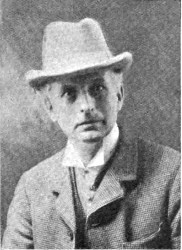
MR. ALBERT E. MACGROTTY.
From a Photograph.
“I’ve come across no one, except yourself,” replied the man.
“Well,” said I, “as the boy is going over alone, if your master will bring him on to the steamer I will look out for him, and endeavour to keep an eye upon him during the voyage and make the trip pleasant to him.”
He thanked me most effusively, and said he was sure that I would be the right person to look after the boy, adding that his master would not think of giving me this trouble unless I would consent to receive payment, say a hundred dollars. I was taken aback by this latter suggestion, and rapidly came to the conclusion that the man’s so-called “guv’nor” must be one of the sharpers of New York. Up to this time, I must acknowledge, I had fully believed the fellow’s statements to be genuine.
I replied that I could not accept any such payment for the little I could do for the boy on the ship, whereupon the man again thanked me warmly, and asked me if I would come to his master’s house in order that he might introduce me. I declined; but, seeing no cable car coming along, it flashed across my mind that I would make use of him a little, so I asked which way he was driving, as I wanted to get to the upper end of Broadway.
“Jump in, sir!” he cried, whereupon I thanked him, and accepted the invitation.
I should not, of course, have done this had I not been fairly well acquainted with New York and able to tell that he was taking me in the right direction. We drove rapidly, and his conversation was clever and amusing. He asked me if I knew California?
“Yes, I have just come from there,” I told him. He seemed greatly pleased at this. Did I know Governor Stanford? I had not that pleasure, though I knew him well by name. My driver said that he was sorry for that, as the Governor was a relative of his master’s.
By this time we were in the Broadway, close to my cousin’s office, and seeing this I asked the man to pull up, but he begged me to go on and see his guv’nor, as it was only one block farther.
I still had half an hour to spare before lunch, and, though my suspicions were now thoroughly aroused, some impish spirit prompted me to 487 “see the thing out,” so I said, “Very well, drive on.”
The man pulled up at the end of the block, and fixed his horse to the halter found in all New York streets for that purpose. I jumped out and we entered a stable, I taking care to keep close to the large open door. Needless to say, I scrutinized the floor closely and rapidly for trap-doors, but none appeared. My companion asked an ostler, who was rubbing down one of several horses, if the “guv’nor” was in. The man said “no,” but he would be back in a few minutes. I then informed the driver that I could not wait, and had better see him in the morning on the steamer.
“One minute,” replied the fellow; “if you will be good enough, I have only to go to No. 4, and will bring my guv’nor back with me.” With that he disappeared.
While we waited the ostler made one or two friendly remarks concerning the weather, and a moment later a gentleman, attired in a very handsome fur-lined coat, silk hat, and kid gloves of a light and delicate tint, walked into the stable from the street outside. My late companion followed, and, addressing me, said: “This is Dr. Coombs, sir,” observing to the doctor that I had offered to look after his nephew on the steamer without any payment. Dr. Coombs thanked me in a gentlemanlike manner, and appeared in all respects a well-bred man.
The doctor then turned to his coachman and told him to fetch the boy, explaining to me that his nephew was a ward in Chancery, and that he would become possessed of a fortune of over ten million dollars on attaining his majority. Being the boy’s guardian, he was anxious that some responsible person should keep an eye upon him during his voyage to England, where another uncle would meet him. We were only talking for a short time, but I noticed that the doctor was somewhat restless, moving frequently towards the stalls containing the horses, all of which, he remarked, belonged to his nephew. Still I could not shake off a certain suspicion of my surroundings, and would not move from the door.
We had been waiting about five minutes when a big, horsy-looking fellow lounged in from the street, shouting at the top of a loud voice: “Is the boss in?”
My friend in the fur coat came forward, politely raised his hat, said he was the master, and asked the stranger’s business.
The new-comer, pointing to a grey mare in one of the stalls, replied, “I had that mare out yesterday, and I want to know, boss, what you’ll take for her,” at the same time handing the doctor his card. Both men were at a little distance from me, and a few words passed between them which I did not hear. Then the fur-coated gentleman came up to me, saying, “Excuse me a minute; I can’t understand why the boy is so long; I will go and fetch him myself!” With that he left me with stranger number three.
This fellow continued to examine the horses, making remarks upon them to the ostler, and then, to my surprise, suddenly said to me, pointing to the grey mare, that he wanted to buy it; but “the boss” could not sell it to him, as he was an agent in Boston for buying and selling horses, the same line as “the boss” himself was in, and there was a State law prohibiting dealings between agents in the same business. He next asked me if I would help him in the transaction. I replied that I was sorry I could not see my way to do so.
“I wish you could,” said the stranger. “I would give eight hundred and fifty dollars for the mare; she is a valuable beast.” As he spoke the doctor returned. The Bostonian promptly told him he could see a way to a deal, as that gentleman (pointing to me) would buy the mare with his money, and then he in turn would purchase her from me, adding, “Now, boss, what’s your price?”
“Eight hundred dollars,” replied the doctor.
“There,” said the Boston dealer to me; “I told you I would give eight hundred and fifty dollars. Complete the purchase, and I will pay you the fifty dollars for commission.”
The doctor chimed in that he also would give me five per cent.—forty dollars.
“Gentlemen,” I said, laughing, “that is ninety dollars—a good morning’s work. But do you expect me to be carrying eight hundred dollars in my pocket through the streets of New York?”
They looked depressed at this; then the Bostonian, becoming suddenly cheerful, suggested that if “the gentleman” would pay ten per cent, of the value of the mare, he would pay the balance. The doctor agreed immediately, and the Bostonian pulled out a roll of green-backs from his pocket. Asking me to take the money, he placed a twenty-dollar note in my hand, and while he was taking another from the roll I raised it slightly as if I was weighing it; I saw at once that the note was a forged one—some of the letters upon it were smudged. It was not even a good imitation.
Both men read in my face that I had detected their fraud, and the expression of their countenances became diabolical. However, the Boston man went on pushing notes in my hand until he reached one hundred and fifty dollars, 488 when the doctor pulled him up, saying that he must have the ten per cent. from me first. I saw the time had come for action, and so, allowing the notes to drop to the floor, I told them sternly that if I had been remaining in New York I should have had them arrested. I then left the premises immediately. Looking back, I saw the “doctor” rushing down some steps in front of the building, hurriedly throwing off his fur coat as he went, and the other man walking rapidly down the street in the opposite direction.
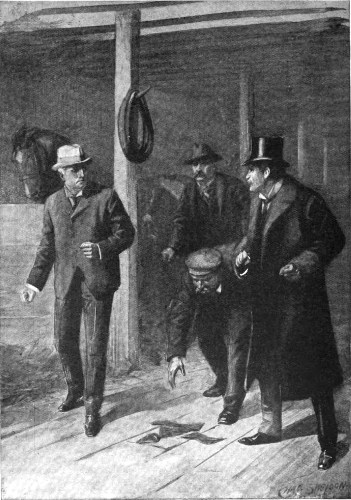
“ALLOWING THE NOTES TO DROP TO THE FLOOR, I TOLD THEM STERNLY THAT IF I HAD BEEN REMAINING IN NEW YORK I SHOULD HAVE HAD THEM ARRESTED.”
In conclusion, I may say that I was very glad to arrive at the Sinclair House and drink a stiff glass of brandy, as I was a trifle shaky, swearing to myself that I would never again risk pocket and life with mysterious strangers in the city of New York, even for the sake of “seeing it out.” 489
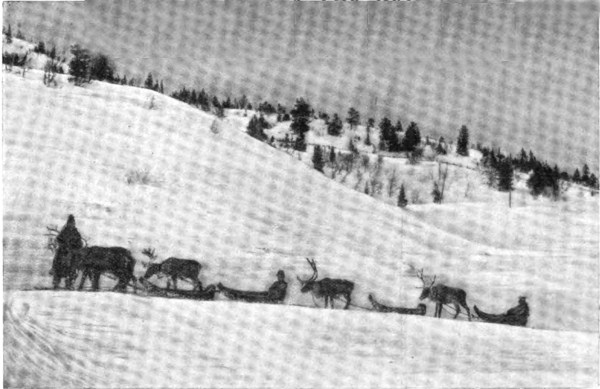
A WINTER SCENE IN “THE LAND OF THE REINDEER”—A LAPP MAGNATE MAKING THE ROUND OF HIS ESTATE.
From a Photograph.
An article dealing with a strange and little-known people—the Lapps. Living in a country where practically nothing grows, their whole lives are occupied with the reindeer, the one product of Lapland. A man’s wealth is reckoned in reindeer; he eats its flesh and drinks its blood for food, and his clothes are made of its skin. Small wonder, therefore, that the moss on which the animals live is more important to him than cereal crops, and that the highest form of Lapp art finds expression in the carving of reindeer bones. Photographs by the Author.

Some little time ago I was in Sweden, and was strongly advised by my friends to take the opportunity of visiting Lapland, that strange country of reindeer and semi-savages. I was given a letter of introduction to a certain Lapp magnate, who, I was assured, was the most educated and advanced person in the country, and who would see that I saw everything worth seeing. “Go and interview him,” said my informant, “though I cannot promise that you will be able to get him to talk. The Lapps are very reticent; they will never tell you, for instance, how many reindeer they possess. Mickel Nilsson Nia, to whom I am giving you this letter of recommendation, is wealthy and educated, yet he covers himself with reindeer skins like the humblest of his herdsmen, drinks the warm blood of the animal he kills, and thinks no dish more succulent than a sort of cake made of reindeer blood mixed with flour! He is a splendid specimen of a people who have at once assimilated and resisted civilization.”
I began to think it might be worth my while to visit these curious folk, and in pursuit of information sought out another acquaintance, a colonel in the Swedish army.
He told me that the Lapps are very fond of stimulating drinks; they think nothing of drinking fifteen or twenty cups of coffee a day, while their consumption of punch is on a vast scale. It is no uncommon thing to see numbers of helplessly drunk natives in the streets of Tromsö, especially when the sale of reindeer flesh has been profitable. Yet robbery and, indeed, crime in general are practically unknown among them; the innate honesty of the people is quite extraordinary. The colonel gave me an example. “As, perhaps, you may have heard,” he said, “I am very keen on hunting both the wolf and the bear. On one occasion, accompanied by a 490 Laplander, I was out after an enormous she-wolf, but the animal succeeded in completely baffling us. Finally, despairing of success, I abandoned the pursuit. A few days subsequently I was much surprised to receive a visit from my Lapp. With him he brought the wolf’s skin, which he insisted on my accepting; he had come up with the creature and killed it after a long, weary chase of many hours. I told him that the skin belonged to him, but he would listen to no argument. ‘You must be paid back for the trouble you have had,’ he kept repeating, with a smile. ‘It would not be fair for me to keep all the advantage for myself.’
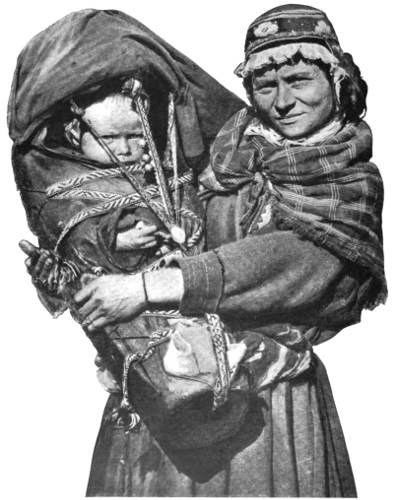
A LAPP MOTHER AND CHILD IN HOLIDAY ATTIRE—SO TIGHTLY SWATHED IS THE INFANT IN ITS CURIOUS “CASE” THAT IT SEEMS IMPOSSIBLE FOR THE POOR LITTLE MITE TO GROW.
From a Photograph.
491
“But go to the country and see things for yourself,” concluded my friend. “Try and speak with Mickel Nilsson Nia; but, above all things, make up your mind to practise patience. Nobody in Lapland appreciates the value of time in the slightest degree; a Lapp thinks nothing of turning up at an appointment six hours too soon or six hours too late. You must also be careful to be invariably most scrupulously polite to them. Their pride is boundless; they are persuaded they are almost divine. Their account of their origin is that, God having decided to submerge the world in the Deluge, everything living was drowned by the heavy rain, with the exception of two Laplanders, a man and a woman. These two God took under his charge and led to Vasso-Varra, where the couple separated, the man proceeding in one direction, the woman in another. For three years they pursued their respective paths, and at the end of that time found themselves again at Vasso Varra. On their travels neither had encountered a living soul. Three separate times did they repeat the experience. When nine years had elapsed they came to the conclusion that in the whole world they were the only inhabitants, and consequently they decided to marry one another. They had a very large family, and to-day the whole earth is peopled with their children; those who do not live in Lapland are degenerates!”
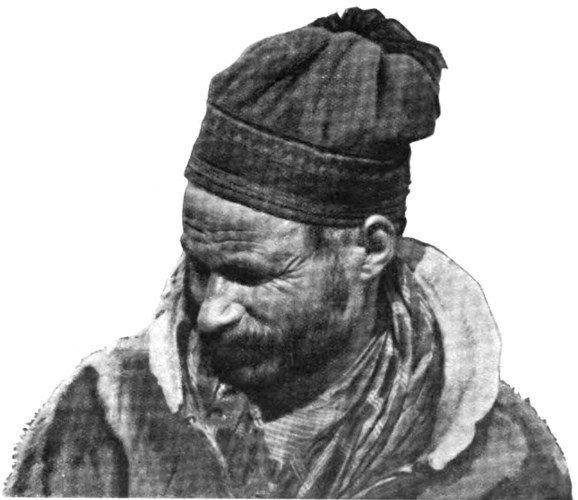
A TYPICAL LAPP PEASANT.
From a Photograph.
Well, I went to Lapland, eager to see the semi-savages of whom I had heard so much. It is unnecessary to describe the earlier stages of my journey. Tromsö, Hammerfest, and Lyngseedt, though much frequented, are but large villages in the neighbourhood of which the nomad Lapps pasture their reindeer. The animals feed on a sort of lichen, termed reindeer moss, which, during the autumn, covers the mountains with what looks like a mantle of snow.
The natives live in primitive wattle and mud huts, and I found entire families living in paternal promiscuity with their animals in what—judged by the usual standards—was a most pestilential atmosphere, the predominating feature of which was a nauseous mingled odour of leather and boiled coffee.
As to the people themselves, the typical Laplander, with whom I grew familiar, was, by no means a disagreeable type. Many of the older men bear a strange resemblance to French peasants, having the same dark skin, black hair, large mouth, thin face, prominent cheek-bones, and long, pointed chin. Even in the most wretched hovels I was offered a cup of coffee, accompanied by polite gestures that would have been appropriate for the bestowal of Royal hospitality. In exchange for this courtesy I usually presented my hosts with chocolate sweetmeats, which were received with transports of gratitude. My general impression, however, was that I was among a very primitive peasant race, but I am bound to admit that the Laplanders fell in with all my requirements as a photographer with the utmost good grace; they invariably took the pose I required better than my own people, and never displayed any unseemly curiosity.
I had not forgotten the famous Mickel Nilsson Nia, and when I reached Nawick a Lapp schoolmistress there was kind enough to 492 serve me as guide to the abode of her celebrated countryman. We walked for an hour through a most desolate stretch of country, which gave one the impression that it had been abandoned after some mighty natural cataclysm. In this landscape of death the only persons we met were a stray herdsman or two, miserably attired, driving before them a few attenuated reindeer. Suddenly my guide stopped, exclaiming, “Here is Mickel’s house.”
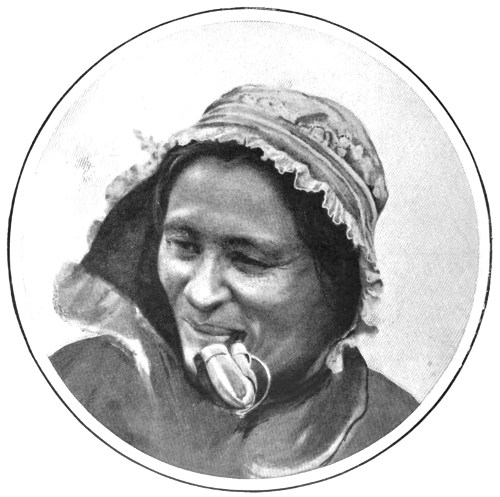
A LAPP WOMAN OF THE BETTER CLASS—MOST OF THE FEMALES HAVE A MARKED PREDILECTION FOR TOBACCO.
From a Photograph.
On the threshold two women were engaged in tanning reindeer hides. One of the women was elderly, the other quite young, yet they were attired in an almost identical manner. Each wore a short, coarse brown woollen skirt, beneath which were visible garments that resembled trousers made of bands of tightly-wound cloth. On their shoulders were grey shawls, on their feet enormous shoes of reindeer leather, on their heads bonnets of some blue material covered with lace. The colours usually employed in Lapp costumes, by the way, are white, black, grey, blue, and green; brighter hues are seldom seen.
At sight of us the two women ceased working to stare, and then broke out into a hearty laugh—not of derision, but of welcome. The Laplander is of an extremely jovial disposition, and invariably prides himself on the possession of some nickname—not always complimentary—bestowed upon him in jest. My guide addressed herself to the younger of the two women, who, in addition to the garments I have enumerated, 493 wore some splendid reindeer furs. Then a young peasant came out of the hut, and there ensued a tremendous discussion, the result of which was to convince us that we had made a mistake—Mickel Nilsson’s hut was farther on. The young man volunteered to accompany us there.
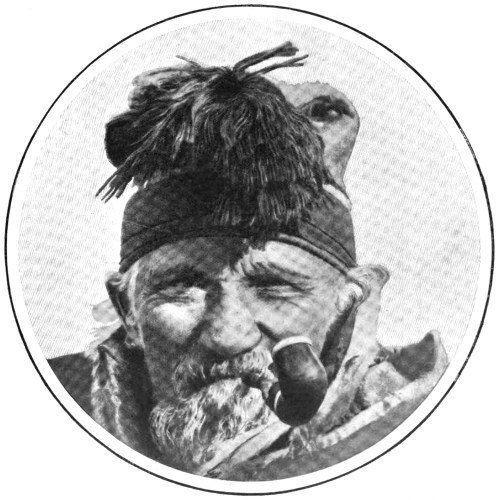
MICKEL NILSSON NIA, THE “LAPP ROTHSCHILD,” WHO POSSESSES NINE THOUSAND HEAD OF REINDEER.
From a Photograph.
Finally, we came up to a group of men and women, in the centre of which, busily talking, a veritable Triton among minnows, was the person I sought. On the road I had, through my interpreter, been questioning our new companion, and had thus learned that Mickel Nilsson Nia was a sort of Lapp Rothschild, and possessed nine thousand head of reindeer. As each animal may be put down as worth roughly about a sovereign, the fortune of the little Lapp before me—who, hearing the object of my mission, had now put his finger to his cap and was wringing my hand with great affability—might be estimated at nine thousand pounds.
We had come upon him on a holiday, it appeared, and Mickel Nilsson Nia was arrayed in his very best clothes. On his head he wore a tall sugarloaf, peaked cap, topped by a bright red “pompon,” which gave it a most extraordinary aspect. His body was covered by a superb white reindeer skin—the gala costume—and on his vest glittered the medal bestowed upon him by King Oscar as a reward for his success in breeding reindeer. The man’s whole appearance, with his moustache, short beard, 494 cunning eyes, and perpetual smile, reminded me strongly of Li Hung Chang, the Chinese statesman of illustrious memory, and also the richest man in his country.
Mickel Nilsson Nia courteously invited me to enter his hut. I hesitated for a moment, and then, with head bent low, bravely dashed into the malodorous atmosphere of leather and boiled coffee which I had already learned to dread. In the semi-gloom of the interior a mass of animals were wallowing about, though I could not see them very distinctly. I sank into a wicker arm-chair.
“A cup of coffee?”
“Many thanks.”
Into my hands was thrust a grotesquely-coloured cup, bearing the fateful legend, “Made in Germany.” Like a hero I gulped down the mixture it contained; to tell the truth, it was not unsavoury. Then I commenced to ask him a few questions.
“Are things prospering in the reindeer breeding?” I inquired.
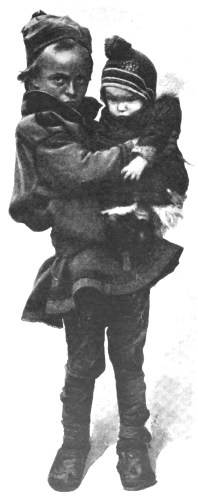
FRATERNAL AFFECTION—FAMILY TIES ARE STRONG IN LAPLAND, AND EVEN THE
BOYS LOOK AFTER THEIR BABY BROTHERS WITH THE UTMOST SOLICITUDE.
From a Photograph.
Mickel’s answer was strictly non-committal—neither a decided “yes” nor a “no.”
“How many animals do you possess?”
Again he evaded the direct answer with an unsatisfactory “Not so many as I once had.” Then he called my attention to a herd of some three hundred animals or so on the neighbouring hillside, but added immediately, as though fearing he had hinted too much, “They do not all belong to me, however; some are the property of my neighbours. The herdsman we share between us.”
After this I thought it as well to abandon commercial matters for literature. Mickel Nilsson Nia is a man of letters, devoting to books all the leisure his nomadic pursuits leave him. Of the literature of Lapland he spoke with pride.
“With us,” added Mickel, “literature is essentially popular. Our poets sing only of what they have actually under their eyes; they celebrate 495 our daily life, our labours.” Here is a specimen of our poetry:—
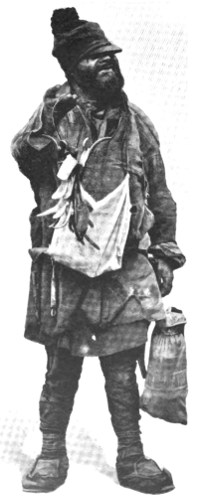
A VENDER OF SOUVENIRS—HE HAS DONE WELL AT HIS TRADE, AND HAS ACCORDINGLY
TREATED HIMSELF TO A SPECIALLY-SMART CAP AND LUXURIOUS LAPP BOOTS.
From a Photograph.
As I was begging my interpreter to convey to Mickel Nilsson Nia my admiration of this stirring epic of hunting, my host picked up a bundle of Swedish illustrated papers from the corner and proceeded to make comments upon them. Just then, however, a herdsman entered with news of importance, so I rose and took my leave.
Accompanied by my two companions, I retraced my steps through the wild, desolate country, in which none but the most intrepid of sportsmen could find any pleasure. It is a land in which there are neither hotels nor houses; a land which seems to take one back to some remote age of innocence, when simple, honest human beings drove their flocks and herds before them, chanting the while a hymn to the delights of a pastoral life.
What souvenirs, you ask, can one carry away from this strange country, where the reindeer rules supreme, and which, without the presence of that useful animal, would sink into a condition of abject poverty and utter desolation? Appropriately enough, there is nothing but carved reindeer bones. Some 496 are carved in so extraordinarily realistic and expert a fashion that more than one eminent sculptor to whom I have shown them has lifted his hands in admiration.
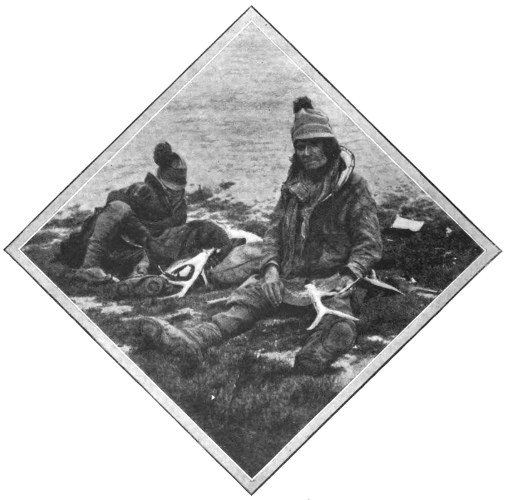
LAPP ARTISTS AT WORK
CARVING REINDEER
BONES.
From a Photograph.
Like all true artists worthy the name—like the Japanese, for instance—the Laplander will only reproduce what he sees. Consequently, in nine cases out of ten his carved reindeer bones show only reindeer—reindeer at rest, reindeer jumping, reindeer harnessed to sledges, and reindeer browsing. The thing becomes an absolute obsession. And what realism is displayed by these unconscious artists! What long hours of patient observation are implied by the life-like attitudes they depict, and which might almost have been photographed, so true are they to Nature! One gets the impression, watching the Lapp carver at work, that one is in the presence of an artisan of a bygone age, before rules had been laid down and become stereotyped—an age when each individual worker was guided by his personal inspiration alone.
After all, then, in this strange country, where there is supposed to be “nothing but reindeer,” one may still find among these half-savage people financiers—like Mickel Nilsson Nia—poets, and artists—types which certainly go to show that the Lapps possess some of the attributes of a civilized nation. Music alone is unknown in Lapland, and this may be because the Lapp, with his boundless pride of race, considers he has no need of its chastening and refining influence.
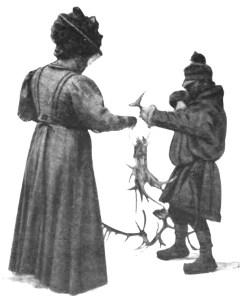
BUYING SOUVENIRS—STRIKING A BARGAIN WITH THE CURIO PEDLARS IS A LONG AND COMPLICATED BUSINESS.
From a Photograph.
497
The author writes: “I can vouch for this story in every particular. I hope it may prove interesting to ’Wide World’ readers, as illustrating the endless ramifications of the old Maori law of ‘tapu,’ and the absurd predicaments in which Europeans coming under its influence occasionally found themselves.”

In the old days of thirty-five years ago, especially in the out-districts, the Maoris still retained many of their ancient customs.
Among other inconvenient practices they had an insane habit of depositing the bones of the dead in any kind of handy spot that took their fancy—on the top of an island, in a hollow tree, in the crevices of rocks—anywhere that was most convenient.
Afterwards the place became “tapu” (sacred, forbidden, prohibited). Consequently any unwary and unsuspecting stranger who, happening along, chanced to lean against the tree or tread on the rocks became himself “tapu” (meaning, in this connection, accursed, unclean), and was hunted from the tribe as a social leper and outcast. Like Cain, every man’s hand was against him, though it was forbidden to kill him; and unless he was a man of mark and could get the “tohunga” (priest) to “lift the ‘tapu’ off him” he speedily succumbed to a general sense of misery and superstitious bedevilment.
It is not my intention to attempt an explanation of the working of the “tapu” law. That has already been done by far abler pens than mine. My own opinion is that no one ever did properly understand it—not even the Maoris themselves.
In the beginning, probably, the thing was a decent and workable law enough, as laws go, but in the course of ages, what with amendments and addenda, it got beyond everything and was entirely indigestible by human intellect; finally becoming an incubus—a kind of religio-legal nightmare from which they couldn’t wake up.
I only know that any place, person, or thing could become “tapu.” Food, fire, air, and water were not free from it. Man, woman, and child were subject to it. For any trivial cause and without his knowledge a man might be made “tapu.”
Sometimes it was partial, affecting only the feet or hands, and on these occasions a man could put a “tapu” on himself by walking about or scratching his own head!
Anyhow, if you got a bad dose of it, things became pretty uncomfortable.
White men could generally escape by affecting to ignore the thing and taking ship for another country.
Unfortunately, as the reader will perceive, circumstances prevented my adoption of this course.
At the time I am telling of I was superintending their northern trading station at Te Mata for Messrs. Franks, Backhouse, and Co., a big Auckland firm. Puketawa—whom I have mentioned in previous Wide World contributions—a native of the South Island, educated at a mission school, was by way of being my servant and store-help. Having lived much with Europeans, and being ridiculously proud of the little the mission school had taught him, he affected to despise the Maoris of the neighbourhood. “Ignorant savages,” he called them, and stood aloof in the light of superior wisdom. At times he even permitted himself a mild remonstrance at what he considered my undue intimacy with the heathen. Education had made Puketawa a bit of a snob; but, for all that, he was a very good fellow.
The store, residence, and outbuildings stood on the shore of the tidal estuary of the Mangapai River. Over a low range of hills running parallel with the coast, at a distance of about half a mile, was the Maori “kainga” (village), having a population of about nine hundred souls.
It was with the object of bringing the blessings of civilization to these benighted inhabitants and—of course, quite incidentally—securing a profit to themselves that my principals had established the trading post.
Being the only station within a radius of fifty miles, trade was good, and neither merchants nor agent had reason for complaint on the score of value or bulk of the cargoes of native produce picked up by the firm’s trading steamer on its quarterly round.
By largess of sweets to the piccaninnies and gauds of cheap jewellery to their mothers, I had gained a certain popularity. With Te Horo, the chief, I was on terms of close friendship. I had quite won the old fellow’s heart by a timely gift of an imitation pearl necklace to his youngest and favourite wife. By careful 498 tutelage I was fast inducing in these children of Nature a craving for the things of the white man’s higher life as represented by cotton goods, sugar, tea, tobacco, etc. For obvious reasons, therefore, I was anxious to retain their good will, and careful lest by any infringement of custom or superstition I should unwittingly offend. In the light of what follows this should be remembered.
The snipe were thick that autumn on the tidal flats at the river’s mouth, and as a break to the monotony and with a view to change of diet I would often close the store on Saturday afternoons and, with Puketawa, drop down stream on a gunning expedition.
It was on one of these weekly excursions that misfortune fell upon us. The birds were shy that day, and we followed them far over the sand-flats. Intent on our sport, neither of us noticed the signs of an ominous change in the weather, till, chancing to look seaward, I became suddenly aware of it. The blue water had changed in colour to a leaden grey and the horizon was hidden in a dense shroud of mist, which, with the wind behind it, was rapidly rolling up towards us. There was no time to lose. Our boat was at anchor a mile away on the inner edge of the sand-flat. It would be a race between us and the fog. If overtaken on those interminable banks we might wander, hopeless, till the returning tide drowned us like rats in a trap.
Fortune favoured us. We reached the boat, and, breathless, had just tumbled into it and hoisted sail, when the sea-fog shut down like a curtain. Sky, cliffs, and river channel were blotted out in an instant. No pretence at keeping a course was possible. The river ran due west, and, the wind coming from the east, it only remained to sit tight and let the boat scud before it, trusting to luck that we did not ram any one of the hundred rocky islets studding the river’s mouth.
Our vision, beyond a small circle of heaving grey water immediately around us, was shut in by the wall of thick white vapour. With Puketawa at the sheet, I at the steer-oar, we drove along in a little world of our own.
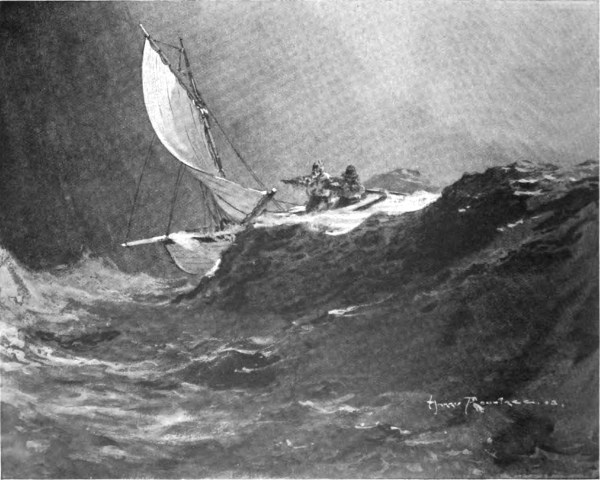
“IT ONLY REMAINED TO SIT TIGHT AND LET THE BOAT SCUD.” 499
Suddenly, at a yell from Puketawa, I looked up. A wall of rock loomed dark through the mist, before and above us! “Luff!” he screamed, but there was no time. Ere I could sweep her round with the oar a grey roller lifted under our stern, caught us broadside on its crest, rushed us through a providential cleft in the rocks, and, rolling over and over, we, with our belongings, were strewn broadcast on a little, sandy beach. The boat, though shaken, was still sound, and we quickly hauled it beyond the reach of the waves.
A short examination showed us we had been cast up on one of the very islands we had hoped to escape. Still, unpleasant though our predicament was, it could easily have been worse. In that thick haze we might well have been driven on the bluff cliffs of the headland and pounded to a jelly in the surf. At all events, we were on terra firma and could make the best of it till the fog lifted. In our drenched condition the wind was decidedly unpleasant, so, after securing the boat, we made haste to seek shelter on the lee side of the island.
As we groped our way up the rocks and over the top we came across a low-spreading puriri tree. Beneath it we found plenty of dry sticks, and, breaking off some dead branches also, we carried with us a good stock of firewood. I had matches in a waterproof case, and soon, in a snug rock-niche, we were warm and comfortable beside a roaring fire. We had managed to save some six brace of birds from the shipwreck, and these, skinned and toasted on the embers, with the contents of my flask to wash them down, made an excellent supper, with sufficient to spare for breakfast.
Dawn broke clear and calm, with just enough wind to take us on our homeward way. I had sent Puketawa for a further supply of wood, when a shout from above brought me scrambling up the rocks. There he stood, a living embodiment of terror. With wide eyes and dropping jaw he was staring at the hollow tree-trunk. Then I saw what it was. From the orifice, ghastly in the dim light, grinned two fleshless skeletons. Around the hole was heaped a pile of human bones and skulls, while other death’s-heads peered at us from crevices of the rocks. We were in a Maori “wahi-tapu” (cemetery).
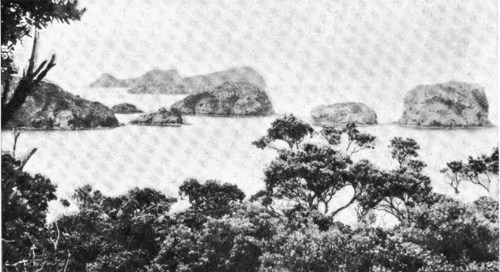
THE ESTUARY OF THE MANGAPAI RIVER.
From a Photograph.
It was yet another instance of the sheer “cussedness” of things in general. There were half a hundred islands to choose from; yet malignant Fate, aided by that confounded fog, must needs fix upon Taupiri on which to cast us up—Taupiri, the sacred island, where for centuries the bones of the chiefs had been deposited. It was consecrated to the “mana” (holiness) of their spirits, and frightfully “tapu.” No man might put foot on it and live. And we had not only passed the night there, but—horror of horrors!—had eaten food cooked with wood from the sacred tree! The loose stones, among which we had stumbled in the foggy night and had kicked from our path, were the skulls of the great dead. There was no doubt about it—we were “tapued” up to our necks. That it was purely accidental and through no fault of our own didn’t in the least matter. From the Maori point of view, indeed, it made the case infinitely worse. For Puketawa, whose civilization was, after all, only skin-deep, it was likely to prove a most serious affair. Brought thus face to face with the terrors of ancient superstition, his white man’s education fell to pieces. His mind swung back to the faith of his forbears and the fears of the old beliefs gripped his heart. He was for fleeing the accursed place at once, but, “tapu” or no “tapu,” I wasn’t going without breakfast. Puketawa refused food. Already I fancied he was getting “pourri” 500 (depressed)—no light thing with a Maori, for I had known them before then to die of sheer melancholy. I realized that the accident was bad for me also if the thing should get known. I did not fancy being ostracized by the tribe, my goods confiscated and destroyed, and my house and store burnt by way of purification and to avert the anger of the gods.
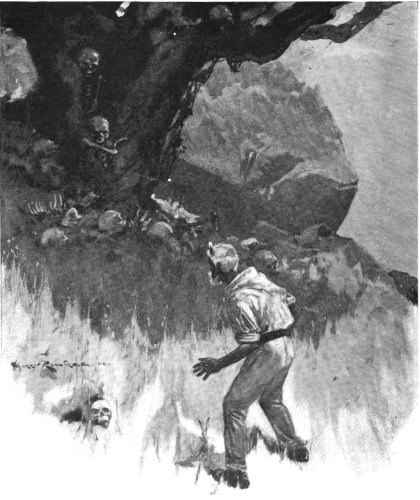
“THERE HE STOOD, A LIVING EMBODIMENT OF TERROR.”
Though, on the way home, I was angry and contemptuous by turns, Puketawa refused to be comforted. To my ridicule or reproaches he answered only with a sickly smile. “No good,” he said. He was “tapu” right enough—could feel the spell “working inside him.” In vain I pointed out that the island was six miles distant from the “kainga,” hidden by a bend of the river, and that we had landed at night in a dense fog and had left again before sunrise.
“Ah!” he answered. “Te tohunga very wise. He know wi’out seein’.”
On arrival, contrary to custom, we found the beach below the store deserted. Not a soul was in sight. No Sunday crowd of mothers chatted as they squatted around the buildings; no piccaninnies dabbled in the water, and waited anxiously for sweets on my return. I knew 501 these latter would not forego the weekly dole unless for serious cause. Could Puketawa be right after all? Had our infringement of “tapu” become known in some incomprehensible manner? It began to look very like it. That night at supper also Puketawa declined food. He even refused rum-punch, and when Puketawa refused rum things must be looking black indeed. He lay in his bunk with his face to the wall, silent save for long, shuddering sighs. So it went on through the night. Protests, reproaches, even vigorous shakings were of no avail; he lay like a log, with closed eyes, making no sign.
This was beyond a joke. No possibility of pretence was here. The man was dying, visibly, of sheer funk. Unless I could rouse him he would not live another day. I could not let him die, and, base surrender to heathen jugglery though it was, made up my mind to seek out the “tohunga” next day and entreat him to remove the spell.
In the long, dark watches I began to feel pretty queer myself. The silence seemed tangible, heavy, impermeable. I was not exactly frightened; the feeling was indescribable—a sort of nameless terror at nothing, a horror of some unknown impending fate against which it was useless to struggle and from which there was no escape. Mutuality, sympathy, hypnotism—call it what you will—a weight of fear lay on my senses, a veritable obsession of dread.
Was there any truth in heathen devilry after all, I wondered? Had the confounded “tapu” got me too? With an effort I shook off the growing lethargy and paced the floor through the night. In the morning I could eat nothing; food was repulsive. Shortly after sunrise I took my way to the “kainga.”
Within fifty yards of the gate I was warned by the young warriors to keep my distance. Presently Te Horo himself appeared in full war-paint of “korowai” (kilt) and feather mat, a spear in his hand.
“Thy sin is known,” he cried, sternly. “Come not near to bring contamination upon us. Thou and thy servant are accursed. It may be ye shall both die; I know not. Begone! At noon the ‘tohunga’ comes to confer with thee.”
As I sat beside the bewitched man and awaited the coming of the priest the night fears that had assailed me passed, giving place to a feeling of rising anger at the whole thing. Here was I—a fairly decent Englishman, reared in the Anglican faith and living in the nineteenth century—hindered from going about my business, outcast, excommunicated, shunned as a leper, my servant dying; all on account of some fiendish diablerie of heathen fetish. The affair was preposterous, incredible, ludicrous. Then I looked at poor Puketawa, moaning, prone in his bunk, and was answered. That at least was real.
Punctually at twelve o’clock the old “tohunga” came over the hill. He was a tall man, grey-headed and handsome, and in his full robes of office he looked imposing enough. Halting at a short distance he called us to come forth. I started forward to expostulate, but he waved me sternly back.
“Approach not,” he commanded. “You are unclean, you have incurred the anger of the great spirits. Yet will I intercede, and it may be purge you of the offence. Now, therefore, bring out your ‘taonga’ (goods) and everything that you have touched, in order that I may destroy it and the purging be complete.”
This was beyond a joke. Give up my household goods and knick-knacks to be burnt? Never! I’d see him hanged first.
“Be off, you old scallywag!” I shouted. “Give you my things, indeed!” And I began to tell him what I thought about it. He stood impassive, inexorable.
“Young man,” he answered, “be not mad. Fool! Can you fight the spirits? Look to your servant. Delay not, lest he die.”
This was unanswerable. I surrendered, and we carried the things out, Puketawa moving as though in a mesmeric dream. All my bachelor treasures, bedding, rugs, chairs, cooking-pots, and crockery—everything went. The pots and crockery he smashed with his tomahawk, the house and all else he burnt to ashes. Luckily, I had not been near the store, or that and its contents would have gone too.
What next, I wondered? Had the old heathen done with us? Evidently not.
“Remove your clothing,” he commanded. Here was a pretty state of things! Being naturally of a modest disposition, I demurred, at which he lost his temper.
“Hinder me not,” he cried. “Your life or death is naught to me. Beware, lest I depart and leave you to your fate.”
There was nothing for it but to comply. So, whilst our clothes were burning, Puketawa and I stood before him naked and unashamed.
Down to the creek, to the pool beneath the waterfall, the old priest drove us. The stream was full of snow-water from the mountains, and bitterly cold.
“Enter,” he ordered.
“Needs must when the devil drives,” and with a gulp we plunged in and stood shivering up to our necks, while for ten interminable minutes the old fellow chanted prayers and wove his “karakia” (spells) on the bank. 502
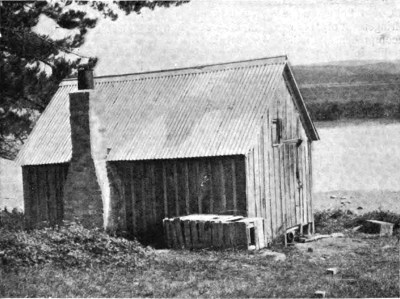
THE AUTHOR’S STORE ON THE BANKS OF THE MANGAPAI RIVER.
From a Photograph.
At last it was over. We climbed out, and the “tohunga” sprinkled each of us, separately and solemnly, with a fern frond dipped in the water of the pool.
“It is enough,” he said. “The ‘tapu’ is lifted,” and walked away.
The humour of the situation appealed to me, and, cold and dripping though I was, I shouted with laughter. And you will admit the thing was fairly humorous. Imagine us, if you can, standing there, stripped of our worldly goods, naked and shivering—Puketawa, a prize convert from a mission station, and I, a Christian—brought to such a pass by miserable heathen wizardry that we had been glad to submit ourselves to the sorceries of the arch-wizard himself to escape the consequences of the spells that had been cast over us!
All the same, the effect of the hanky-panky on Puketawa was truly wonderful. Moribund before the arrival of the “tohunga,” he was a new man after the performance. He laughed with me, his dull eyes again became clear and bright, and he got quite chirpy; while, laugh as you will, even I, who had submitted to go through it only on Puketawa’s account and for the sake of trade, must confess to a sense of spiritual well-being to which I had been a stranger for some days.
With trade clothing from the store we clad our nakedness. The baptism business had given us an appetite, and we soon rummaged out a cold collation. Maoris are always fair trenchermen, but I never saw one put away such a feed as Puketawa did then. Eat? Long after I had finished I sat and watched the stuff disappearing—tinned salmon, potted beef, spiced ox-tongue, dried fish, ham and chicken, pine-apple, Worcester sauce. King Solomon in all his glory never had such an appetite.
Next day, as though to make amends for the inconvenience we had suffered, and show that the popular feeling was not directed against us but against the “tapu” alone, the Maoris flocked to the store with cash and barter, and I did the best day’s trade of my life. In two days they had built me a better house than that destroyed. It was as if the ceremony of purification had conferred a sort of brotherhood upon me, and I found myself on a better footing with them than ever before. I never discovered, however, how they learnt of our transgression.
To this day the question of how the “tohunga” became aware of our accidental presence on the sacred island remains a mystery. That we were alone there I am certain. Under the circumstances of the storm and the thick mist, it is equally certain our presence was not observed from the shore. The “kainga” was six miles distant, a range of hills intervening. It was a black night; Maoris are chary of being out after dark. Altogether the possibility of our having been seen may be dismissed. Puketawa, of course, leaned to the supernatural. Old stories of occultism practised by the priests, of spiritualism and uncanny mental telepathy with the spirit world, he told for my benefit. I do not like mystery, and have no leaning towards the occult, but, dismissing all this as unworthy of credence, there yet remains the query of how the “tohunga” knew of our “breaking of the ’wahi-tapu’” (breach of the sanctity of a burial-place).
In the fullness of his heart at my successful whitewashing, old Te Horo offered to give me his youngest and prettiest daughter in marriage, with a thousand acres of tribal land as a dowry. Between you and me, there have since been times when I have regretted that I didn’t clinch the bargain. 503
Bird-singing competitions, in which substantial money prizes are awarded to the owner of the songster making the greatest number of “trills” in a specified time, are very popular in the North of France and Flanders. In this article the author describes and illustrates a typical bird-singing festival in a Flemish village. From photographs by the author.

The inhabitants of the rural district of that part of Belgium which goes by the name of Flanders seem to be possessed of a genius almost unique for instituting and organizing quaint and curious competitions designed to administer to that keen taste for friendly rivalry which is so characteristic of the population of King Leopold’s little domain. Any stranger penetrating into the heart of the country at the time of the year when many of the hamlets are about to hold their annual fairs—spun out to last a week, or even longer—cannot fail to be interested in the long posters adorning the walls of every “estaminet,” announcing a separate event for each day of the festive season, and testifying to the great hold this healthful spirit of emulation exercises upon the minds of these simple peasants.
Being one of those strangers in a strange land, I was overcome by a spirit of curiosity when a very limited acquaintance with the Flemish tongue helped me to the conclusion that the “Prijskamp voor Blinde Vinken,” announced for a certain Sunday at the untimely hour of seven in the morning, was a competition in which blind birds were to be the candidates for honour and distinction, and I resolved to be present at what promised to be a curiously interesting spectacle.
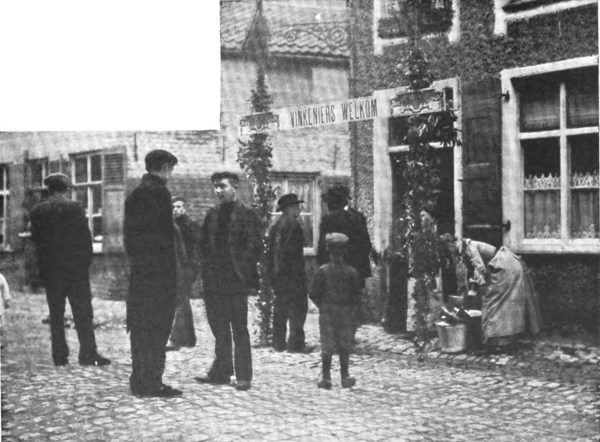
THE FINCH-OWNERS’ MEETING-PLACE AND HEADQUARTERS.
From a Photograph.
Setting out on my bicycle in the early dawn of a stormy morning, I was borne with the wind through one sleeping hamlet after another. The pulse of life had scarcely begun to stir; but when I reached my destination, as the clock struck six, and wended my way to the street with the well-nigh unpronounceable name where the great event was to take place, all was alive and bustling. Peasants of both sexes, representing every stage from tender childhood to 504 decrepit old age, were strolling up and down or standing about in groups eagerly discussing the all-absorbing event which was about to commence—the contest of the blind finches.
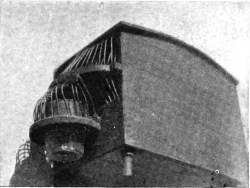
ONE OF THE CAGES, SHOWING THE DOUBLE FRONT TO
PROTECT THE LITTLE OCCUPANT FROM CATS.
From a Photograph.
At intervals men and boys clattered along in sabots, or proceeded with shuffling gait in gorgeously-coloured carpet slippers, bearing mysterious wooden boxes under their arms. I inquired into the nature of their burdens, and discovered that they contained cages which housed the chaffinches destined to take part in the competition. These cases, varying in size, bore little similarity to each other either in design or workmanship, for while some were roughly put together without any attempt at decoration, others, though evidently the work of the amateur, revealed traces of minute care and originality of construction, one being adorned with a rudely carved representation of the little imprisoned inmate, a work of art presumably executed by the owner himself or some village genius. A few of the boxes were really elaborate constructions, one in particular being made of highly-polished mahogany, on which figured a bird with outstretched wings, executed in relief ironwork.
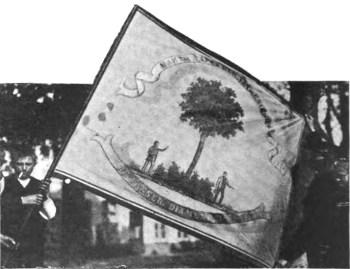
THE BANNER OF A FINCH-OWNERS CLUB.
From a Photograph.
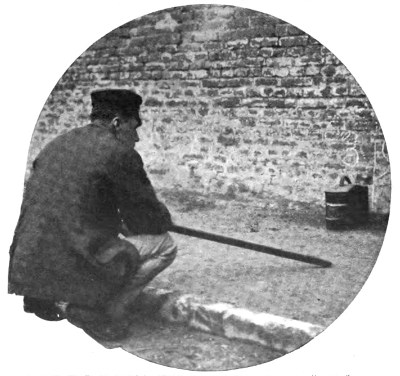
ONE OF THE JUDGES IN POSITION, READY TO SCORE THE NUMBER OF “TRILLS”
EMITTED BY THE BIRD IN FRONT—NOTICE THE CURIOUS TALLY-STICK USED IN SCORING.
From a Photograph.
There was one spot in particular towards which the future competitors seemed to be attracted, a rustic inn, over whose portals the flag of the local finch-owners’ club waved lustily in the vigorous breeze, and the cheery greeting, “Vinkeniers Welkom,” attracted the attention of the passers-by. It was here that the organizers and competitors met for the purpose of settling all matters pertaining to 505 the bird-singing contest. Even at 6 a.m. beer has irresistible fascination for the true native of Flanders, and it goes without saying that every entry for the competition called forth a request for at least one “bock” on the part of the competing bird-owner. Others, who came as mere spectators, followed his example, and soon the stream of conviviality flowed freely.
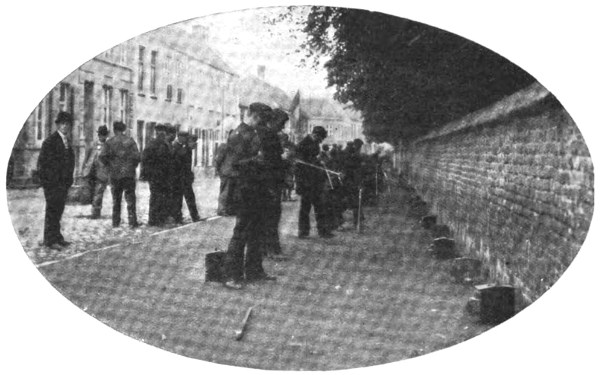
THE COMPETITORS AND JUDGES IN POSITION.
From a Photograph.
A few men and boys were already opening their boxes, and tenderly lifting out strong little wooden cages with double wire fronts, designed to withstand the attacks of that relentless foe to bird life—the domestic cat. Meanwhile numbers had been chalked on to the wall along the side of the road with the object of showing each competitor his place, and one by one the owners of the feathered songsters took up their positions, until I counted fifty-six competitors seated by the roadside, waiting for the signal to begin the contest. Some of these men had walked as far as twenty miles, and, having placed their boxes three yards apart, sat down with evident relief.
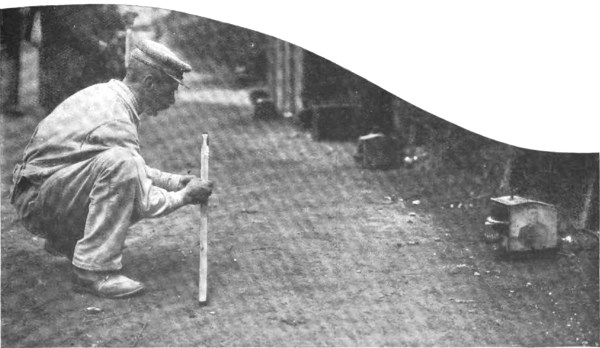
A JUDGE AT WORK—EACH MAN SCORES FOR SOMEONE ELSE’S BIRD, AND STEWARDS KEEP A CHECK UPON THEM TO INSURE FAIR PLAY.
From a Photograph.
506
During the interval of waiting I gathered from several communicative candidates that it is necessary to blind the little birds in these “concours,” as they would stop singing immediately they found themselves to be under observation. The eye itself is not injured, however, the closed eyelids being merely glued together, so to speak, by means of a slight touch with a hot iron. Needless to say, this operation must be performed by an experienced hand, otherwise part of the lid may be left open, in which case the front of the cage must be covered, or the shy little occupant will not sing. One is relieved to know that it is quite possible to restore the bird’s sight by separating the closed lids.
As the Belgian law does not permit such cruelty to be openly practised in the country, the birds are imported—or, to be more accurate, are supposed to be imported—from France. Even the catching of birds for the purpose of employing them in these curious contests is looked upon as illegal in Belgium, but laws of this kind are more easily made than enforced. Probably the Government thinks that by keeping this pastime under a control which appears to be severe it is doing its duty, and with this object in view it demands that each owner shall carry on his person a certificate containing the following words:—
“The undersigned, burgomaster of the town of ——, hereby declares that Mr. ——, of such a trade, living at ——, is the owner of blind chaffinches, with which he travels, and that he does not practise the trade of bird-selling.” For this guarantee a fee of a hundred francs is charged, it being necessary to obtain a new signature from the authorities every fortnight.
The success or failure of a bird entered in a contest depends upon the number of perfect “trills” made by the little competitor in a certain time—usually an hour. The best result my informant had ever known at a “concours” was one thousand and nineteen trills in the hour, and after setting up this record the bird readily sold for a hundred and twenty francs. As money prizes are invariably offered, these feathered songsters are often sources of profit as well as sport to their owners, a good chaffinch easily adding a hundred francs to the family exchequer.
But now let me relate how these competitions are managed and carried on. I doubt whether any of my readers have ever witnessed such a scene as I am about to describe, and a brief sketch of what came to pass in that out-of-the-way spot can hardly fail to interest those who enjoy a glimpse of peculiar, old-world practices.
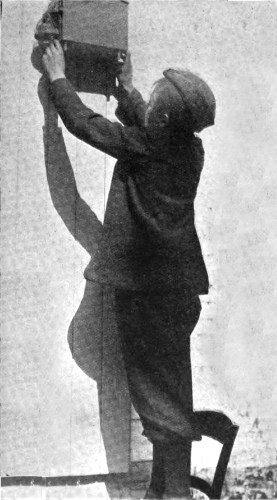
A WELL-EARNED REST—HANGING THE WINNING BIRD UP IN
THE SUNSHINE AFTER THE CONTEST.
From a Photograph.
As the clock of the village church laboriously chimed out its seventh stroke the manager of the competition, in a loud voice, issued the order for the contest to begin. At this there was a general stir. Each man took up a more or less business-like attitude in front of the cage of one of his opponents, every competitor acting as judge for someone else’s bird. Having produced his curious-looking marker—a thing resembling a four-sided yard-stick, painted black, with a handle either in the form of a knob or a ring at the top end—the men at once proceeded to chalk certain cabalistic signs thereupon, which a close observation showed me stood for the number of trills made by each bird—“Chuie, chuie, chuie, chuie, chuiep” being a perfect trill. It is the fifth and last part of the warble upon which success really depends. If the final “chuiep” is not heard the feat is incomplete, and the little warbler is not credited with a chalk mark.
The silence was scarcely broken save for the shrill piping of the birds, and the seriousness exhibited by competitors and spectators alike 507 would have done credit to the mourners at a funeral. It was curious to note the manner in which some of the less gravely-disposed owners spent the interval of waiting for their charges to distinguish themselves. Some were lightening the serious business of marking by occasional draughts of beer from huge tumblers, which they had, with wise forethought, placed close at hand. Others, with that calmness that comes from long practice, were puffing contentedly at short clay pipes, while the greater number—among whom were some very youthful competitors, evidently on their first trial—wore anxious expressions, never letting their eyes rest upon any other object than the cage and the scoring-stick entrusted to their care.
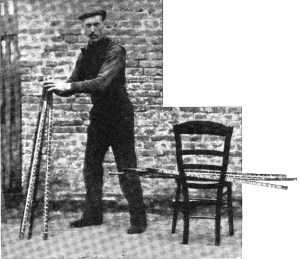
COLLECTING THE TALLY STICKS.
From a Photograph.
All this time the subdued talking among the group of interested spectators scarcely rose above the continued chirping of the birds, which seemed to become more and more shrill and vigorous as the moments passed, until, after the lapse of half an hour or so, each of the little songsters seemed ready to burst its little throat in its determination to make itself heard above its neighbours.
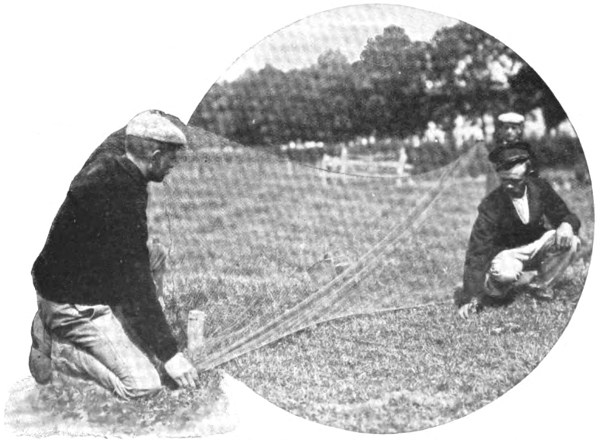
PLACING THE NET AND DECOY-BIRDS TO CAPTURE FINCHES.
From a Photograph.
At the commencement of the competition I had been under the pleasant impression that the little creatures, although selfishly deprived of the blessing of sight in order to administer to a somewhat barbaric form of human enjoyment, sang their early morning songs out of pure gladness of heart and “the wild joy of living,” but my fond delusion was soon nipped in the bud, for unmistakable notes of anger were by this time distinct, and it needed not the assurance of one of the spectators to convince me that, in its wild state, this particular species of the winged creation, at all events, is far from preserving that unity and perfect agreement in the home circle ascribed to it by 508 one of our poets and pointed out for man’s emulation. It is in order to stimulate an artificially-produced anger, considered necessary for the success of the “concours,” that these matches are held in the early morning hours, while the birds of the trees and hedges are singing most lustily. The chirping of the imprisoned songsters proceeds from a wild frenzy of desire to do battle-royal with those of their brethren still enjoying freedom, and by degrees the longing grows for an encounter with their competing neighbours.
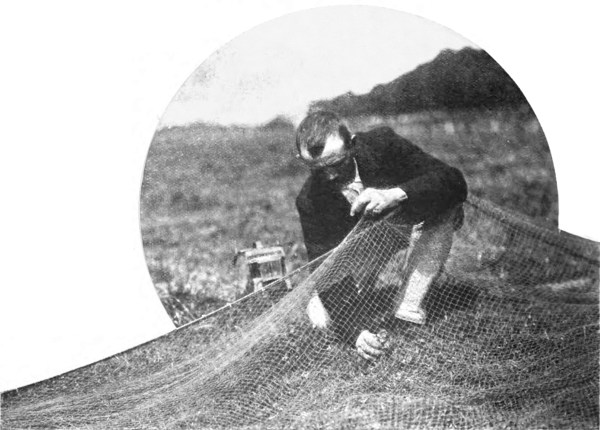
CAUGHT!—THE CAPTURE OF A FUTURE COMPETITOR.
From a Photograph.
These matches are under the strictest control, both as regards discipline and fairness, and any candidate found guilty of dishonesty in marking is punished by summary expulsion from his club. Stewards controlling the judging parade up and down with their eyes upon the markers, so that cheating under such close supervision is well-nigh impossible.
As the most successful of the finches trilled forth its five hundred and eighteenth “Chuie, chuie, chuie, chuie, chuiep” the order was passed along the line to cease scoring and make known the final results. With startling promptness each candidate sprang to his feet and began to add his score. The owner of the champion bird, a cripple, showed calm pleasure as he proceeded to replace in its box his little favourite’s cage, upon which was painted a landscape which succeeded in defying every law of perspective.
During the summer months these “concours” are held at very frequent intervals in the country districts of both France and Belgium, and a competitor is frequently the possessor of several birds, which are usually caught by means of a net, but almost every method is productive of quick results, for the chaffinch is an eager wooer, his addresses to his lady-love rendering him totally blind to his own danger. He is beset with rivals, and as the female bird invariably smiles upon the strongest suitor she is the cause of innumerable battles, in which it is usual for several lovers to be left dead upon the field. The chaffinch is very easily trapped by using a tame finch to stir up his jealousy. A limed twig is attached to the tame bird, who is allowed to run about where the twittering of the wild birds is heard. As soon as the latter become conscious of the presence of an alien in their midst an onslaught is made, which generally ends in the capture of one, if not more, of the attackers. Another method of capturing the chaffinch, and the one most in vogue among the Flemish “Vinkeniers,” is represented in two of the accompanying photographs. A stuffed finch fixed to a small peg is placed in the grass, clearly visible to the birds in the trees, while a live decoy, in a cage, carefully covered up with loose grass and twigs, so as not to attract any attention, is concealed not many yards away. A long net, spread out on the ground between the two decoy birds, lies in readiness to make prisoners of the little feathered warriors as soon as they cluster round the stuffed bird, incited by the clamours of the caged enticer. A pull of the long strings, leading into the ambush of the bird-catchers, may cause as many as thirty finches at a time to fall into the hands of the trappers. 509
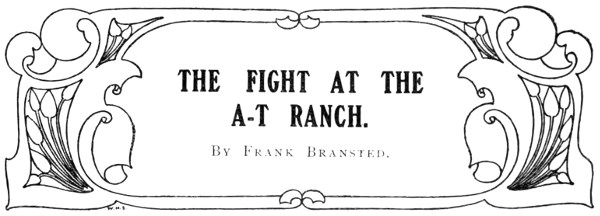
The story of one of the most sanguinary “cattle wars” the West has ever known. The long-standing feud between the big cattlemen and the homesteaders, whose advent means the doom of the open range, led in this instance to a most extraordinary state of affairs, in which one side raised a regiment of ruffians to wipe out their enemies, while the other retorted by laying siege to their opponents’ head-quarters with rifle-pits and dynamite bombs! “The narrative is absolutely true,” writes the author, “only the names of the cattlemen concerned being changed.”

With a rattle of wheels over stones and frozen ground the buckboard swung round the bend and down across the muddy creek flats. The driver, Ranger Jones, one of the pioneers of Northern Wyoming, drew off his leather glove and rubbed his chilled hands on the buffalo robe to restore circulation. The sun was low in the west, and, after placing his hand on the heavy Colt that lay reassuringly beside him on the seat, he drew on his glove and spoke sharply to his team. A moment later they struck the bridge, and after clattering across the shaky wooden structure began the ascent of the south bank.
Scarcely had the buckboard left the bridge than from underneath it was thrust the barrel of a rifle. A sharp report rang out, followed by two others in rapid succession, and with his fingers groping vainly for his pistol Ranger Jones, the best rider and one of the bravest men of the Big Horn country, fell forward off the seat. Shot three times through the back, he was dead before his head struck the dashboard.
Jones’s death was but one of the brutal murders that about 1890 horrified the settlers east of the Big Horns and north of the Powder River. This country, which had formerly belonged exclusively to the cattle kings, had of late years been invaded by homesteaders and other settlers, who had begun to stretch their hated wire fences along the creeks and around the water-holes on the alkali flats to the east. Early in the winter all the settlers in this district had received warnings that they had been tried by “a jury of their betters” and found guilty of cattle rustling, and warning them that if they did not leave the country within thirty days their lives would be forfeited. These warnings were signed by the “White Cap Protective League.” The letters, which were known to be the work of the Cattle Association, or of some of its members, were for the most part disregarded.
The death of Ranger Jones fanned to a white heat the flames of rage that had been aroused by the previous murders, and a meeting was called at which Frank Benton, an ex-sheriff of Johnson County, was by common assent adjudged the person guilty of Ranger Jones’s death, and he was sentenced to die by the hand of the first of the settlers who had a chance to pot him. It was further agreed to discover, if possible, the ringleaders of the “White Caps,” and either to lynch them or drive them from the country. But the searchers were unable to find Benton, who, having heard of the plans laid for his taking-off, held a hasty consultation with Dr. Hays and Ben Williams, two of the leading cattlemen, and then boarded a train at Cheyenne and fled to Texas. Once there, he began scouring the country for “bad men.” Any man who had some other man’s blood on his hands found favour with Benton, and at the little town of Utica, where he made his head-quarters, he soon gathered together as choice a collection of “toughs” and murderers as could be found in any one hundred square miles on earth. These 510 men he hired to go with him to Wyoming and kill “Rustlers.” They signed a contract to stay with him for six months and were to receive fifty dollars apiece per month, and one hundred dollars were to be divided amongst the bunch for every man that they killed.
Late in April the band, consisting of sixty men, with Benton and a negro cook, boarded a train on the M. K. T. for the north. At Omaha, where they outfitted, they bought up practically all the ammunition in the town, as well as large quantities of provisions, bedding, tents, and other articles. They were joined here by Dr. Hays, who, after expressing himself as being well pleased with the appearance of the men selected, informed Benton that horses and supply wagons awaited him at Douglas, Wyoming. Before parting from Benton he gave him a revised list of some forty men of whom the cattle kings were desirous of ridding the country.
On Thursday, the 27th of April, the little town of Douglas was surprised and terrified by the appearance of sixty armed men who alighted from the Elkhorn train. The strangers paid but little attention to the townspeople, but hastened out to the E——Y ranch near the town, where their horses awaited them. Here they pitched camp for the night, and at daylight the next morning set off for the north-west, camping that night on the banks of Wild Horse Creek, some forty miles from Douglas. By Saturday night they were within sight of the Powder River, but were halted by Benton in the hills south of the river until it became dark, when they advanced, and, after fording the river, camped in a large cottonwood grove for the night. At two o’clock in the morning they were awakened, and followed their leader on foot for a couple of miles, when, just as day was breaking, they came to a little log-house near the banks of the Powder River. The building was on the claim of a small rancher named Ben Champion, and stopping with him at the time was another rancher named Billy Ray. Both men had received White Cap notices, and were living together for greater security.
Swiftly the men under Benton—who were known thereafter as White Caps—surrounded the ranch and lay concealed, awaiting the appearance of the hapless ranchers, who were to be their first victims. About five o’clock the door opened and Billy Ray stepped out.
“Get breakfast, Ben, and I will look after the horses,” he called out, cheerily, as he started for the log stable near the river bank.
Half-way there he paused and partly turned as if to retrace his steps. Thinking that they had been discovered in their hiding-place, Benton gave the order to fire, and poor Ray fell riddled with bullets.
“Now for the house, boys! Get the other one!” yelled Benton, and he headed a rush at the log building. The rush, however, ended in a wild stampede for shelter, for, regardless of the bullets smashing into the logs around him, Ben Champion appeared in the doorway with a six-shooter in either hand streaming fire and lead. One White Cap lay dead close beside the body of Billy Ray, and another one was painfully trying to drag himself into shelter with a broken leg trailing behind him.
From all sides a perfect hail of bullets was now poured into the log cabin, and but for the seasoned logs stopping a large proportion of the bullets no man could have lived inside for five minutes. As it was, bullets were constantly getting in through the chinks and crevices between the timbers. After the first charge failed, Champion, knowing that it was only a question of time before the White Caps killed him, sat down at his table and wrote a letter of farewell to his mother and sisters in far-away Vermont. He also, from time to time, wrote down short comments on the battle in progress. This blood-stained diary, which is now the property of the State Historical Society at Cheyenne, reads as follows:—
“Six o’clock.—It is just about an hour since they killed Billy, and, while bullets have been buzzing around in here pretty lively ever since, I am still untouched. I just wrote a letter to my mother.
“Seven o’clock.—As I was writing in this book before a bullet smashed up my left arm pretty badly, but I have it tied up and the bleeding stopped. Now I have got my revenge, too, for as I shifted from one end of the shack to the other I caught one fellow trying to run up here with a bunch of burning brush in his hands. He’ll not need brush to keep warm where he is now.
“Nine o’clock.—Still on deck, but getting kind of wobbly on the pins from loss of blood. Have been hit four times.
“Nine-forty a.m.—Well, good-bye everyone. They set a load of hay on fire and let it run down the hill against the side of the shack and the roof is all ablaze. I am waiting till the smoke settles over the main bunch a little thicker and then I will try to get in amongst them with my six-shooter, if I can, before they down me. Good-bye.—Ben.”
A whiff of wind from the north blew a heavy cloud of smoke low down over a bunch of White Caps lying in the shelter of a small creek some fifty yards from the cabin, and when it lifted 511 Ben Champion stood amongst them with a smoking revolver in his hand. A moment later he lay dead on the sand with over forty bullets through his body, but in that short space of time his deadly Colt had sent two more of the White Caps to their last reckoning.
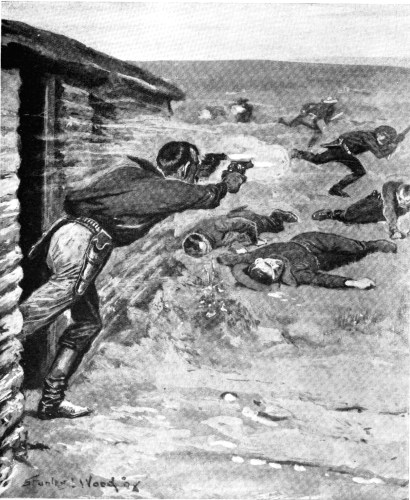
“BEN CHAMPION APPEARED IN THE DOORWAY WITH A SIX-SHOOTER IN EITHER HAND STREAMING FIRE AND LEAD.”
While the White Caps were burying their dead, the horses and wagons were brought up and the outfit cooked their breakfast on the embers of the burning logs. Then, placing their wounded comrade in a supply wagon, they moved up the river in search of more victims. Surrounding two ranches, they crept up to them, only to find them vacant; they were too late, for their firing had attracted the attention of a rancher named Whitmore as he stopped to water his horse at the ford a mile below Champion’s ranch, and he had ridden up close enough to see the finish of the unequal fight, and had then spurred his horse up the river, 512 warning the settlers that the much-talked-of White Cap invasion had begun. The news spread over the country like wildfire, and, instead of fleeing from the danger-zone, the ranchers and cow-punchers buckled on their guns and headed for the scene of the fight. They started in ones and twos, but as they got closer in they began to gather in bunches of ten or twelve, all spoiling for a fight, if there was a prospect of avenging the death of their comrades.
In vain did Benton and his regiment try to close with any of these bunches; their horses were fresh, and they would run as long as chased by the White Caps; but once let the chase cease and they were back again, waiting for a chance to sneak up under cover of a hill or ravine to pour in a volley of bullets and again take to their heels if pursued. By three o’clock there were fully fifty men harassing the White Caps, and Benton decided to make for the shelter of the A—T ranch on Crazy Woman Creek, some fifty miles to the north-west. The first few miles was an orderly march, but the “Rustlers,” as the other side called them, were constantly increasing in numbers and pressing in closer behind. At five o’clock Benton gave his men the order to strap their ammunition on to the backs of the wagon horses and to abandon the wagons and supplies. From an orderly march their ride had now degenerated into a wild dash over the barren sage brush flats for refuge in the far-off ranch. Darkness alone saved them from extermination, and as it was, only forty-five powder-stained, worn-out White Caps rode up to Dr. Hays’s A—T ranch just as the sun rose on Monday morning.
After a hasty breakfast they set to work barricading the windows and doors of the stout log-house, as well as building a fort of stones around the well and cutting a trench from there to the house and the barn, a large two-storey frame structure which was rendered almost bullet-proof by lining it with bales of hay. Noon found them well prepared for a siege—found, too, close on three hundred Rustlers watching them from the surrounding hill-tops.
A long-range fusillade was kept up all day on Monday without effect on either side, and Monday night also passed uneventfully. Tuesday found the Rustlers entrenched in rifle-pits and stone forts within easy range on all sides of the ranch buildings. They had received large quantities of ammunition from Buffalo, which was only fifteen miles north of them, and had also brought up the tents and provisions abandoned by the White Caps near the Powder River. All day long the numbers of the Rustlers kept constantly increasing, till by nightfall fully five hundred men were pouring lead into the buildings and forts on the A—T. The firing kept up all Tuesday night, and under cover of the darkness the Rustlers advanced their rifle-pits to within two hundred yards of the ranch buildings. Seated on the top of a pile of earth and thinking himself safe in the darkness, young Tommy Arnold, of the Rustlers, fired a shot at the dark mass of buildings in the valley. Quick as lightning came an answering shot, fired at the flash of his gun, and young Arnold pitched forward, shot through the breast. Angered at the death of Arnold, several Rustlers digging a pit near him seized their rifles and poured in a volley of bullets at the spot where they had seen the gun-flash in the valley. With five further shots, however, the hidden marksman wounded two of them and threw dirt into the faces of a couple more, so that they were soon glad to quit the unequal duel. The man who did this shooting was afterwards discovered to be an ex-United States marshal from Oklahoma, named Smith. He was wounded on the last day of the fight, and afterwards died from his wounds.
On Tuesday afternoon Bob Snelling and John Pettybone, two of the richest ranchers among the Rustlers, rode over to Fort McKinney and offered the commander there two thousand dollars for the use of his cannon for one day. Of course, the commandant had to refuse, and he further took warning, so that that night, when a party of Rustlers, led by Tom Ray, arrived with the intention of stealing the gun they found it had been wheeled into the guard-house and a sentry stationed over it. Not to be daunted by these failures to secure a big gun, old Jack Flagett, a veteran of the Civil War, essayed to make one. He secured a team and drove to Buffalo, returning with a number of lengths of iron piping. He first placed a three-inch pipe around a two-inch and pounded the intervening space full of wet sand, repeating the performance with a four and six inch pipe. The whole affair was then chained securely to the stump of a tree on the top of a hill about five hundred yards from the A—T buildings. Next the amateur artillerist rammed in a couple of pounds of powder, and, for a projectile, put in five pounds of dynamite. Then he called out to some near-by Rustlers: “Come over, boys, and watch me blow that White Cap outfit to Hades!”
He was about to set a match to the touch-hole when one Fred Johnston interfered.
“Better set it off with a fuse, Jack,” he said.
“Well, to satisfy you, I will,” replied Flagett; “but there is no danger, as this gun can stand anything.”
A six-inch fuse was then placed in the gun 513 and lighted, and everyone retired into an adjacent pit, dragging old Jack with them. For a moment all was silence; then came an awful ear-splitting report, and a cloud of dust settled over the rifle pit. When it cleared away all trace of Flagett’s cannon and the stump as well had disappeared. Not a piece of either was ever found, though Hall Smith, who was in charge of the cook-camp half a mile farther back, swore that he heard a piece of pipe whistle over his head a few seconds after the explosion.
Wednesday night passed very quietly, the White Caps being short of ammunition, and the Rustlers busy in the construction of a movable fort on wheels. They placed three mountain wagons in the shape of the letter V, and built a framework of poles between them. This frame they covered with bales of hay and suspended other bales from it clear to the ground. There was room within this curious fort for twenty men, and loopholes were left in the front sides for firing through as they slowly propelled it forward. It was the intention to roll this up within throwing distance of the ranch buildings, and then to demolish them with dynamite bombs.
On Thursday morning, just at sunrise, the ponderous engine began to crawl forward on its half-mile journey. Slowly but surely it crept along, till at ten o’clock it was less than three hundred yards from the ranch. In vain did the White Caps concentrate their fire on the moving fortress; their bullets were absorbed by the hay as water by a sponge. Inside the beleaguered ranch all was excitement and terror. Only too well did they know the fate that awaited them unless the grim monster advancing on them was checked. Benton called his boys together. “Boys, we must stop that fort or die like rats in a trap,” he said. “I want twenty men to follow me. Each will take a torch in one hand and his six-shooter in the other, and I promise one thousand dollars to the first man to fire the hay walls of the fort.”
The moving fort was now less than a hundred yards from the house, and the furious fire from the hills and pits that had covered its advance died down as the Rustlers lay, with their loaded rifles silent, waiting for some move on the part of the White Caps.
Within the ranch-house all was quiet. The twenty men selected for the dash stood with their right hands clenched around the butts of their heavy Colts and their lefts grasping kerosene-soaked torches. All eyes were fixed on their leader, who stood next to big Ben Williams, who was noiselessly removing the bars from the door. “Ready, boys!” came in clear, low tones from Benton as the last bar was lifted from its socket. Every man braced himself for the leap—ready, in fact, anxious, to have the dreadful suspense at an end, though each well knew that the opening of the door would be a signal for five hundred rifles to sweep the space between the house and the fort with a perfect hail of lead. Quickly the door swung open, and Benton leaped out. His eyes swept the surrounding hills; then he turned and tried to leap back into the protection of the log walls again. But all in vain! Quicker than thought came a flash of fire from a loophole in the fort, and Benton fell in the doorway with a bullet from Tom Champion’s rifle through his lungs.
“Keep back, boys!” he gasped. “Stay inside. You’re saved—the troops are coming.” They dragged him in, but these were his last words; the heavy hand of the avenging angel had fallen on him, and he had gone for a final reckoning.
“To the loopholes, boys!” shouted Williams, who had now taken command. “Shoot as you never shot before. If we can hold them in check for five minutes we are saved.”
From loopholes and cracks thirty-five rifles concentrated their fire on the hay fort, and the furious storm of lead caused Champion and the twenty men behind the bales to lie low and hug the ground. They knew that the fire could not long be sustained at that rate, and that when it slackened they could advance with fewer casualties. Glancing from a loophole to the north, Tom Champion saw two lines of brown-coated men, riding furiously in the midst of a cloud of dust, sweep over the hills less than a mile away. “Boys, the troops are coming!” he shouted. “Quick! light a fuse and try a throw from here.”
Hastily the bomb was prepared and thrown. The five-pound parcel of dynamite circled through the air and fell only ten feet short of the wall. For an instant there was silence; then came the explosion, and for a few minutes all was hid in a blinding cloud of dust. When it settled it revealed a gaping hole in the side of the house and the dim forms of men inside striving desperately to replace the dislocated logs.
“To the loopholes, boys! Pick them off!” cried Champion, but before a shot could be fired, between them and the house swept a line of cavalry, and the fight at the A—-T had passed into history.
Clothed in the uniform and authority of the United States army, fifty men from the Thirteenth Cavalry robbed five hundred raging Rustlers of their prey. No true American can fire on the army uniform, and cursing and furious, but powerless to interfere, the Rustlers could only stand by and watch thirty-five men—all 514 that were left of the invaders—come forth and surrender themselves to Captain Watterson and his men, to be transported to Cheyenne for trial for the murder of Ray, Champion, and others. They were ultimately released without the formality of a trial after some of the moneyed cattle kings had conferred with the State officials.
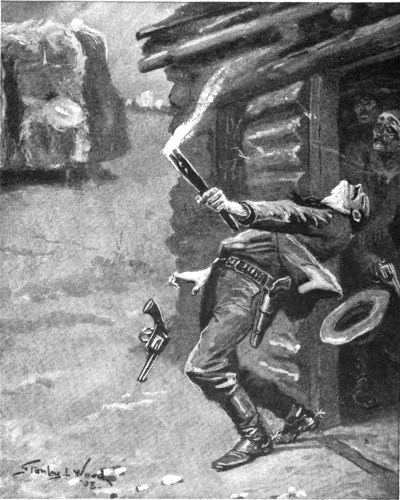
“BENTON FELL IN THE DOORWAY WITH A BULLET FROM TOM CHAMPION’S RIFLE THROUGH HIS LUNGS.”
Dr. Hays, Ben Williams, and other of the leading cattlemen fled from the country, never to return. Their buildings were burned, their horses and cattle shot on sight by the Rustlers, while their calves bore the brand of the first man to see them. Many a wealthy rancher in that district to-day owes his start to the calves he gathered up when the big outfits went to pieces.
So ended one of the most sanguinary cattle wars that the West has ever witnessed. All that remains to-day to recall it is a group of bullet-scarred buildings, surrounded by weed-grown rifle-pits, some two hours’ ride south-east of Buffalo, near the junction of Muddy Creek with the north fork of the Crazy Woman. 515
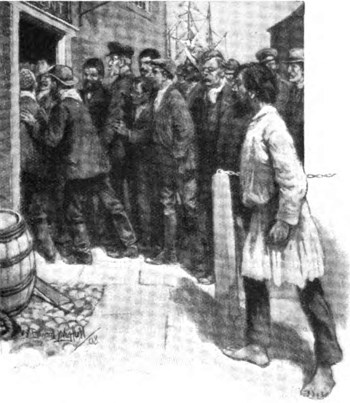
For one wishing to study the ways of the lowest dregs of this earth, I would advise him to give the slums of London a rest, and watch the throngs who besiege the offices of the agents who undertake to supply the cattlemen with help at Montreal. German and Russian Jews, Dukhobhors, Italians, negroes, Dr. Barnardo boys, homesick for their beloved slums; broken-down “sharks” and “confidence men” from the large cities of the States; one-time moneyed youths from the larger English towns, who have run through the capital given them to start in business, and are returning on the chance of getting more. All bustling and hustling each other after the same prize—a free passage to London, the home, and often the grave, of the desperate.—“THE CAPTAIN.”
By the average individual (unless he happens to be a salmon-fisher) Iceland is imagined to be a place somewhere within the region of the Arctic Circle and to be a land of eternal winter. The fishing enthusiast knows it only as a paradise of his craft and values it accordingly. Some tourists visit the island for a week or so in summer, and get as far as Thingvellir, or if they are not too saddle-sore they may see Geysir. But only a very select few have travelled for weeks on the hardy little ponies and known to the full the exceeding delight of day after day spent in the wonderful Icelandic air and of riding through the green valleys and fording the numberless rivers and streams of Iceland. To those who can ride and are keen on an open-air life and who are lovers of scenery the island should appeal, and this should apply even more so to those tired of the ways of cities, for there are no railways in Iceland, no motors, and there were until very recently no telegraphs.—“WOMAN’S LIFE.”
On the Trans-Siberian Railway not long ago some train-wreckers, anticipating the Continental express, had been busily engaged for some hours tearing up the permanent way. But, in the meantime, so heavy a fall of snow had occurred that the mail had been completely blocked some few miles before reaching the work of destruction. In this way the robbers were defeated of their prey, and the gangs of workmen who afterwards went out to clear the line discovered the damage on digging away the snow.—“TIT-BITS.”
In no other European country do sports occupy so large a place in women’s lives as they do in Sweden. This is especially the case in winter, when traffic and social intercourse are hindered by the snow and, but for outdoor games and exercises, life in the great castles and country estates would be monotonous and dull for the women of the upper classes. This is the time, however, when the Swedish ladies most enjoy themselves, for they pass their days in skating, skiing, tobogganing, coasting, and in training for the races which take place at Stockholm and in most of the more populated parts of the country.—“THE LADIES’ FIELD.”
The “Mengeleusha,” or “slippery place,” near Kuala Kangsar, Perak, Federated Malay States, is a solid piece of granite, about seventy or eighty feet long, standing in a stream of water and forming a sort of waterfall. The water flowing down this rock makes it as slippery as glass, and the amusement is to slide down the rock and splash into the pool beneath. This snapshot shows an Englishman half-way down the slide.—“THE STRAND MAGAZINE.”
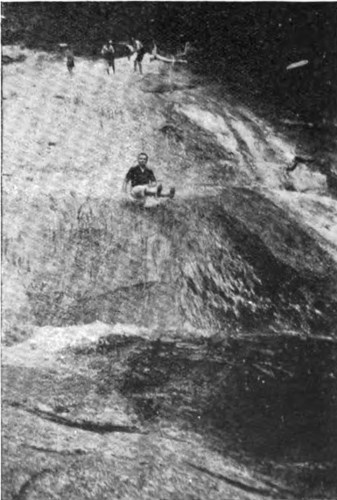 516
516

Our first photograph represents what must have been a battle-royal, and one which ended fatally for all concerned. It took place during the night, in the back yard of a house in Central Queensland, Australia, and the combatants were all found dead in the morning exactly as seen in the photograph. It is supposed that the snake must have bitten the kitten, and the mother cat, coming to its rescue, fought the snake and broke its back, but not before she had been fatally bitten herself. Cats are well known to be very clever at breaking snakes’ backs with their claws.
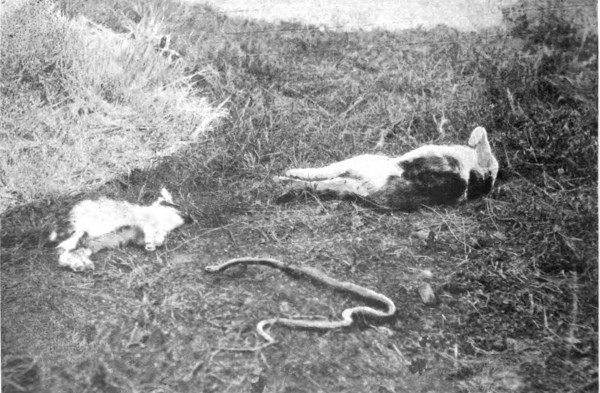
A BATTLE ROYAL WHICH ENDED FATALLY FOR ALL CONCERNED—THE SNAKE KILLED THE KITTEN, AND THE MOTHER, COMING TO THE RESCUE, KILLED THE SERPENT, BUT SUCCUMBED HERSELF TO THE SNAKE’S BITE.
From a Photograph.
The top snapshot on the next page was taken during a tramp through the jungly district around Sourabaya, a small town in Java. The picture shows a Javanese woman washing her child under a falling stream of water. Evidently the youngster is not enjoying the performance, and evinces his disapproval of the proceedings by kicking out in all directions and struggling vigorously. As a result of these contortions the outline of his body in the picture is rather obscure. It is interesting to note how the water has been brought to the rudely-constructed circle of masonry which serves as a reservoir. Having no system of pipes to facilitate the distribution of water, the natives fall back on Nature to assist them in this direction. They cut down betelnut trees, split them in half from top to bottom, and scoop out the inside substance, thus making 517 a series of cylindrical troughs. These are dried in the sun, after which a number of them, joined end to end and placed at a gentle slope, will convey water from any natural source to within convenient distance of a village or group of houses. The end of one of these artificial water-courses is seen in the picture.
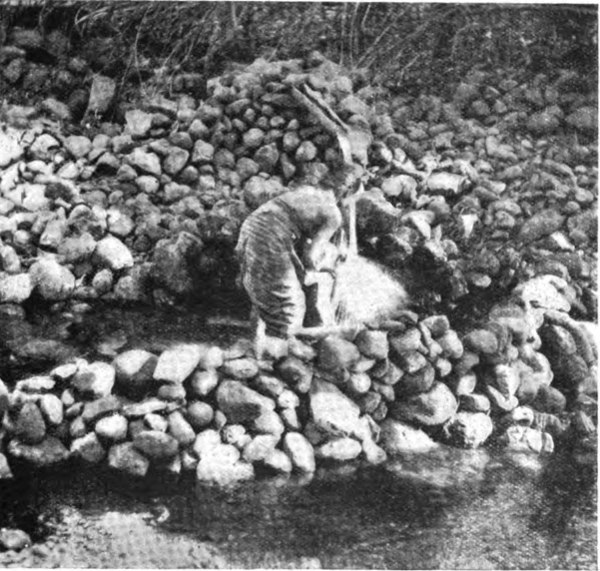
“YOU DIRTY BOY”—A JAVANESE MOTHER WASHING HER CHILD IN A “HOME-MADE AQUEDUCT.”
From a Photograph.
Here is a curious little snapshot from Java. The ancient cannon seen in the photograph is situated near the railway station at Batavia, the capital of the island, and is believed by the natives to possess the peculiar power—particularly strange in the case of so incongruous an object as a cannon—of enabling childless married people to raise a family. In pursuance of this strange belief many offerings are placed by the superstitious near the cannon; three are seen in the foreground of the photograph. Another legend which attaches to this particular gun is to the effect that when it and another piece of ordnance, which is also situated somewhere in the island, are brought together, the Javanese will become a great and independent nation.
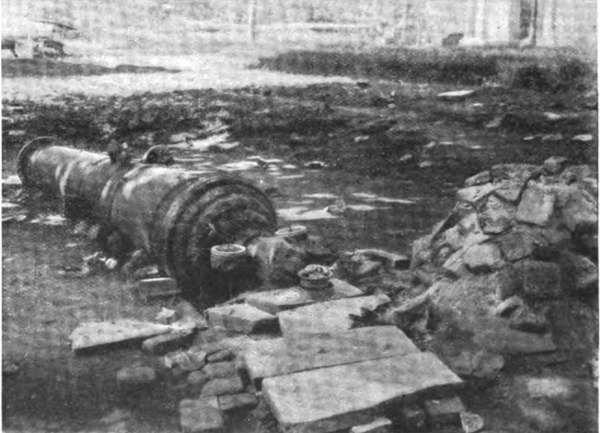
AN ANCIENT CANNON TO WHICH PEOPLE MAKE OFFERINGS IN THE BELIEF THAT IT ASSIST THEM TO RAISE A FAMILY.
From a Photograph.
In the eastern half of Bavaria, on the borders of Bohemia, lies the so-called Bavarian Forest. This part of the country, although it boasts beautiful scenery, is seldom visited by tourists, probably for the reason that the charms of the region are little known even in Germany. This part of Bavaria has been in many ways untouched by civilization, and owing 518 to its seclusion from the outer world some very strange customs are still in vogue, strongly reminding one of the Middle Ages. One of these strange customs, strictly observed by the population, is the way in which they keep alive the memory of their dead by the erection of what are called “totenbretter,” or “death-boards.” These are wooden planks cut in the shape of tombstones and roughly painted. Sometimes they bear also the image of a saint. They are erected—often in a row of thirty and more—on the roadside, in fields and meadows, near chapels and crucifixes, in the village streets—in short, everywhere; they are even nailed to houses and barns. They do not mark burial-places, as might be supposed. As soon as a person has died the corpse is put on a board, and there it lies in state until it is put into the coffin shortly before the funeral. These boards, then, are the so-called “death-boards,” and after the funeral they are cut into a suitable shape, and decorated with an inscription containing the name of the deceased, his age, and, in most cases, some lines of poetry. These short poems, which are, of course, meant in sober earnest, are occasionally very amusing. The boards are then stuck somewhere near the road, or in the fields, where they sometimes accumulate to an alarming number. In the poorer districts these boards are not always cut into shape and painted, but are simply deposited just as they are at the foot of some crucifix, where they remain untouched until they moulder away. It must be admitted that the custom, though interesting, seems open to objection from a hygienic point of view, nor is it very exhilarating for the tourist to be reminded of death wherever he may turn.
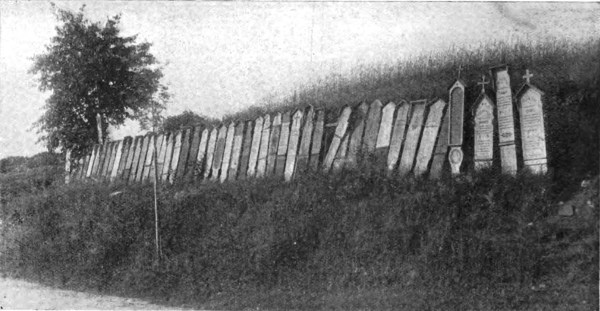
BAVARIAN “DEATH-BOARDS”—THEY DO NOT MARK BURIAL-PLACES, AND ARE TO BE FOUND IN ALL SORTS OF ODD SITUATIONS.
From a Photo. by Kester, Berlin.
This wonderful fungus, found in the Garo Hills in Assam, has been supplied by Nature with a delicate network of fine translucent material, which seems to be intended to protect the stalk from the attacks of insect life. The head of the plant, on the other hand, is covered with some substance which attracts minute flies in great numbers. For further defence Nature has given this weird fungus the power of spreading around it a most offensive smell.
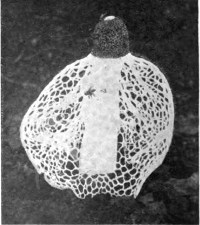
AN EXTRAORDINARY FUNGUS—IT GROWS IN A NIGHT AND BY MID-DAY
HAS ENTIRELY WITHERED.
From a Photograph.
519
The beautiful white tracery grows up in the night, commences to droop as soon as the first rays of the sun reach it, and by midday has entirely withered away.
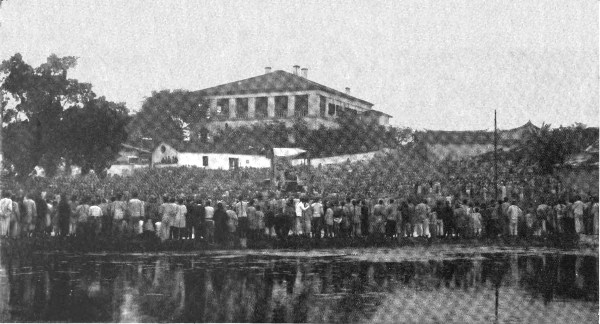
IN SOME PARTS OF CHINA IT IS STILL CONSIDERED A VERY MERITORIOUS ACT FOR A WIDOW TO COMMIT SUICIDE AFTER THE DEATH OF HER HUSBAND—THIS PHOTOGRAPH SHOWS A WIDOW ABOUT TO MAKE AWAY WITH HERSELF IN THE PRESENCE OF AN IMMENSE AND ADMIRING CROWD.
Old customs die very hard in China, and in several parts of the Celestial Empire it is still considered a high act of virtue for a woman to commit suicide after the death of her husband. According to the law the proceeding is actually legal in some provinces, and such is the state of public opinion that in districts where it is officially prohibited the authorities rarely interfere. The striking photograph which we reproduce on this page shows one of these extraordinary voluntary sacrifices about to take place, with the widow herself, clad in white—the Chinese mourning colour—the gallows erected for the occasion, and the immense crowd gathered to witness the gruesome spectacle. 520
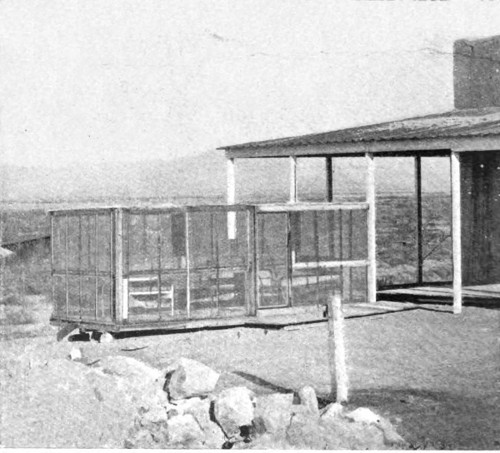
AN ARIZONA BEDROOM—SO HOT IS THE CLIMATE, AND SO NUMEROUS THE INSECTS AND REPTILIAN
PESTS, THAT THE DWELLERS ON THE VERGE OF THE DESERT FIND IT NECESSARY TO SLEEP IN WIRE CAGES SIMILAR TO THAT HERE SHOWN.
From a Photograph.
The desert bordering on the Colorado River, in Southern Arizona, is probably the hottest part of the United States in summer, where the condition humorously generalized at “a hundred and forty in the shade, and no shade,” prevails from June until September. The intense heat of the sun-baked houses then makes them unbearable even at night to the average sleeper, and open-air sleeping apartments are accordingly needful for comfort. The photograph shows one of these airy adjuncts to a desert home. The wire screen that encloses the little room, like a bird-cage, serves to keep out pestiferous insects, snakes, and other vermin.
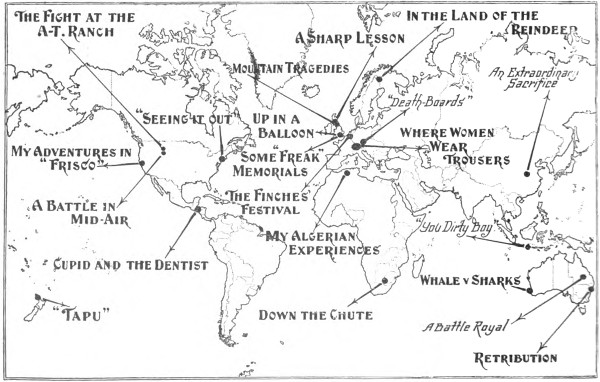
THE MAP-CONTENTS OF “THE WIDE WORLD MAGAZINE,” WHICH SHOWS AT A GLANCE THE LOCALITY OF EACH ARTICLE AND NARRATIVE OF ADVENTURE IN THIS NUMBER.
Table of Contents added.
Inconsistent spelling and hyphenation are as in the original.
End of the Project Gutenberg EBook of The Wide World Magazine - Vol. 22, No.
131, February 1909, by Various
*** END OF THIS PROJECT GUTENBERG EBOOK WIDE WORLD MAGAZINE, FEBRUARY 1909 ***
***** This file should be named 51061-h.htm or 51061-h.zip *****
This and all associated files of various formats will be found in:
http://www.gutenberg.org/5/1/0/6/51061/
Produced by Victorian/Edwardian Pictorial Magazines,
Jonathan Ingram, Wayne Hammond and the Online Distributed
Proofreading Team at http://www.pgdp.net
Updated editions will replace the previous one--the old editions will
be renamed.
Creating the works from print editions not protected by U.S. copyright
law means that no one owns a United States copyright in these works,
so the Foundation (and you!) can copy and distribute it in the United
States without permission and without paying copyright
royalties. Special rules, set forth in the General Terms of Use part
of this license, apply to copying and distributing Project
Gutenberg-tm electronic works to protect the PROJECT GUTENBERG-tm
concept and trademark. Project Gutenberg is a registered trademark,
and may not be used if you charge for the eBooks, unless you receive
specific permission. If you do not charge anything for copies of this
eBook, complying with the rules is very easy. You may use this eBook
for nearly any purpose such as creation of derivative works, reports,
performances and research. They may be modified and printed and given
away--you may do practically ANYTHING in the United States with eBooks
not protected by U.S. copyright law. Redistribution is subject to the
trademark license, especially commercial redistribution.
START: FULL LICENSE
THE FULL PROJECT GUTENBERG LICENSE
PLEASE READ THIS BEFORE YOU DISTRIBUTE OR USE THIS WORK
To protect the Project Gutenberg-tm mission of promoting the free
distribution of electronic works, by using or distributing this work
(or any other work associated in any way with the phrase "Project
Gutenberg"), you agree to comply with all the terms of the Full
Project Gutenberg-tm License available with this file or online at
www.gutenberg.org/license.
Section 1. General Terms of Use and Redistributing Project
Gutenberg-tm electronic works
1.A. By reading or using any part of this Project Gutenberg-tm
electronic work, you indicate that you have read, understand, agree to
and accept all the terms of this license and intellectual property
(trademark/copyright) agreement. If you do not agree to abide by all
the terms of this agreement, you must cease using and return or
destroy all copies of Project Gutenberg-tm electronic works in your
possession. If you paid a fee for obtaining a copy of or access to a
Project Gutenberg-tm electronic work and you do not agree to be bound
by the terms of this agreement, you may obtain a refund from the
person or entity to whom you paid the fee as set forth in paragraph
1.E.8.
1.B. "Project Gutenberg" is a registered trademark. It may only be
used on or associated in any way with an electronic work by people who
agree to be bound by the terms of this agreement. There are a few
things that you can do with most Project Gutenberg-tm electronic works
even without complying with the full terms of this agreement. See
paragraph 1.C below. There are a lot of things you can do with Project
Gutenberg-tm electronic works if you follow the terms of this
agreement and help preserve free future access to Project Gutenberg-tm
electronic works. See paragraph 1.E below.
1.C. The Project Gutenberg Literary Archive Foundation ("the
Foundation" or PGLAF), owns a compilation copyright in the collection
of Project Gutenberg-tm electronic works. Nearly all the individual
works in the collection are in the public domain in the United
States. If an individual work is unprotected by copyright law in the
United States and you are located in the United States, we do not
claim a right to prevent you from copying, distributing, performing,
displaying or creating derivative works based on the work as long as
all references to Project Gutenberg are removed. Of course, we hope
that you will support the Project Gutenberg-tm mission of promoting
free access to electronic works by freely sharing Project Gutenberg-tm
works in compliance with the terms of this agreement for keeping the
Project Gutenberg-tm name associated with the work. You can easily
comply with the terms of this agreement by keeping this work in the
same format with its attached full Project Gutenberg-tm License when
you share it without charge with others.
1.D. The copyright laws of the place where you are located also govern
what you can do with this work. Copyright laws in most countries are
in a constant state of change. If you are outside the United States,
check the laws of your country in addition to the terms of this
agreement before downloading, copying, displaying, performing,
distributing or creating derivative works based on this work or any
other Project Gutenberg-tm work. The Foundation makes no
representations concerning the copyright status of any work in any
country outside the United States.
1.E. Unless you have removed all references to Project Gutenberg:
1.E.1. The following sentence, with active links to, or other
immediate access to, the full Project Gutenberg-tm License must appear
prominently whenever any copy of a Project Gutenberg-tm work (any work
on which the phrase "Project Gutenberg" appears, or with which the
phrase "Project Gutenberg" is associated) is accessed, displayed,
performed, viewed, copied or distributed:
This eBook is for the use of anyone anywhere in the United States and
most other parts of the world at no cost and with almost no
restrictions whatsoever. You may copy it, give it away or re-use it
under the terms of the Project Gutenberg License included with this
eBook or online at www.gutenberg.org. If you are not located in the
United States, you'll have to check the laws of the country where you
are located before using this ebook.
1.E.2. If an individual Project Gutenberg-tm electronic work is
derived from texts not protected by U.S. copyright law (does not
contain a notice indicating that it is posted with permission of the
copyright holder), the work can be copied and distributed to anyone in
the United States without paying any fees or charges. If you are
redistributing or providing access to a work with the phrase "Project
Gutenberg" associated with or appearing on the work, you must comply
either with the requirements of paragraphs 1.E.1 through 1.E.7 or
obtain permission for the use of the work and the Project Gutenberg-tm
trademark as set forth in paragraphs 1.E.8 or 1.E.9.
1.E.3. If an individual Project Gutenberg-tm electronic work is posted
with the permission of the copyright holder, your use and distribution
must comply with both paragraphs 1.E.1 through 1.E.7 and any
additional terms imposed by the copyright holder. Additional terms
will be linked to the Project Gutenberg-tm License for all works
posted with the permission of the copyright holder found at the
beginning of this work.
1.E.4. Do not unlink or detach or remove the full Project Gutenberg-tm
License terms from this work, or any files containing a part of this
work or any other work associated with Project Gutenberg-tm.
1.E.5. Do not copy, display, perform, distribute or redistribute this
electronic work, or any part of this electronic work, without
prominently displaying the sentence set forth in paragraph 1.E.1 with
active links or immediate access to the full terms of the Project
Gutenberg-tm License.
1.E.6. You may convert to and distribute this work in any binary,
compressed, marked up, nonproprietary or proprietary form, including
any word processing or hypertext form. However, if you provide access
to or distribute copies of a Project Gutenberg-tm work in a format
other than "Plain Vanilla ASCII" or other format used in the official
version posted on the official Project Gutenberg-tm web site
(www.gutenberg.org), you must, at no additional cost, fee or expense
to the user, provide a copy, a means of exporting a copy, or a means
of obtaining a copy upon request, of the work in its original "Plain
Vanilla ASCII" or other form. Any alternate format must include the
full Project Gutenberg-tm License as specified in paragraph 1.E.1.
1.E.7. Do not charge a fee for access to, viewing, displaying,
performing, copying or distributing any Project Gutenberg-tm works
unless you comply with paragraph 1.E.8 or 1.E.9.
1.E.8. You may charge a reasonable fee for copies of or providing
access to or distributing Project Gutenberg-tm electronic works
provided that
* You pay a royalty fee of 20% of the gross profits you derive from
the use of Project Gutenberg-tm works calculated using the method
you already use to calculate your applicable taxes. The fee is owed
to the owner of the Project Gutenberg-tm trademark, but he has
agreed to donate royalties under this paragraph to the Project
Gutenberg Literary Archive Foundation. Royalty payments must be paid
within 60 days following each date on which you prepare (or are
legally required to prepare) your periodic tax returns. Royalty
payments should be clearly marked as such and sent to the Project
Gutenberg Literary Archive Foundation at the address specified in
Section 4, "Information about donations to the Project Gutenberg
Literary Archive Foundation."
* You provide a full refund of any money paid by a user who notifies
you in writing (or by e-mail) within 30 days of receipt that s/he
does not agree to the terms of the full Project Gutenberg-tm
License. You must require such a user to return or destroy all
copies of the works possessed in a physical medium and discontinue
all use of and all access to other copies of Project Gutenberg-tm
works.
* You provide, in accordance with paragraph 1.F.3, a full refund of
any money paid for a work or a replacement copy, if a defect in the
electronic work is discovered and reported to you within 90 days of
receipt of the work.
* You comply with all other terms of this agreement for free
distribution of Project Gutenberg-tm works.
1.E.9. If you wish to charge a fee or distribute a Project
Gutenberg-tm electronic work or group of works on different terms than
are set forth in this agreement, you must obtain permission in writing
from both the Project Gutenberg Literary Archive Foundation and The
Project Gutenberg Trademark LLC, the owner of the Project Gutenberg-tm
trademark. Contact the Foundation as set forth in Section 3 below.
1.F.
1.F.1. Project Gutenberg volunteers and employees expend considerable
effort to identify, do copyright research on, transcribe and proofread
works not protected by U.S. copyright law in creating the Project
Gutenberg-tm collection. Despite these efforts, Project Gutenberg-tm
electronic works, and the medium on which they may be stored, may
contain "Defects," such as, but not limited to, incomplete, inaccurate
or corrupt data, transcription errors, a copyright or other
intellectual property infringement, a defective or damaged disk or
other medium, a computer virus, or computer codes that damage or
cannot be read by your equipment.
1.F.2. LIMITED WARRANTY, DISCLAIMER OF DAMAGES - Except for the "Right
of Replacement or Refund" described in paragraph 1.F.3, the Project
Gutenberg Literary Archive Foundation, the owner of the Project
Gutenberg-tm trademark, and any other party distributing a Project
Gutenberg-tm electronic work under this agreement, disclaim all
liability to you for damages, costs and expenses, including legal
fees. YOU AGREE THAT YOU HAVE NO REMEDIES FOR NEGLIGENCE, STRICT
LIABILITY, BREACH OF WARRANTY OR BREACH OF CONTRACT EXCEPT THOSE
PROVIDED IN PARAGRAPH 1.F.3. YOU AGREE THAT THE FOUNDATION, THE
TRADEMARK OWNER, AND ANY DISTRIBUTOR UNDER THIS AGREEMENT WILL NOT BE
LIABLE TO YOU FOR ACTUAL, DIRECT, INDIRECT, CONSEQUENTIAL, PUNITIVE OR
INCIDENTAL DAMAGES EVEN IF YOU GIVE NOTICE OF THE POSSIBILITY OF SUCH
DAMAGE.
1.F.3. LIMITED RIGHT OF REPLACEMENT OR REFUND - If you discover a
defect in this electronic work within 90 days of receiving it, you can
receive a refund of the money (if any) you paid for it by sending a
written explanation to the person you received the work from. If you
received the work on a physical medium, you must return the medium
with your written explanation. The person or entity that provided you
with the defective work may elect to provide a replacement copy in
lieu of a refund. If you received the work electronically, the person
or entity providing it to you may choose to give you a second
opportunity to receive the work electronically in lieu of a refund. If
the second copy is also defective, you may demand a refund in writing
without further opportunities to fix the problem.
1.F.4. Except for the limited right of replacement or refund set forth
in paragraph 1.F.3, this work is provided to you 'AS-IS', WITH NO
OTHER WARRANTIES OF ANY KIND, EXPRESS OR IMPLIED, INCLUDING BUT NOT
LIMITED TO WARRANTIES OF MERCHANTABILITY OR FITNESS FOR ANY PURPOSE.
1.F.5. Some states do not allow disclaimers of certain implied
warranties or the exclusion or limitation of certain types of
damages. If any disclaimer or limitation set forth in this agreement
violates the law of the state applicable to this agreement, the
agreement shall be interpreted to make the maximum disclaimer or
limitation permitted by the applicable state law. The invalidity or
unenforceability of any provision of this agreement shall not void the
remaining provisions.
1.F.6. INDEMNITY - You agree to indemnify and hold the Foundation, the
trademark owner, any agent or employee of the Foundation, anyone
providing copies of Project Gutenberg-tm electronic works in
accordance with this agreement, and any volunteers associated with the
production, promotion and distribution of Project Gutenberg-tm
electronic works, harmless from all liability, costs and expenses,
including legal fees, that arise directly or indirectly from any of
the following which you do or cause to occur: (a) distribution of this
or any Project Gutenberg-tm work, (b) alteration, modification, or
additions or deletions to any Project Gutenberg-tm work, and (c) any
Defect you cause.
Section 2. Information about the Mission of Project Gutenberg-tm
Project Gutenberg-tm is synonymous with the free distribution of
electronic works in formats readable by the widest variety of
computers including obsolete, old, middle-aged and new computers. It
exists because of the efforts of hundreds of volunteers and donations
from people in all walks of life.
Volunteers and financial support to provide volunteers with the
assistance they need are critical to reaching Project Gutenberg-tm's
goals and ensuring that the Project Gutenberg-tm collection will
remain freely available for generations to come. In 2001, the Project
Gutenberg Literary Archive Foundation was created to provide a secure
and permanent future for Project Gutenberg-tm and future
generations. To learn more about the Project Gutenberg Literary
Archive Foundation and how your efforts and donations can help, see
Sections 3 and 4 and the Foundation information page at
www.gutenberg.org
Section 3. Information about the Project Gutenberg Literary Archive Foundation
The Project Gutenberg Literary Archive Foundation is a non profit
501(c)(3) educational corporation organized under the laws of the
state of Mississippi and granted tax exempt status by the Internal
Revenue Service. The Foundation's EIN or federal tax identification
number is 64-6221541. Contributions to the Project Gutenberg Literary
Archive Foundation are tax deductible to the full extent permitted by
U.S. federal laws and your state's laws.
The Foundation's principal office is in Fairbanks, Alaska, with the
mailing address: PO Box 750175, Fairbanks, AK 99775, but its
volunteers and employees are scattered throughout numerous
locations. Its business office is located at 809 North 1500 West, Salt
Lake City, UT 84116, (801) 596-1887. Email contact links and up to
date contact information can be found at the Foundation's web site and
official page at www.gutenberg.org/contact
For additional contact information:
Dr. Gregory B. Newby
Chief Executive and Director
gbnewby@pglaf.org
Section 4. Information about Donations to the Project Gutenberg
Literary Archive Foundation
Project Gutenberg-tm depends upon and cannot survive without wide
spread public support and donations to carry out its mission of
increasing the number of public domain and licensed works that can be
freely distributed in machine readable form accessible by the widest
array of equipment including outdated equipment. Many small donations
($1 to $5,000) are particularly important to maintaining tax exempt
status with the IRS.
The Foundation is committed to complying with the laws regulating
charities and charitable donations in all 50 states of the United
States. Compliance requirements are not uniform and it takes a
considerable effort, much paperwork and many fees to meet and keep up
with these requirements. We do not solicit donations in locations
where we have not received written confirmation of compliance. To SEND
DONATIONS or determine the status of compliance for any particular
state visit www.gutenberg.org/donate
While we cannot and do not solicit contributions from states where we
have not met the solicitation requirements, we know of no prohibition
against accepting unsolicited donations from donors in such states who
approach us with offers to donate.
International donations are gratefully accepted, but we cannot make
any statements concerning tax treatment of donations received from
outside the United States. U.S. laws alone swamp our small staff.
Please check the Project Gutenberg Web pages for current donation
methods and addresses. Donations are accepted in a number of other
ways including checks, online payments and credit card donations. To
donate, please visit: www.gutenberg.org/donate
Section 5. General Information About Project Gutenberg-tm electronic works.
Professor Michael S. Hart was the originator of the Project
Gutenberg-tm concept of a library of electronic works that could be
freely shared with anyone. For forty years, he produced and
distributed Project Gutenberg-tm eBooks with only a loose network of
volunteer support.
Project Gutenberg-tm eBooks are often created from several printed
editions, all of which are confirmed as not protected by copyright in
the U.S. unless a copyright notice is included. Thus, we do not
necessarily keep eBooks in compliance with any particular paper
edition.
Most people start at our Web site which has the main PG search
facility: www.gutenberg.org
This Web site includes information about Project Gutenberg-tm,
including how to make donations to the Project Gutenberg Literary
Archive Foundation, how to help produce our new eBooks, and how to
subscribe to our email newsletter to hear about new eBooks.